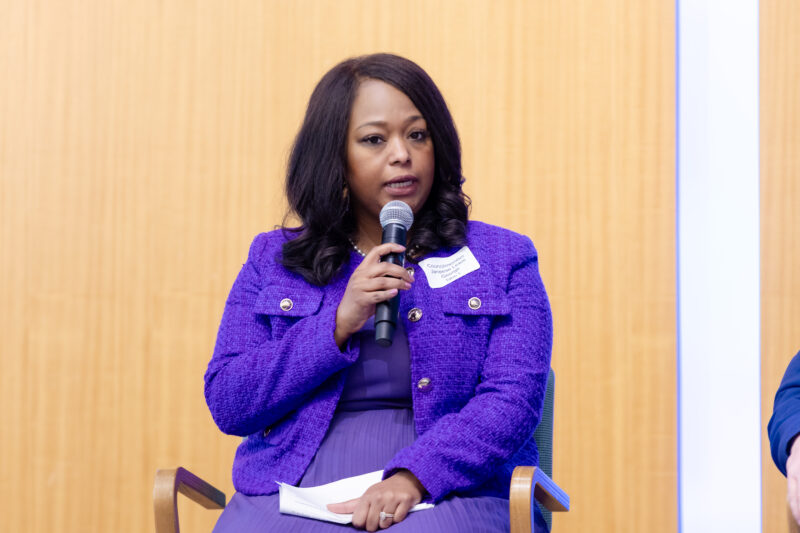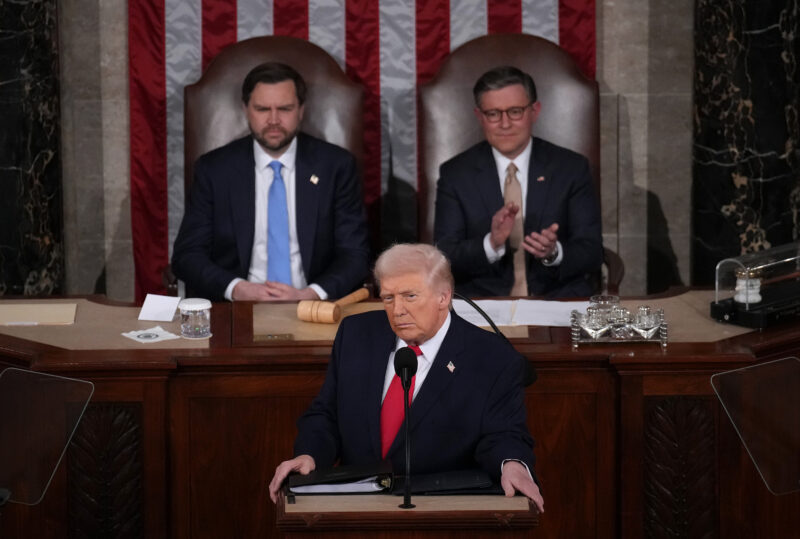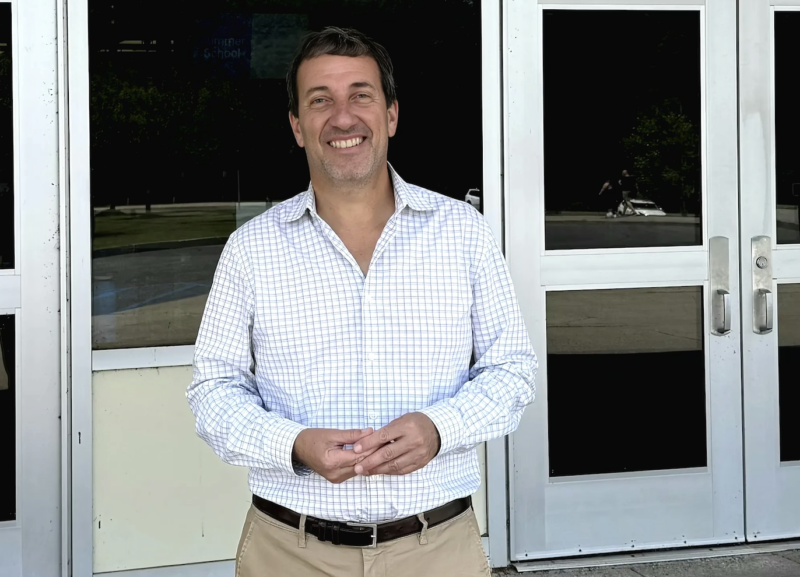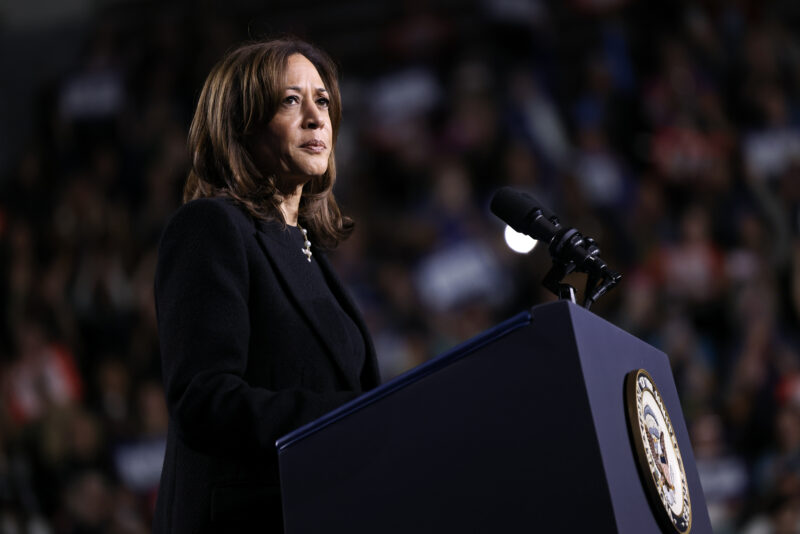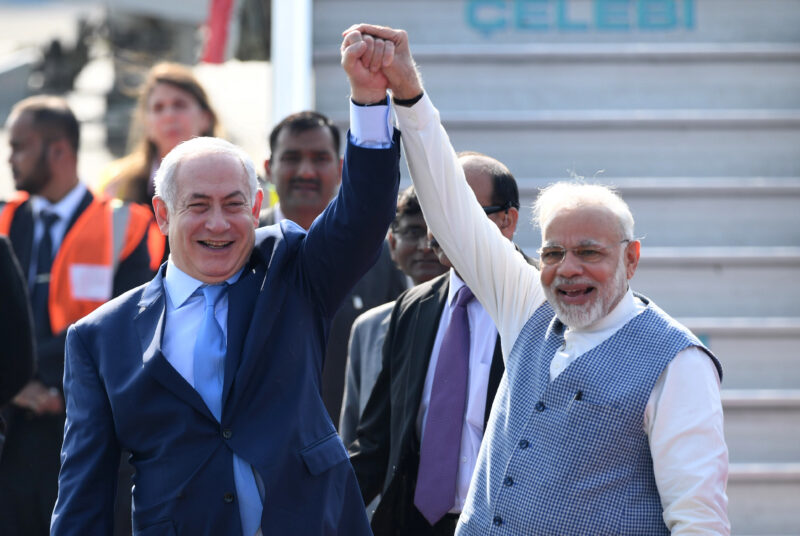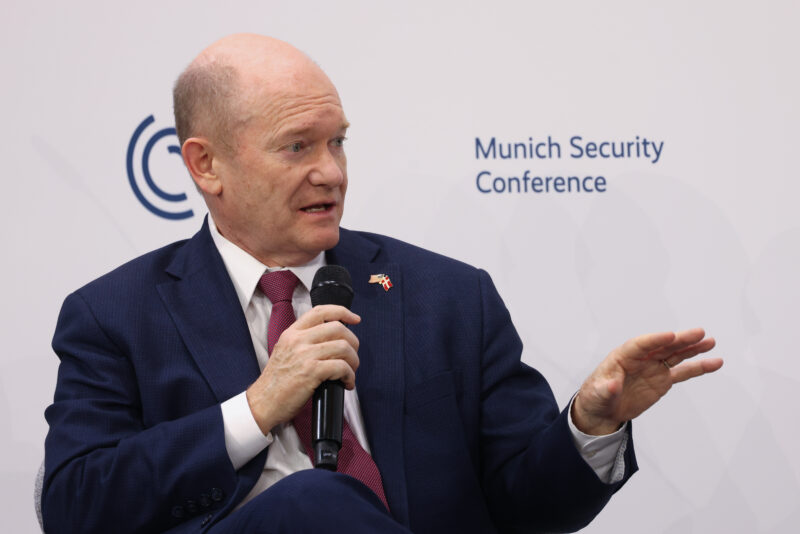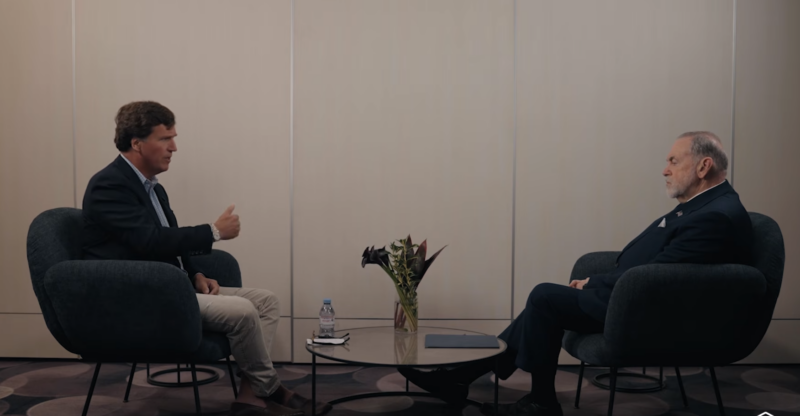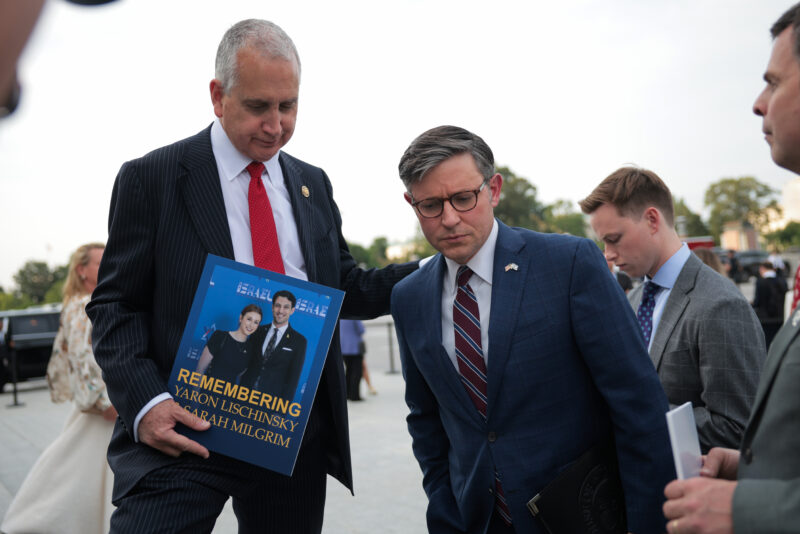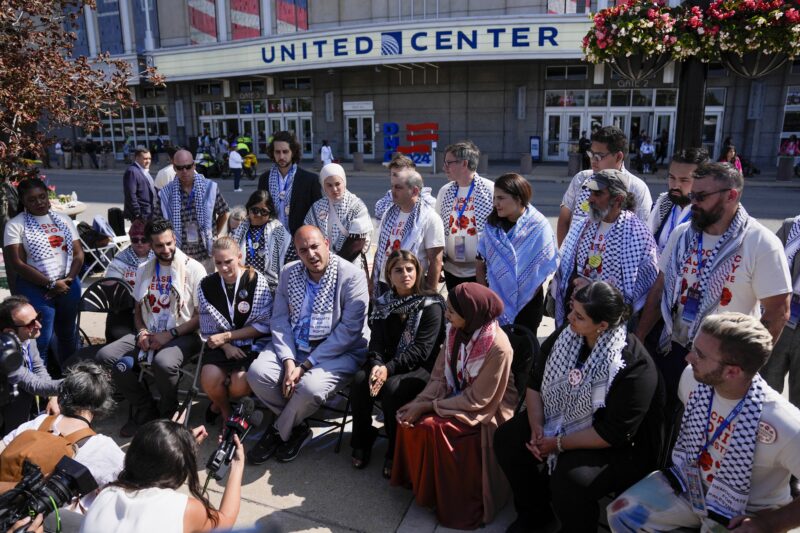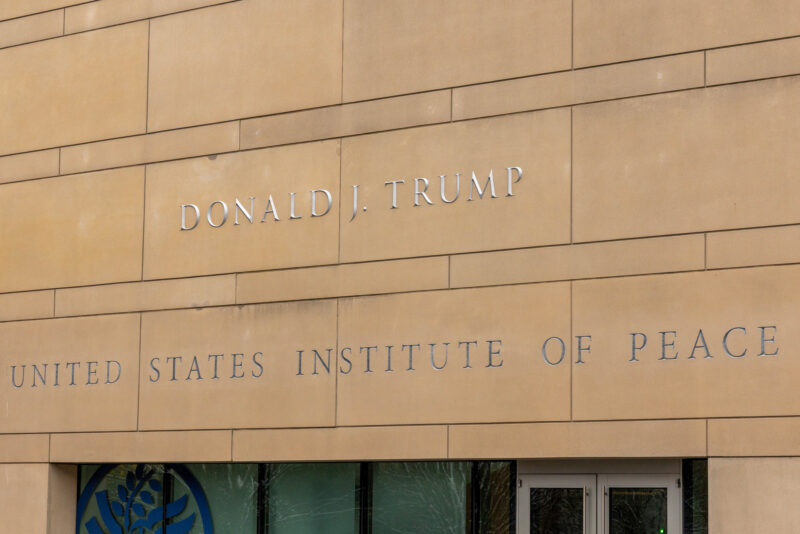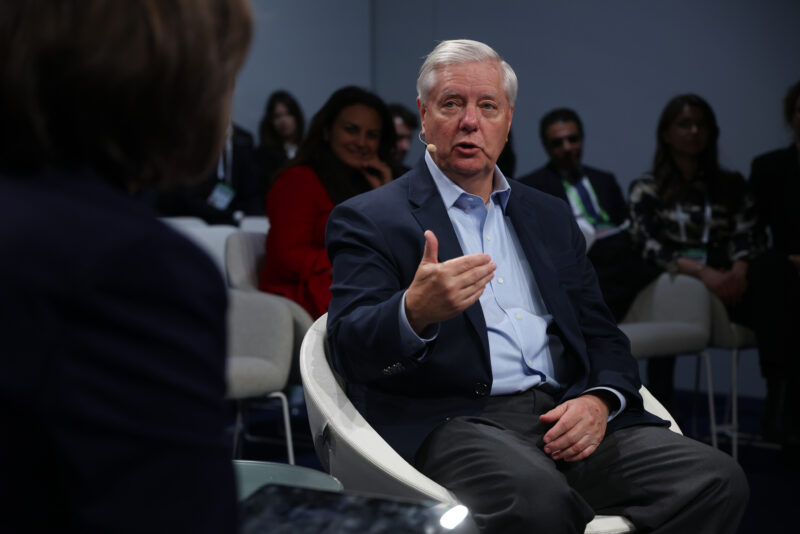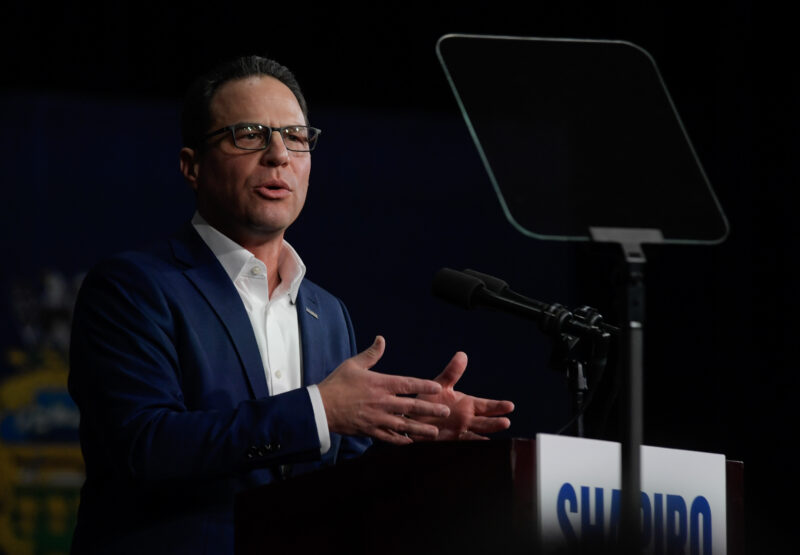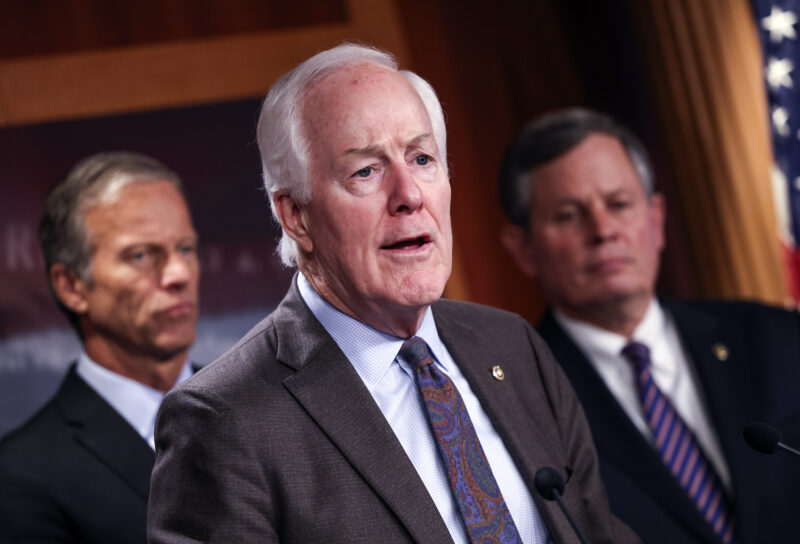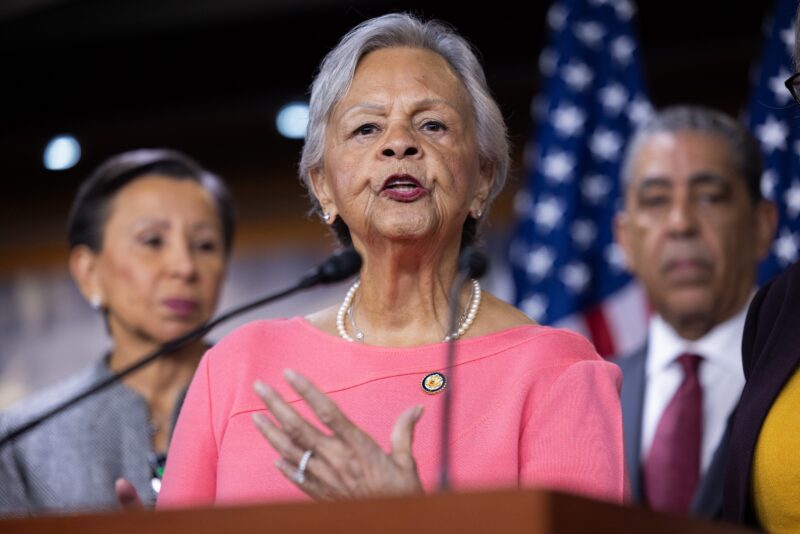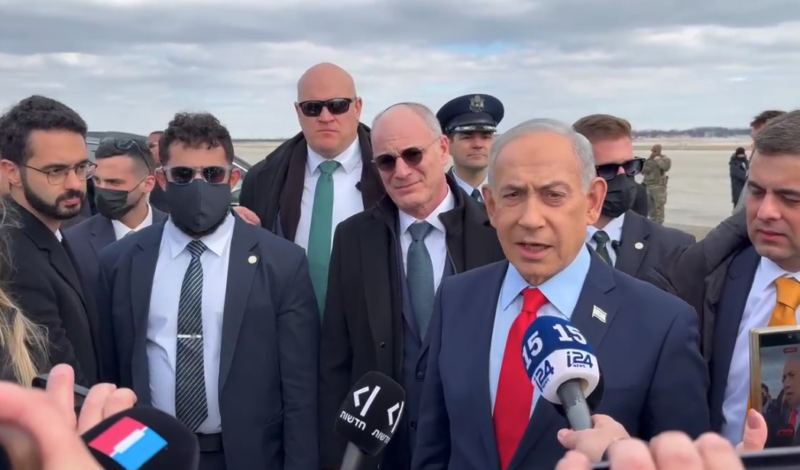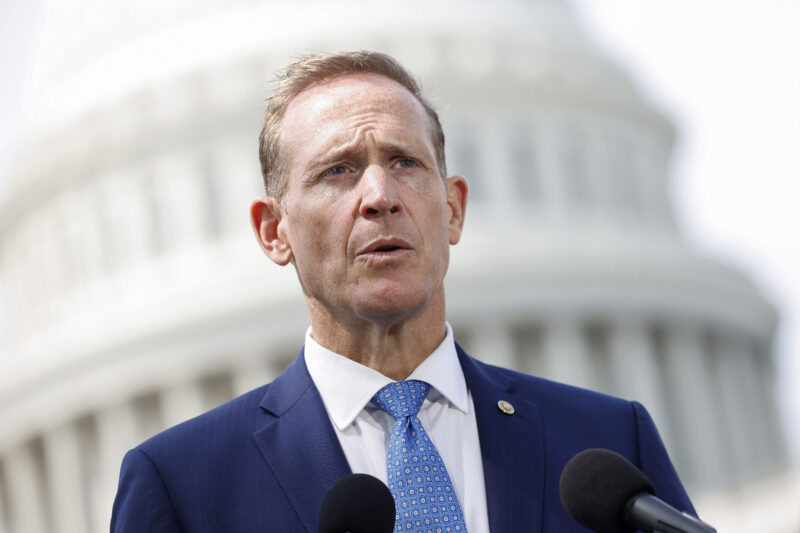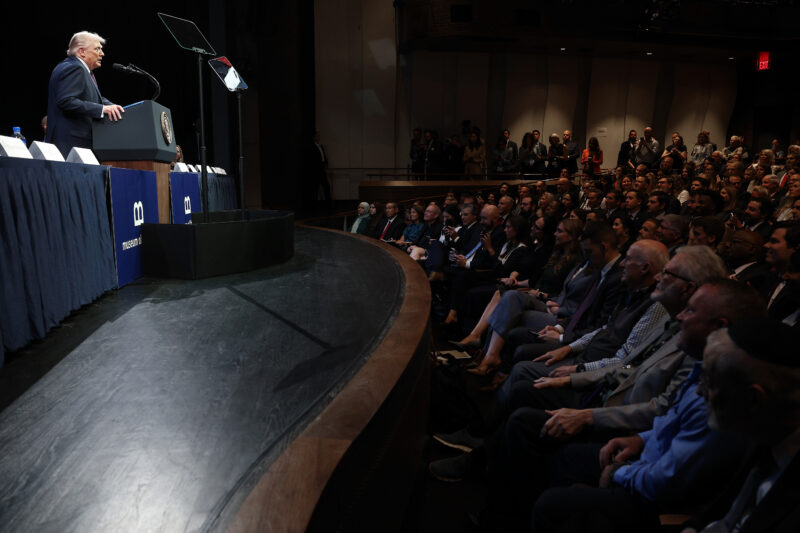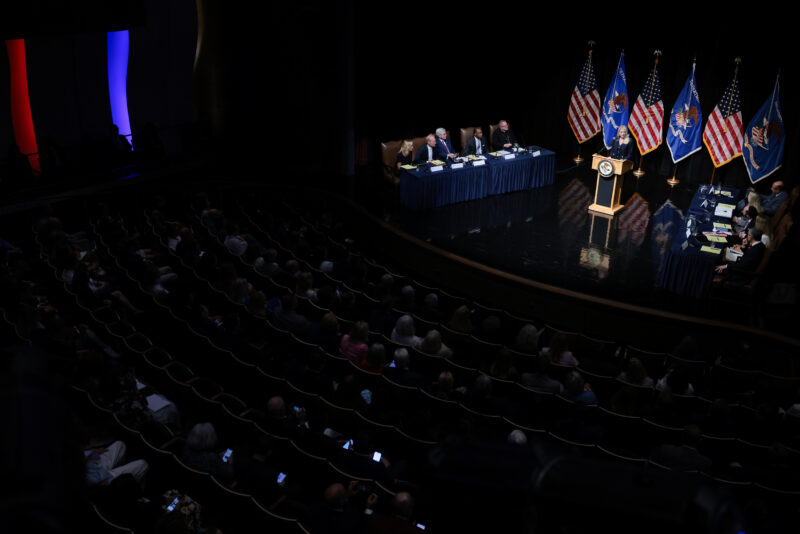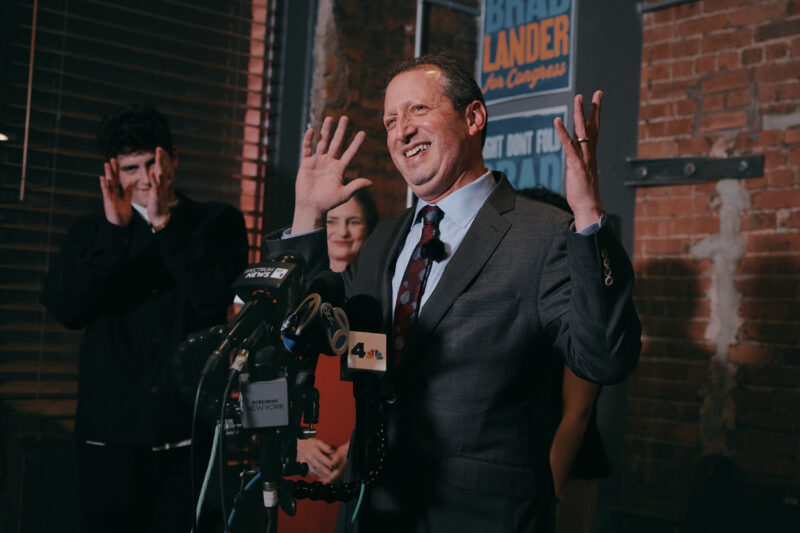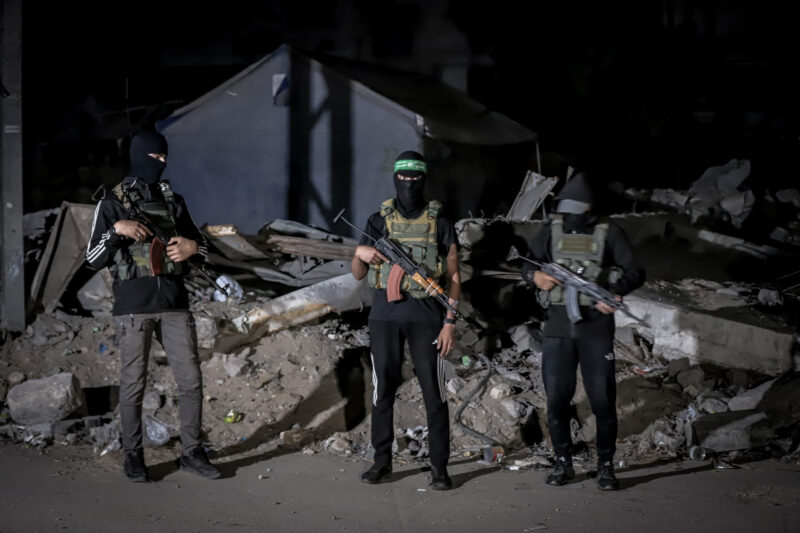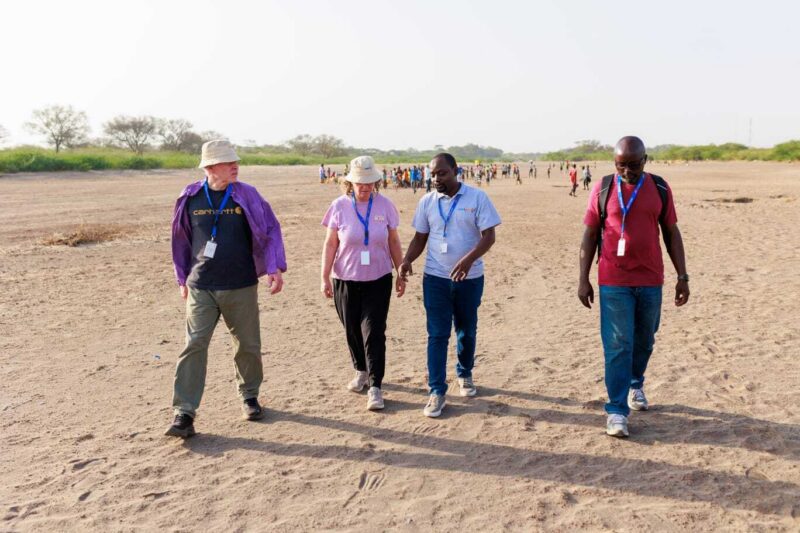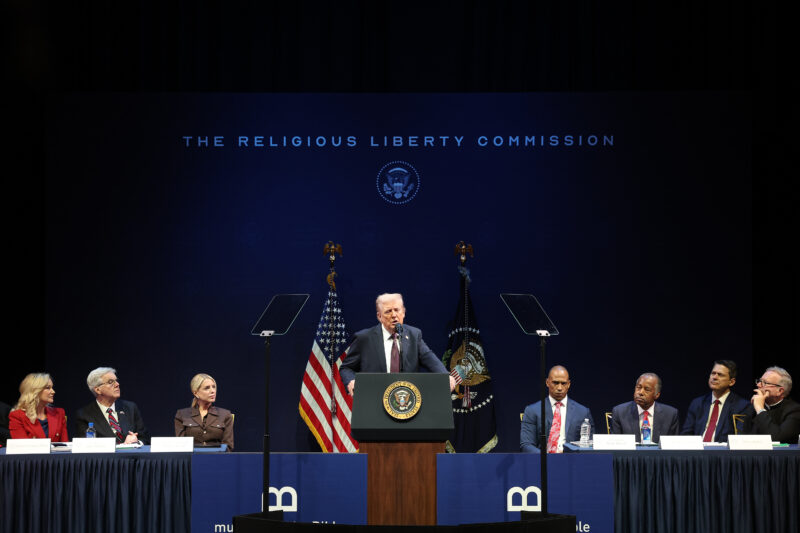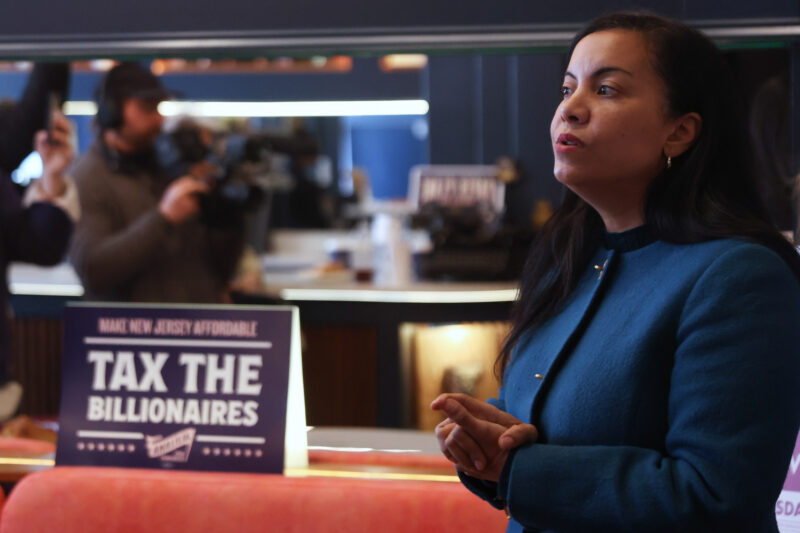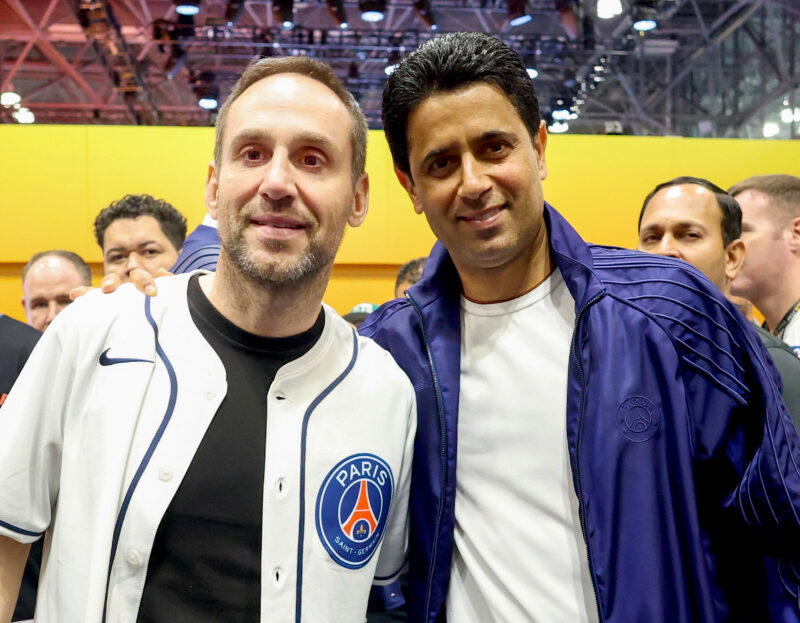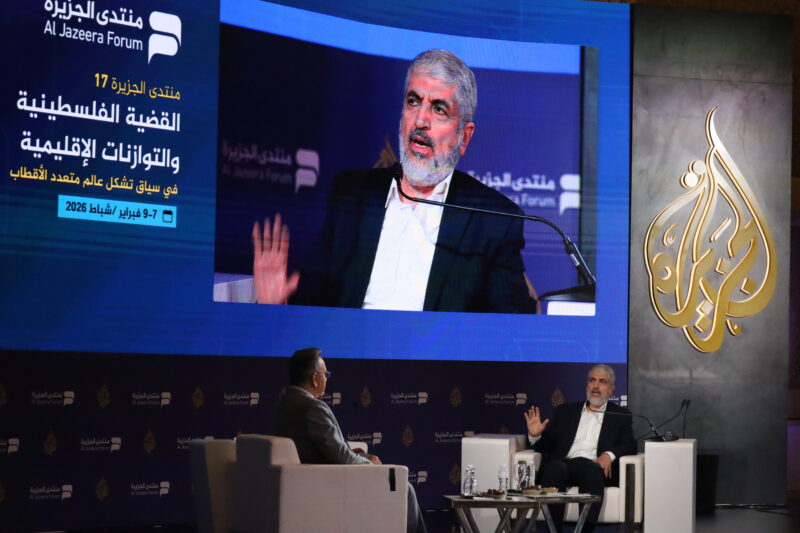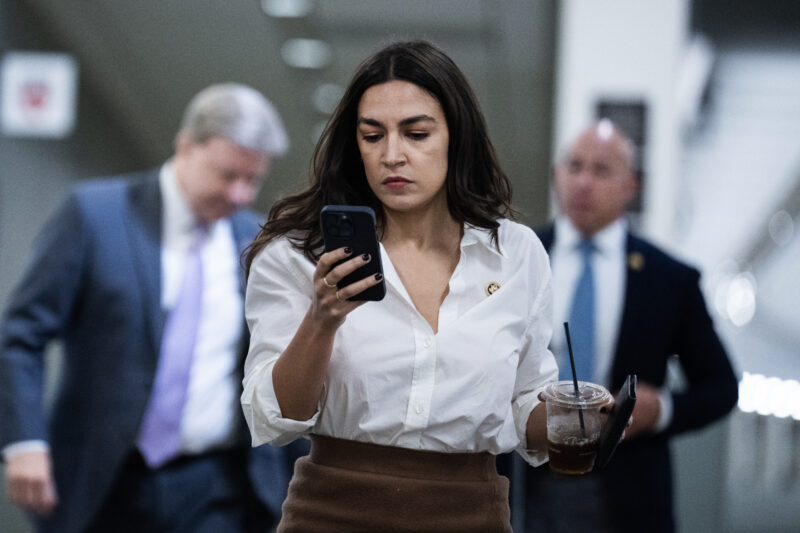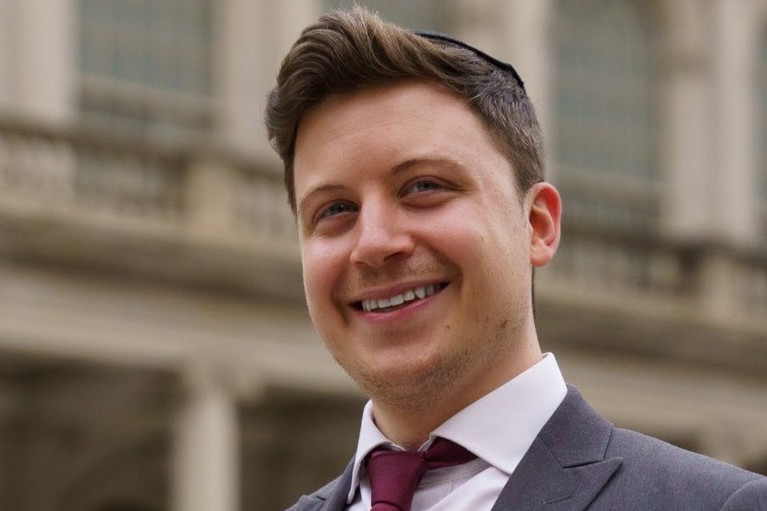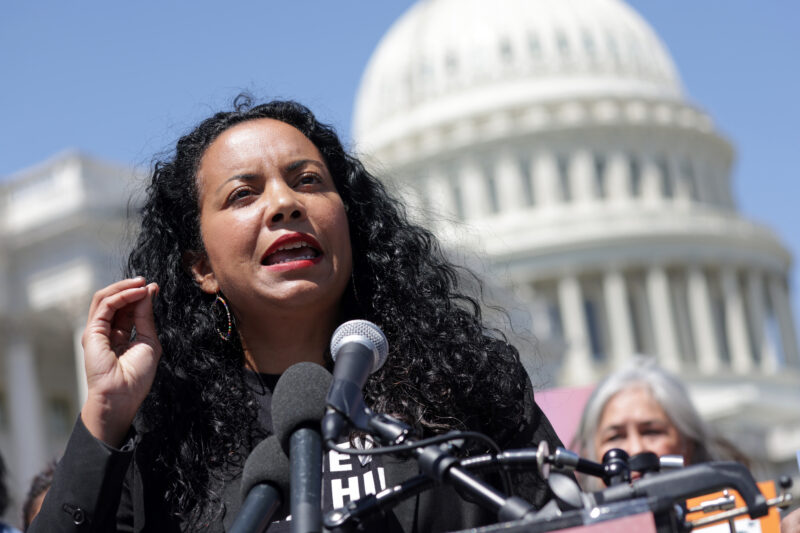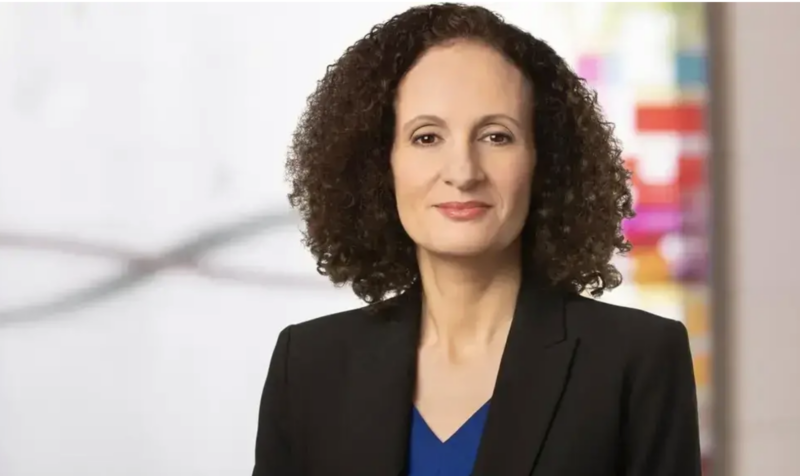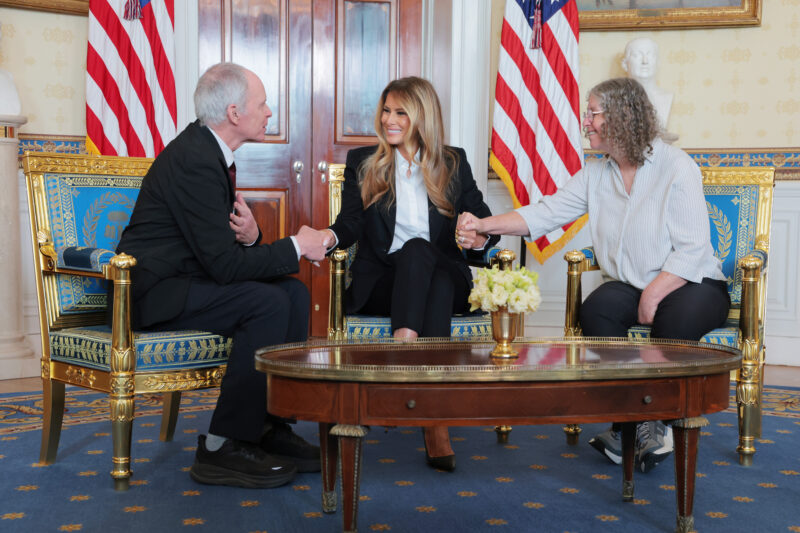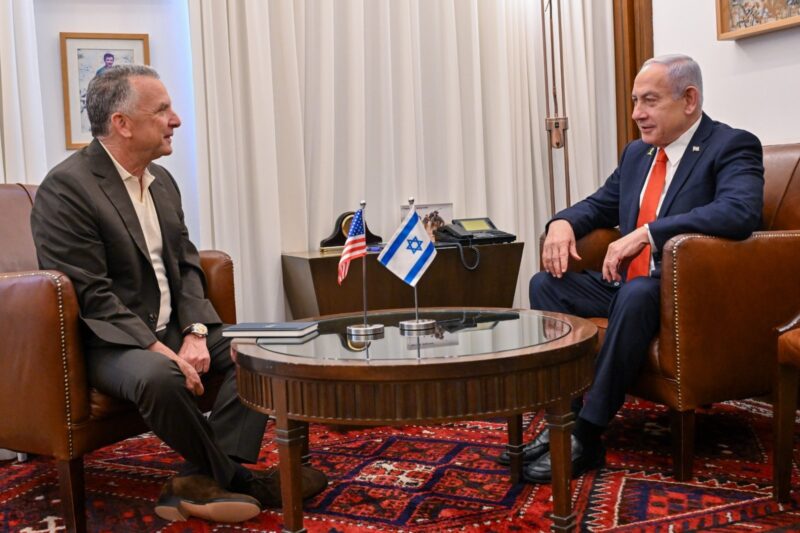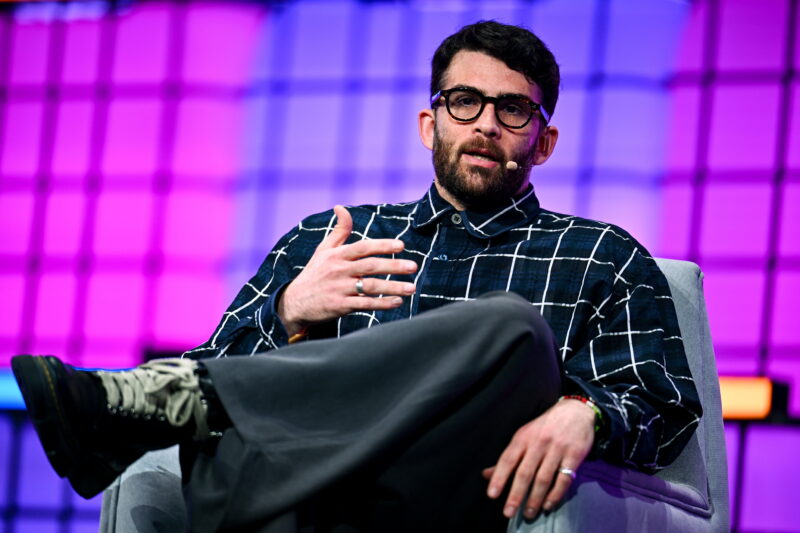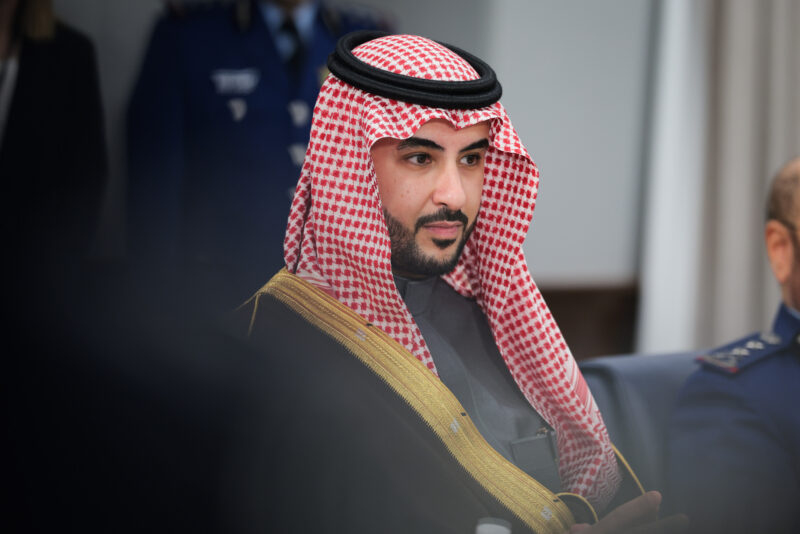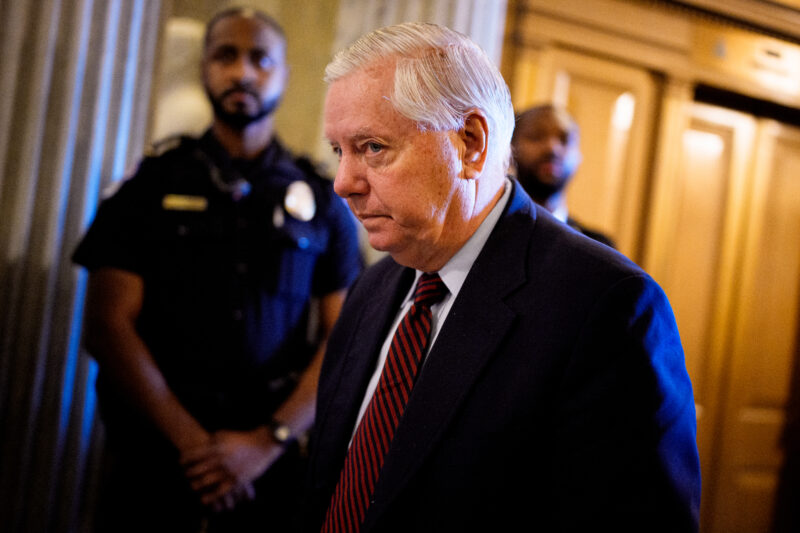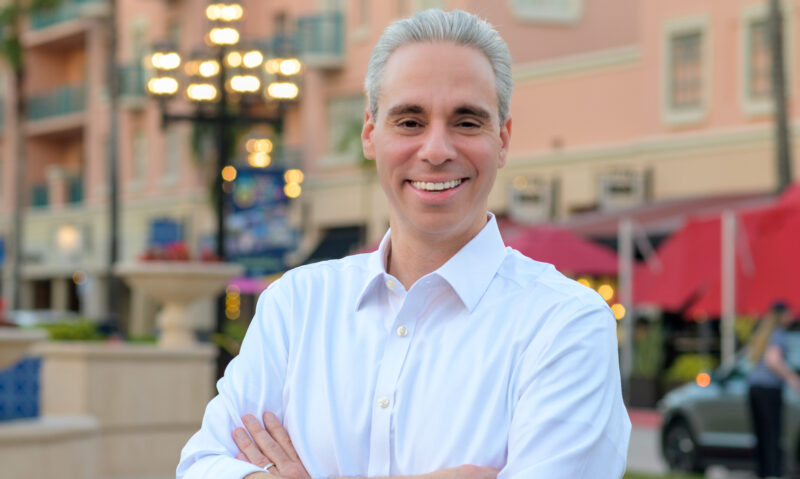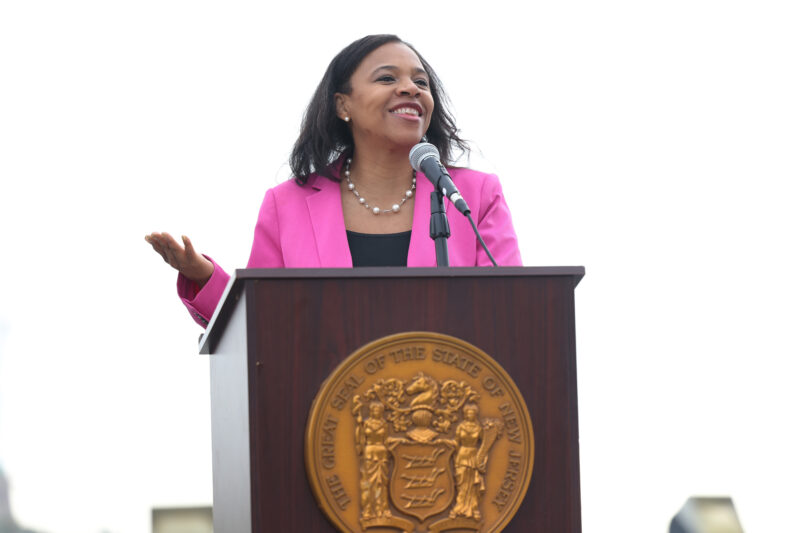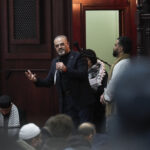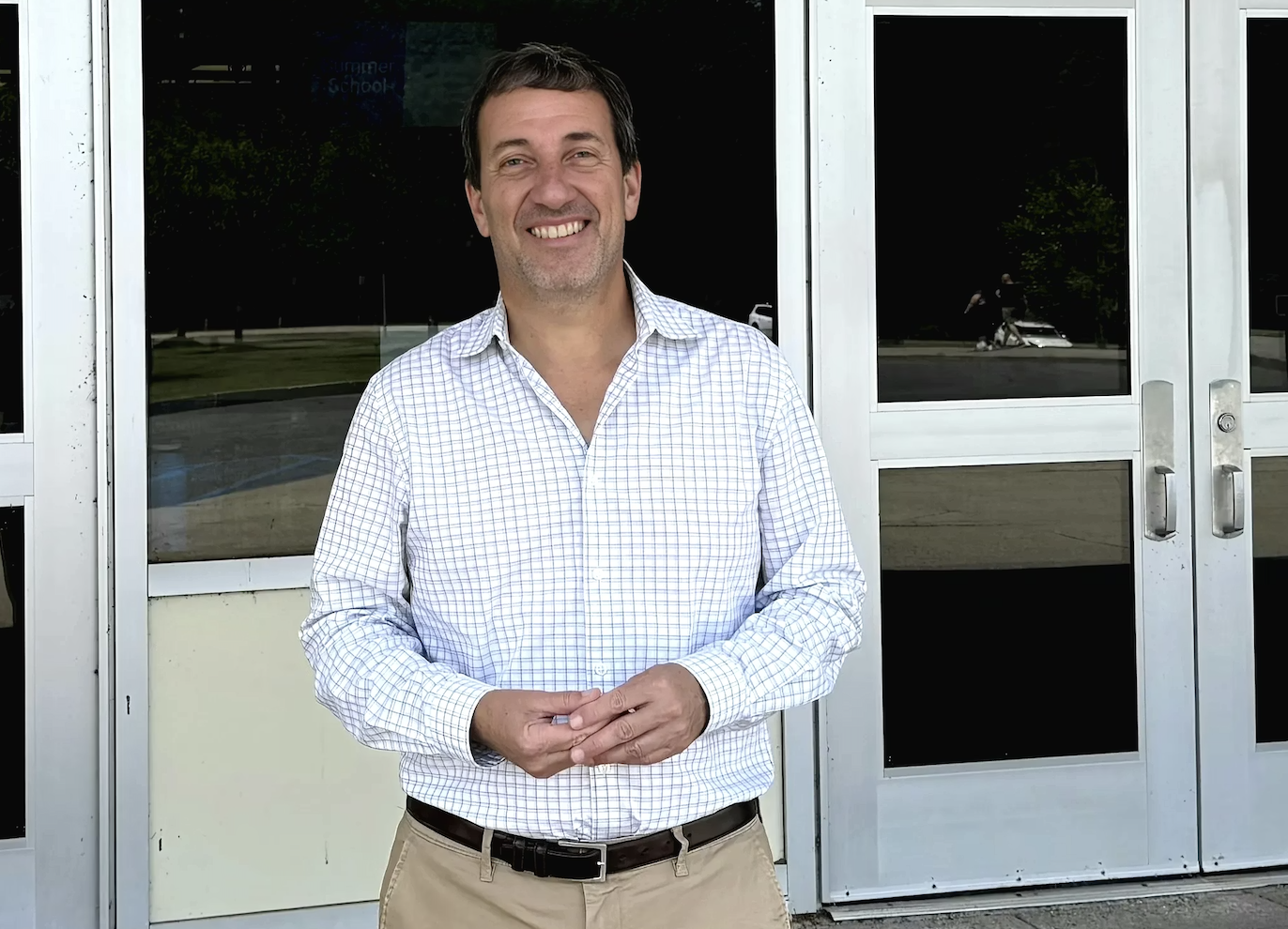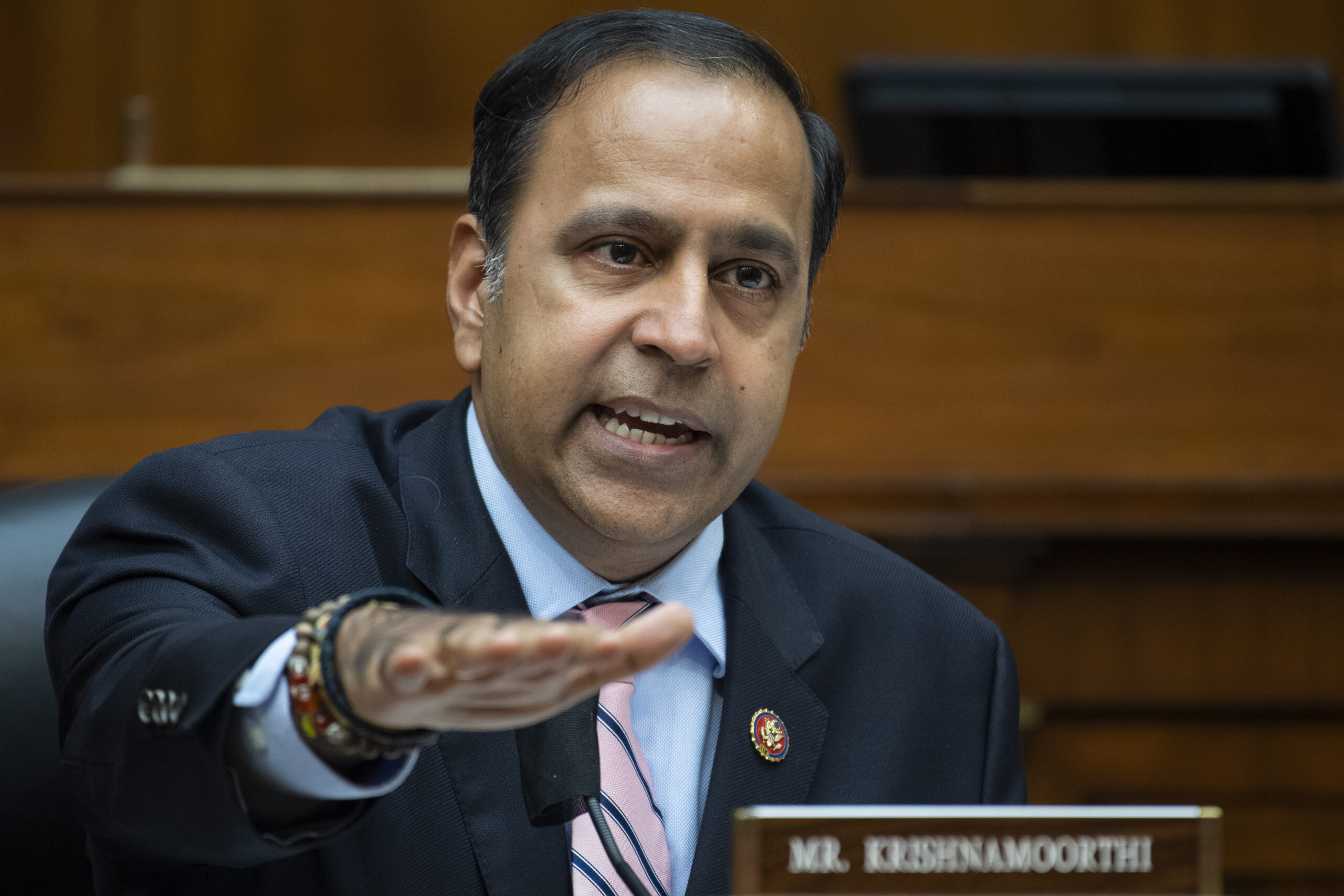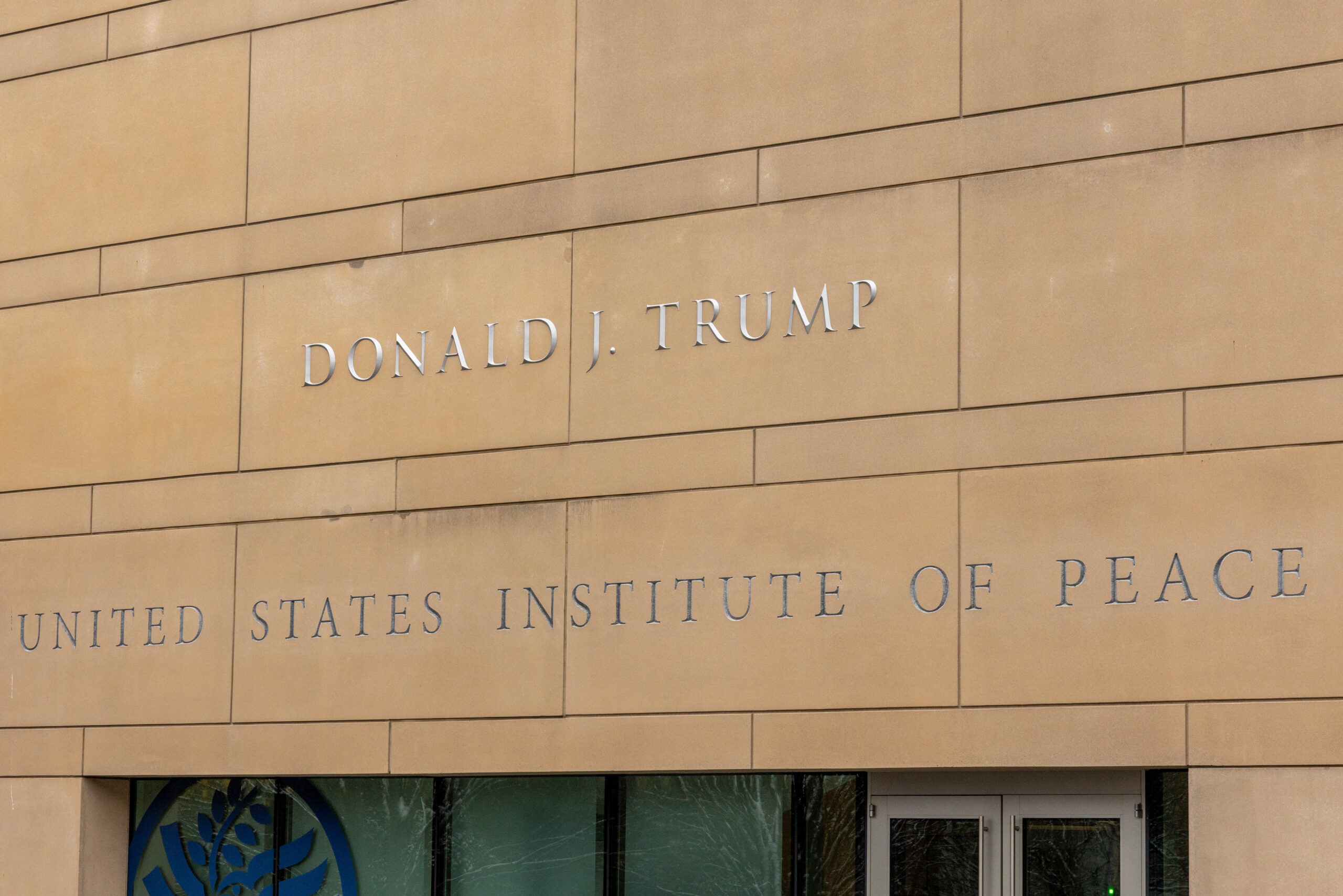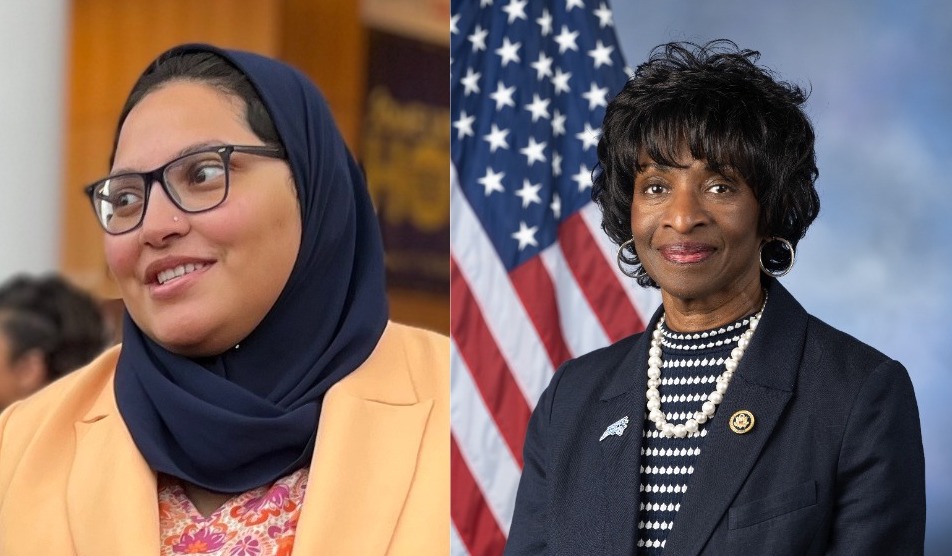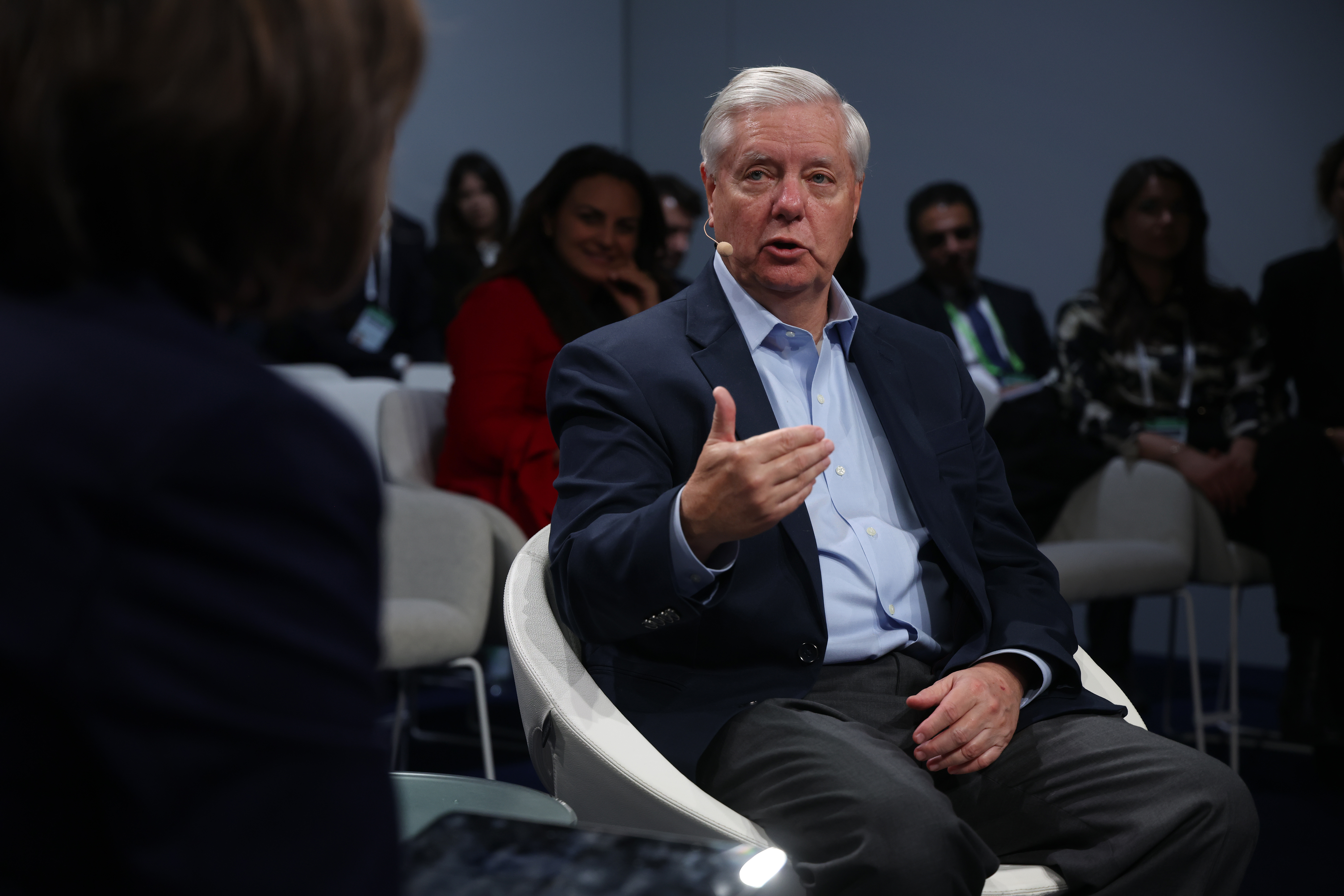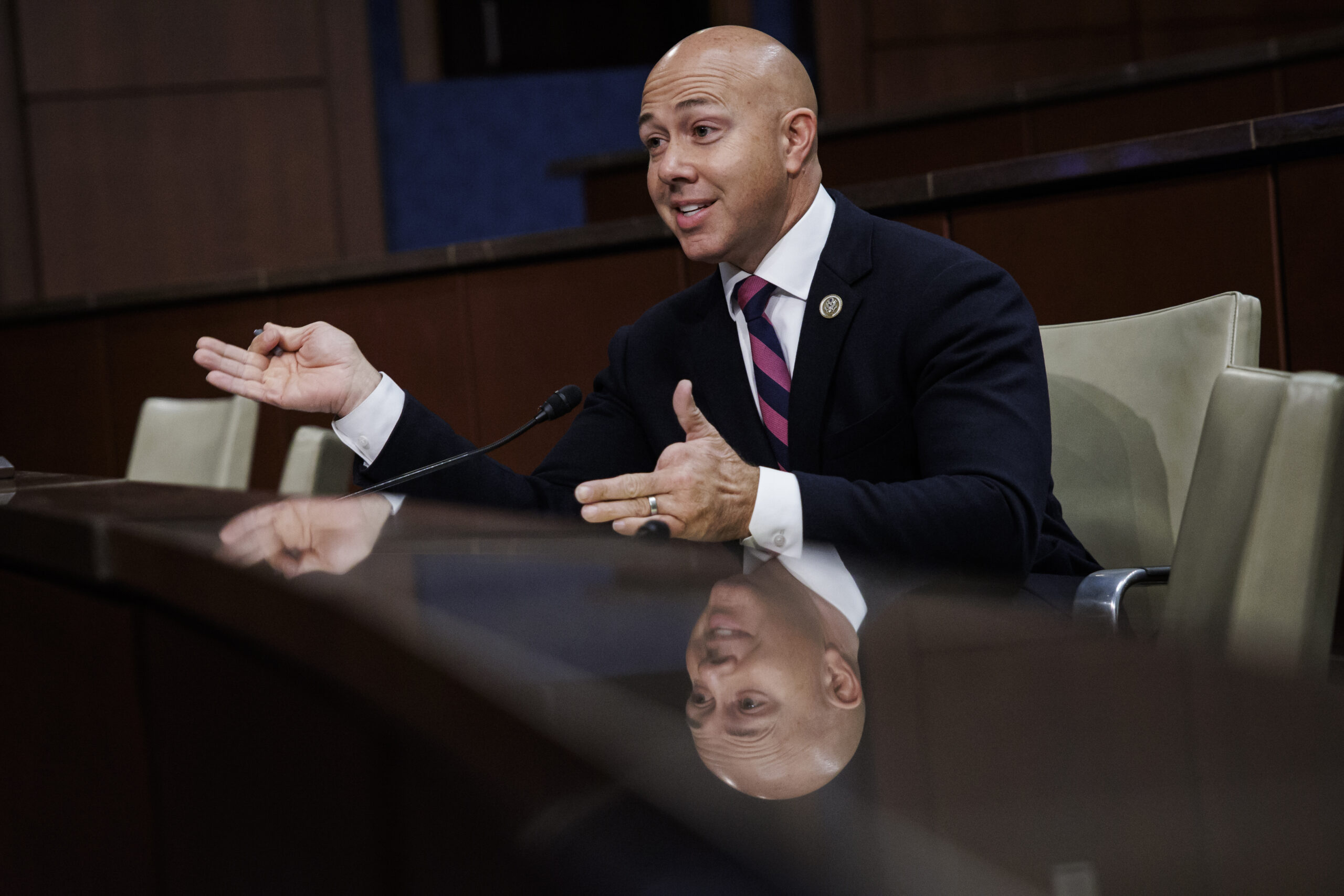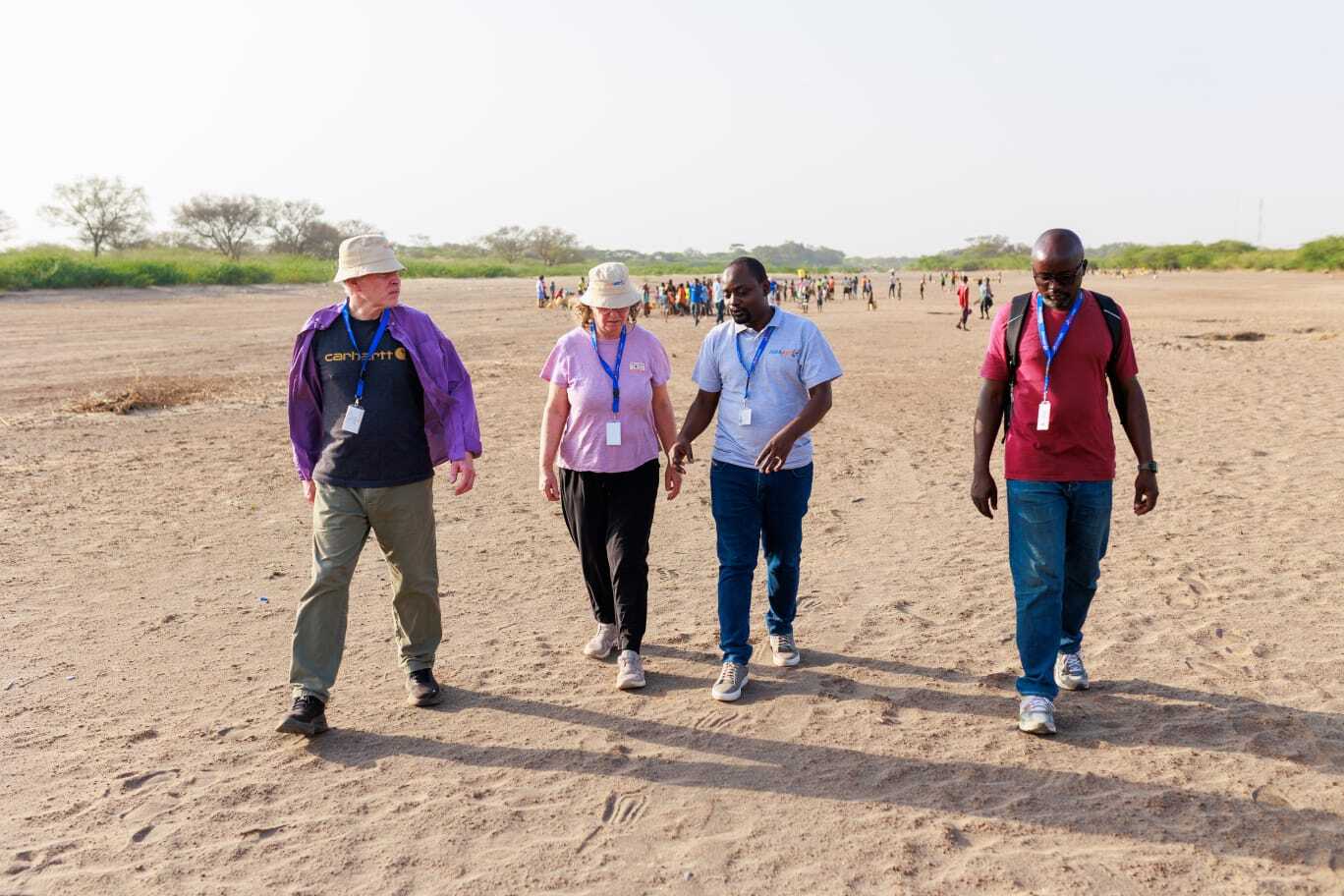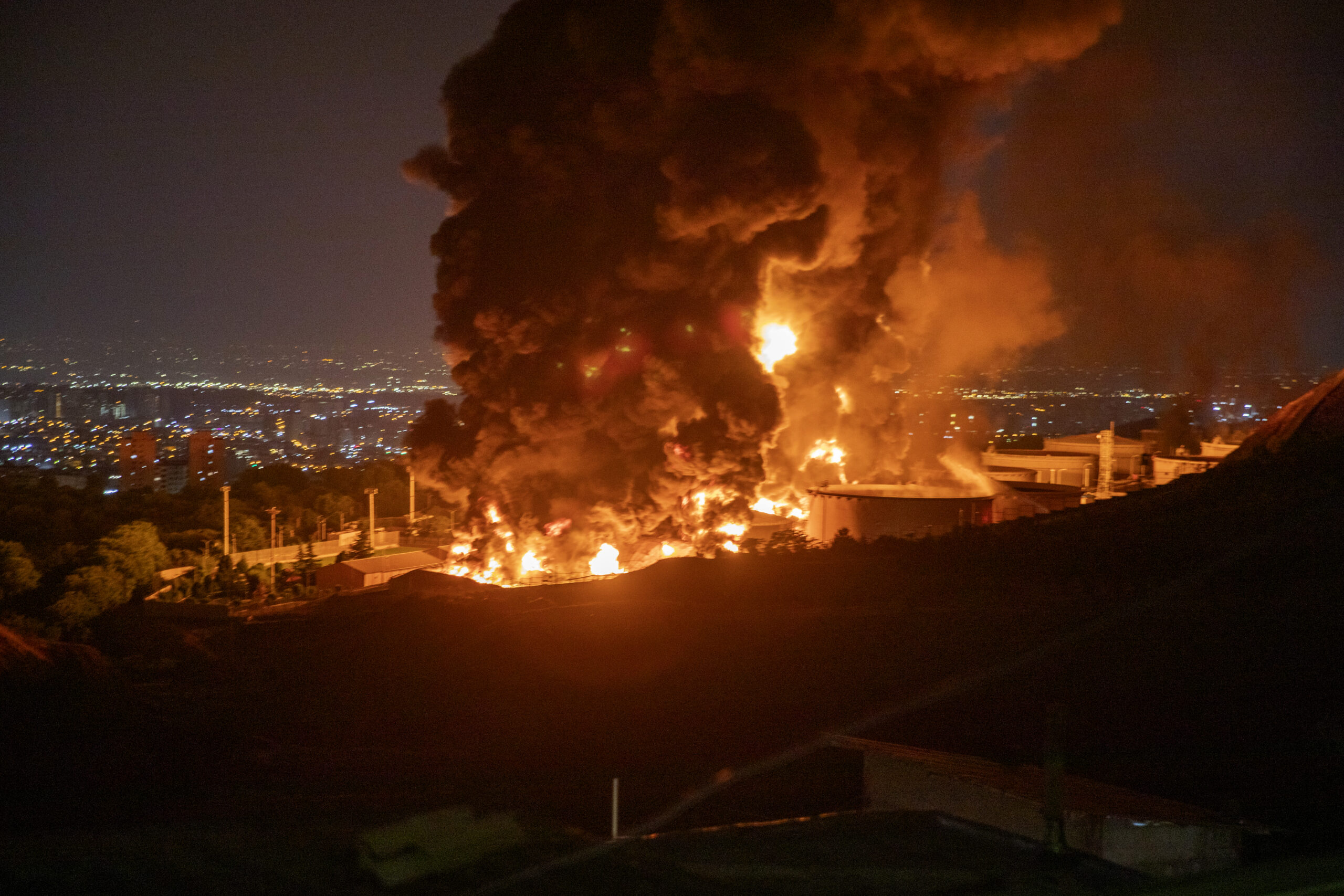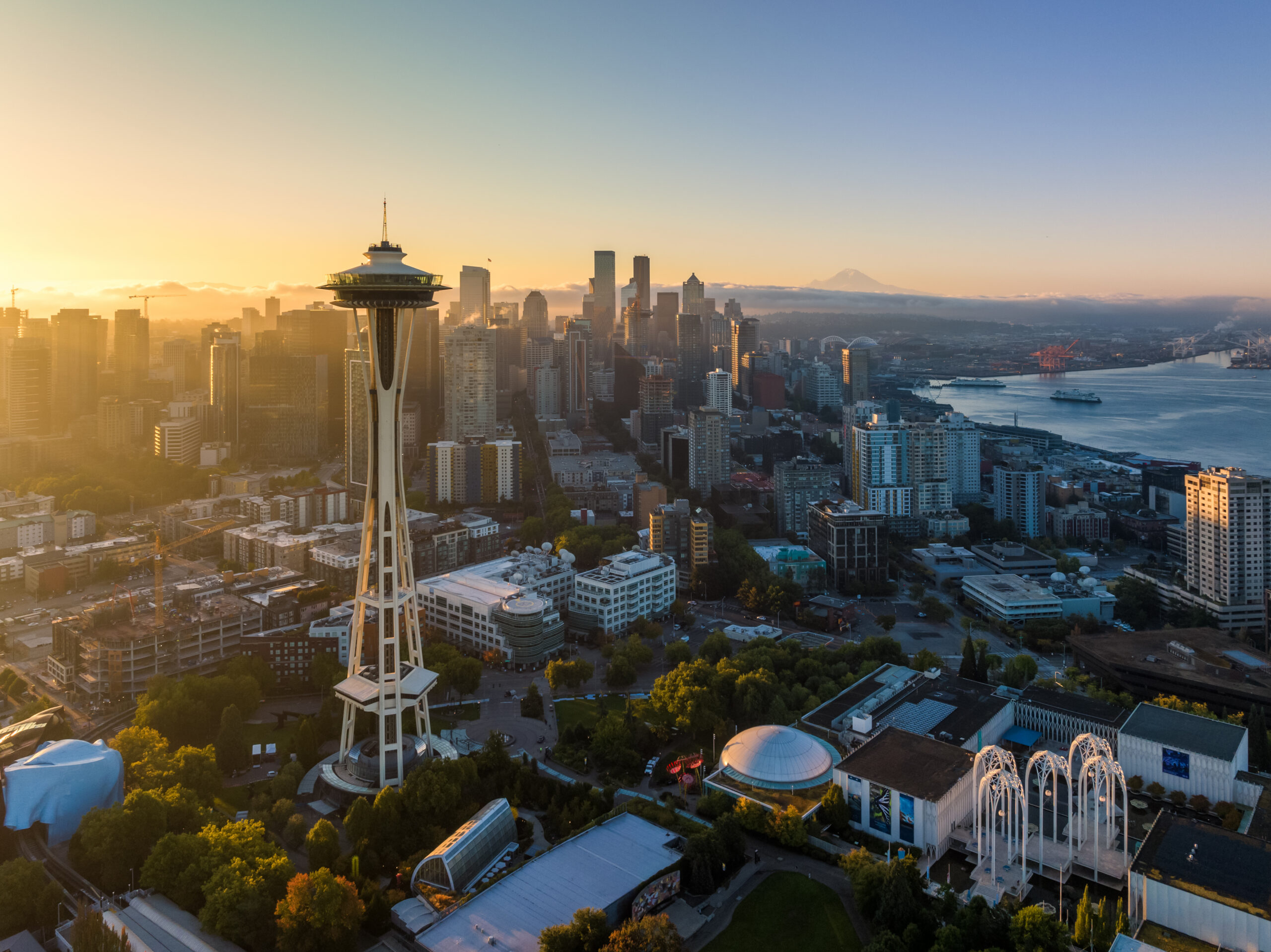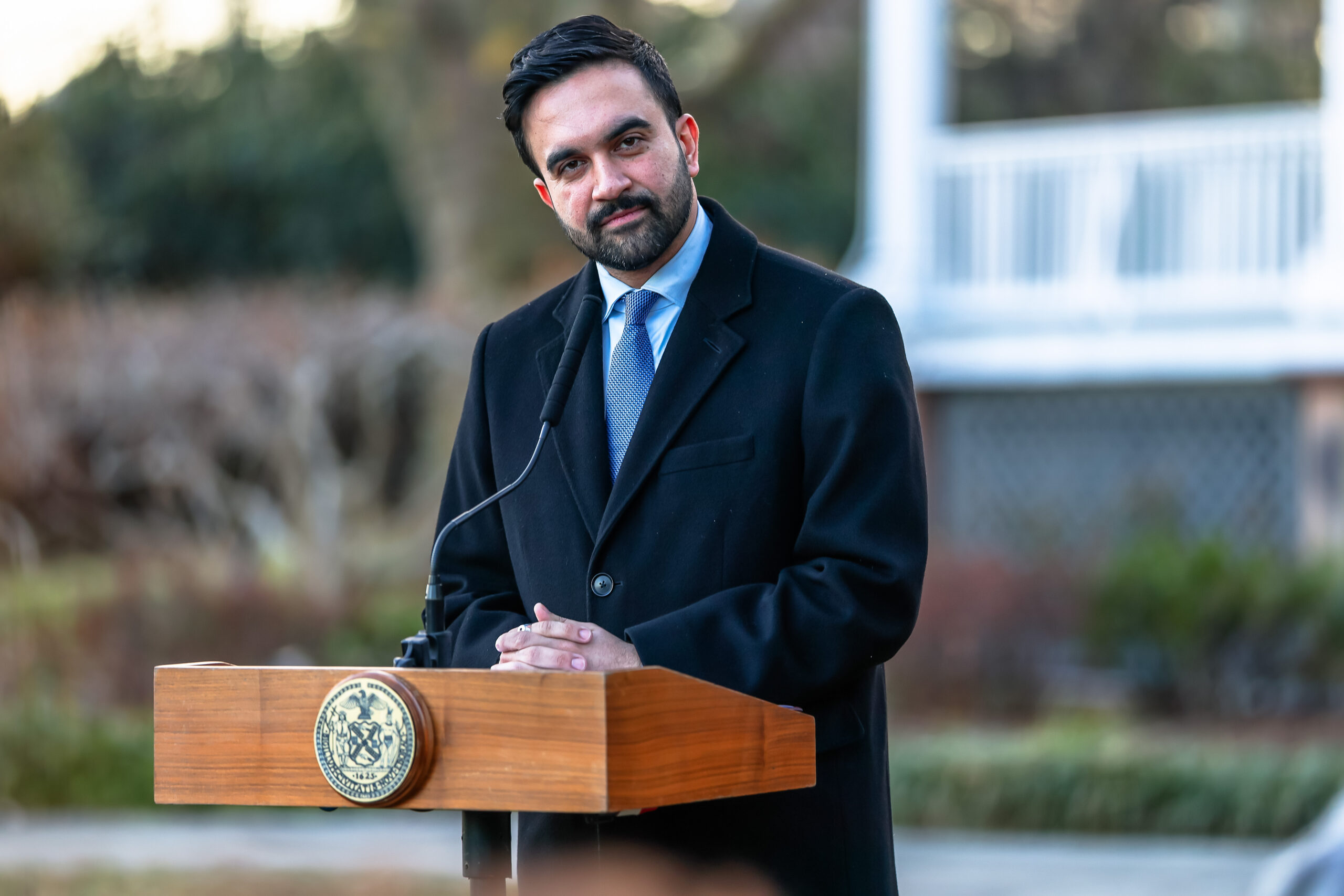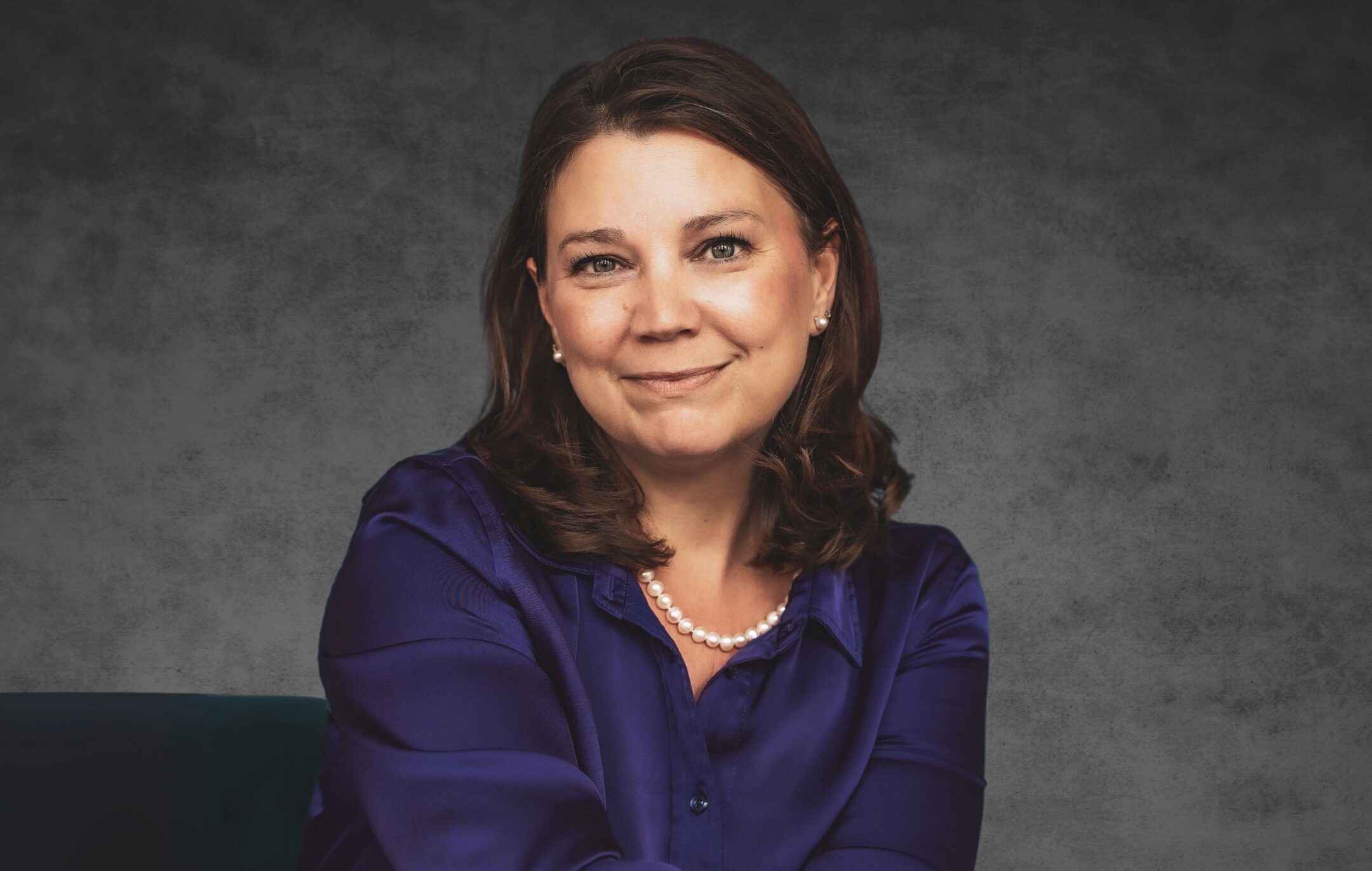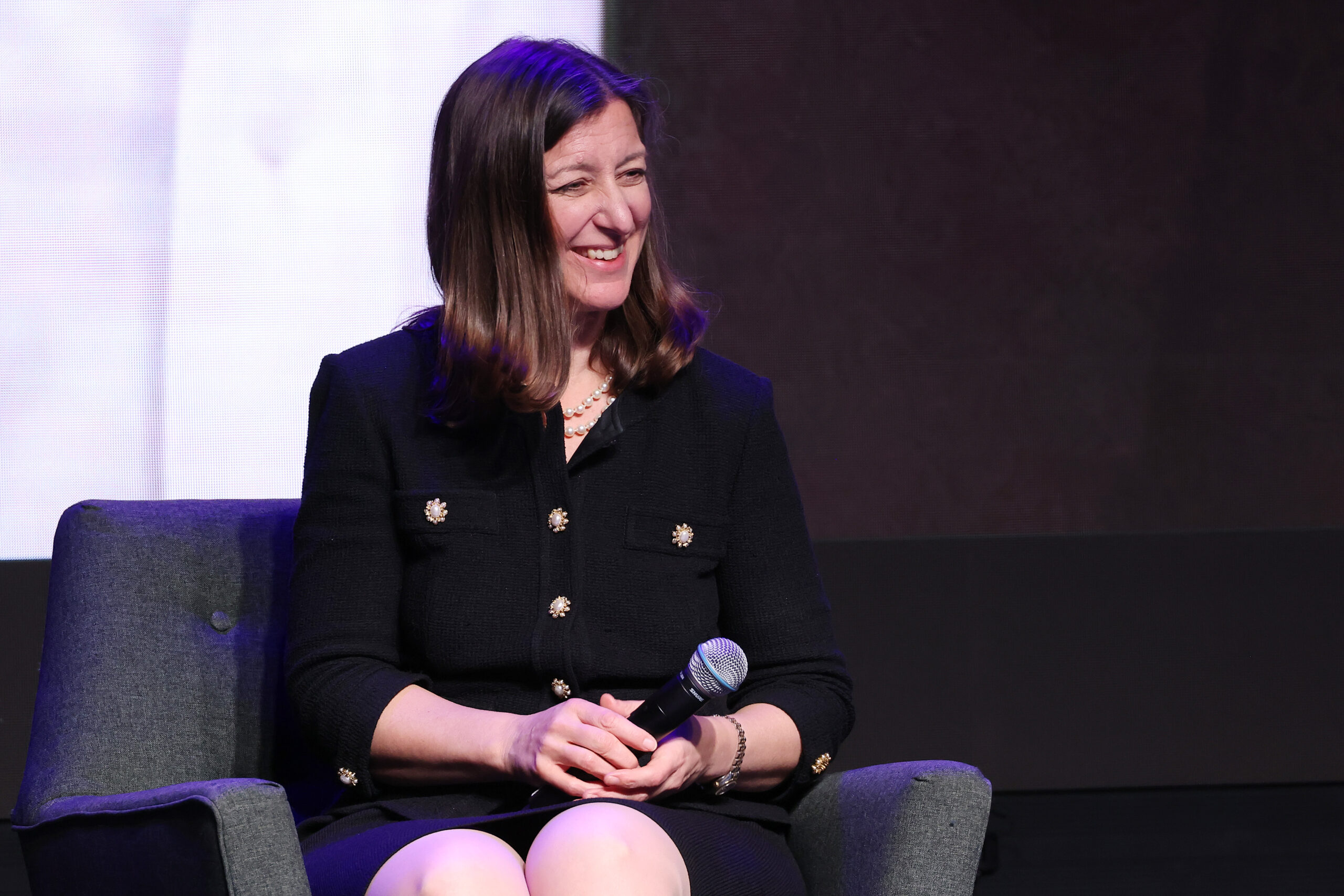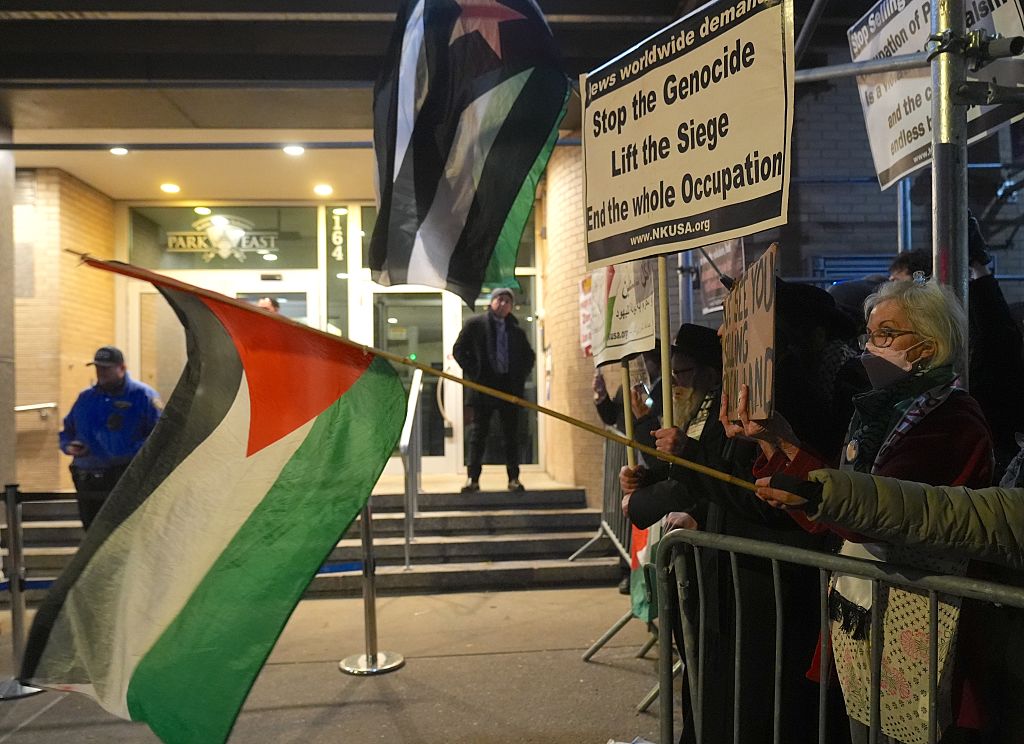‘The president has a number of other tools at his disposal to ensure’ Iran does not get a nuclear weapon, the VP said on Fox News
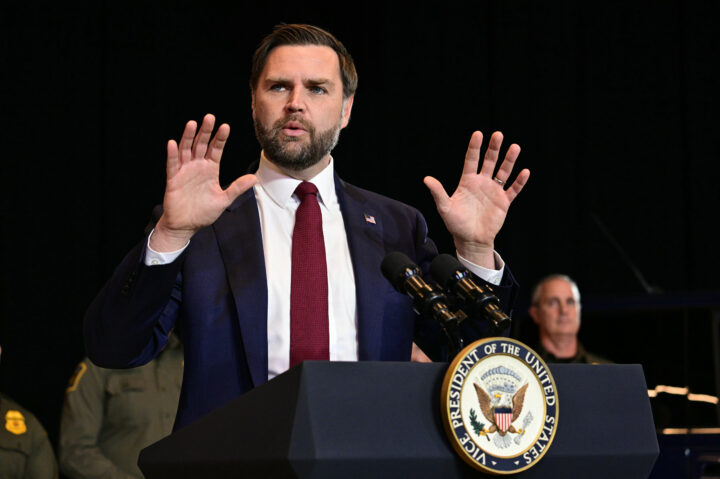
Jim Watson - Pool/Getty Images
U.S. Vice President JD Vance gives remarks following a roundtable discussion with local leaders and community members amid a surge of federal immigration authorities in the area, at Royalston Square on January 22, 2026 in Minneapolis, Minnesota.
A day before U.S.-Iran nuclear talks, Vice President JD Vance urged the Iranian regime on Wednesday to take President Donald Trump’s diplomatic overtures “seriously,” cautioning that the president has “a number of tools at his disposal” to keep the “craziest and worst regime in the world” from acquiring nuclear weapons.
Vance made the comments while appearing on Fox News’ “America’s Newsroom” after being asked about Trump’s comments at the State of the Union on Tuesday night, during which the president underscored his willingness to use force while acknowledging his preference for a diplomatic solution.
“The president has been as crystal clear as he could be: Iran can’t have a nuclear weapon. That would be the ultimate military objective if that’s the route that he chose,” Vance said. “That is what we’re trying to accomplish, as the president said, through the preferred route of diplomacy, but it’s very simple: We have to get to a position where Iran, the largest state sponsor of terrorism in the world, cannot threaten the world with nuclear terrorism.”
“I think most Americans understand that you can’t let the craziest and worst regime in the world have nuclear weapons. That’s what the president is accomplishing, that’s what the president has set as our goal,” he continued. “He’s going to try to accomplish it diplomatically, but as we all know, the president has a number of other tools at his disposal to ensure this doesn’t happen. He’s shown a willingness to use them, and I hope the Iranians take it seriously in their negotiations tomorrow because that’s certainly what the president prefers.”
Asked if that meant the president’s position is that Iranian Supreme Leader Ayatollah Ali Khamenei must be removed, Vance reiterated that the administration is “hopeful that we’re able to come to a good resolution without the military, but if we have to use the military, the president, of course, has that right as well.”
“I think the president ultimately will make the decision about how to ensure Iran does not have a nuclear weapon, but we’re sitting down having another round of diplomatic talks with the Iranians, trying to reach a reasonable settlement, but a reasonable settlement towards what end?” Vance asked. “Iran can’t have a nuclear weapon. It’s very simple. I think the supreme leader and everybody in their system should understand it. We’ve been crystal clear.”
Sen. Lindsey Graham (R-SC), meanwhile, warned on Wednesday that he would not support a Trump administration-brokered deal with Iran that would allow the regime to continue enriching some uranium as part of its nuclear program.
“If media reports are true that there is a consideration of allowing Iran to have very small enrichment of uranium for face-saving purposes: screw that,” Graham wrote on X. “This regime is made up of religious Nazis that are the largest state sponsor of terrorism. The regime has American blood on its hands and they have killed over 30,000 of their citizens simply because they demand the end to their oppression.”
Graham added that he “could care less about efforts to save face for this regime. I would like to see the people of Iran change the regime – it’s long overdue. I hope help is on the way.”
Plus, Witkoff calls for indefinite Iran nuclear deal

Mario Tama/Getty Images
An attendee wears a jacket at an Iowa caucus watch party organized by Metro D.C. Democratic Socialists of America, on February 3, 2020 in Washington, DC.
Good Wednesday afternoon!
This P.M. edition is reserved for our premium subscribers — offering a forward-focused read on what we’re tracking now and what’s coming next.
It’s me again — Danielle Cohen-Kanik, U.S. editor at Jewish Insider and curator, along with assists from my colleagues, of the Daily Overtime. Please don’t hesitate to share your thoughts and feedback by replying to this email.
📡On Our Radar
Notable developments and interesting tidbits we’re tracking
Ahead of the third round of U.S.-Iran negotiations taking place in Geneva tomorrow, Vice President JD Vance told Fox News that President Donald Trump “has a number of other tools at his disposal” besides diplomacy to ensure “the craziest and worst regime in the world” does not obtain nuclear weapons, following on the president’s remarks during last night’s State of the Union calling Iran “the world’s No. 1 sponsor of terror”…
In response to Trump’s comments, where he also said Iran was developing advanced ballistic missiles and had killed 32,000 protesters, Iranian Foreign Ministry spokesperson Esmail Baghaei tied Trump to the “law of propaganda coined by Nazi [chief propagandist] Joseph Goebbels.”
“This is now systematically used by the U.S. administration and the war profiteers encircling it, particularly the genocidal Israeli regime … Whatever they’re alleging in regards to Iran’s nuclear program, Iran’s ballistic missiles, and the number of casualties during January’s unrest is simply the repetition of ‘big lies,’” Baghaei wrote on X…
White House Special Envoy Steve Witkoff, who is leading Iran negotiations alongside Jared Kushner, reportedly told AIPAC members at the group’s summit in Washington yesterday that any deal reached with Iran should not have a “sunset clause,” as the 2015 Joint Comprehensive Plan of Action was criticized for.
“We start with the Iranians with the premise that there is no sunset provision. Whether we get a deal or not, our premise is: you have to behave for the rest of your lives,” Witkoff told the group, according to Axios. He said talks are currently focused only on the nuclear issue, but if they are successful, the administration would look to hold additional talks on Tehran’s missile program and support for terror proxies…
Satellite photos analyzed by the Associated Press appear to show U.S. ships that typically dock in Bahrain as part of the U.S. Navy’s 5th Fleet have moved out to sea. The 5th Fleet similarly scattered its ships during the U.S. strikes in Iran last June…
Dutch airline KLM announced a suspension of flights between its hub in Amsterdam and Israel’s Ben Gurion Airport starting March 1 until further notice, saying in a statement that it is currently “not commercially or operationally feasible for KLM to operate flights to Tel Aviv.” It’s the first airline to pause flights amid the current unrest with Iran…
On the campaign trail, Washington, D.C., mayoral candidate Janeese Lewis George vowed to reject the “Zionist lobby” in a questionnaire seeking the endorsement of the Metro D.C. chapter of the Democratic Socialists of America, Jewish Insider’s Gabby Deutch reports, a category that the DSA said includes AIPAC, Democratic Majority for Israel, Christians United for Israel and J Street.
Referencing her appearance at an event with the Jewish Community Relations Council of Greater Washington in December, Lewis George assured the DSA she “disagree[s] with the JCRC on a number of issues,” including its opposition to describing Israel’s actions in Gaza as a genocide and its “definition of antisemitism that criminalizes dissent, and their attacks on activists.”
Ron Halber, CEO of the JCRC, told JI, “As far as I’m concerned, [the DSA’s questionnaire] is an antisemitic manifesto. They are making the price of their endorsement the social exclusion of Jews”…
Illinois state Sen. Laura Fine, a Democrat running for an open Illinois House seat, unapologetically championed her backing for Israel in a position paper obtained by JI’s Marc Rod, amid attacks from anti-Israel activists and groups over her support for the Jewish state and backing from pro-Israel supporters.
Fine described Israel in the paper as “more than just a strategic ally, it is a beacon of democracy in one of the world’s most volatile regions,” as she and some of her primary opponents, including Evanston Mayor Daniel Biss and far-left activist Kat Abughazaleh, are set to participate in a televised debate tonight…
The U.S.-led Board of Peace released a video today laying out its vision for Gaza. The board’s goal by Year 3 is to fully rebuild the southern Gazan city of Rafah and have Gaza “connected to the world through an Abrahamic gateway, linking it with Egypt, Israel, Jordan, Saudi Arabia, the UAE and extending to India and Europe.” By the board’s 10th year, it said, Gaza will be “self-governed,” without specifying who will oversee the enclave and how Hamas will be removed from power…
Knesset Speaker Amir Ohana awarded Indian Prime Minister Narendra Modi the newly established Medal of the Knesset, the highest honor of the body, after Modi’s address there today. His remarks were warmly received by members of Knesset and Israeli Prime Minister Benjamin Netanyahu, who was also in the chamber…
Following Israel’s recognition of Somaliland’s independence in December, Jerusalem accepted the appointment of Mohamed Hagi as the first Somaliland ambassador to the Jewish state (and its first fully accredited ambassador anywhere in the world). Hagi “was a member of the inner circle of officials who promoted the establishment of relations between Israel and Somaliland,” the Israeli Foreign Ministry said, and vowed that a reciprocal Israeli ambassador “will soon be appointed”…
Former Harvard President Larry Summers will remain on leave from his teaching position at the Ivy League school for the duration of the academic year, at which point he will retire, Harvard announced today, after files released by the Department of Justice showed Summers maintained a relationship with sex trafficker Jeffrey Epstein after the financier had been convicted of prostitution involving a minor…
⏩ Tomorrow’s Agenda, Today
An early look at tomorrow’s storylines and schedule to keep you a step ahead
Keep an eye out in Jewish Insider for a preview of Fox Nation’s new docudrama on King David, offering a dramatic reenactment of the biblical coming-of-age story of the Jewish leader.
White House Special Envoy Steve Witkoff and Jared Kushner will hold discussions with Iranian Foreign Minister Abbas Araghchi in Geneva, mediated by Omani Foreign Minister Badr Albusaidi.
California Jewish groups including the JCRC Bay Area, the Jewish Federation of Los Angeles and Jewish California, which rebranded today from its previous name of JPAC, are hosting a forum for candidates running for governor, as Gov. Gavin Newsom reaches his term limit. Participating candidates include former presidential contender Tom Steyer, Rep. Eric Swalwell (D-CA), San Jose Mayor Matt Mahan and former Los Angeles Mayor Antonio Villaraigosa, all of whom are Democrats, as well as Republican commentator Steve Hilton.
Stories You May Have Missed
PUSHING BACK
Moderate Democrats mock notion that Kamala Harris lost because she wasn’t tougher on Israel
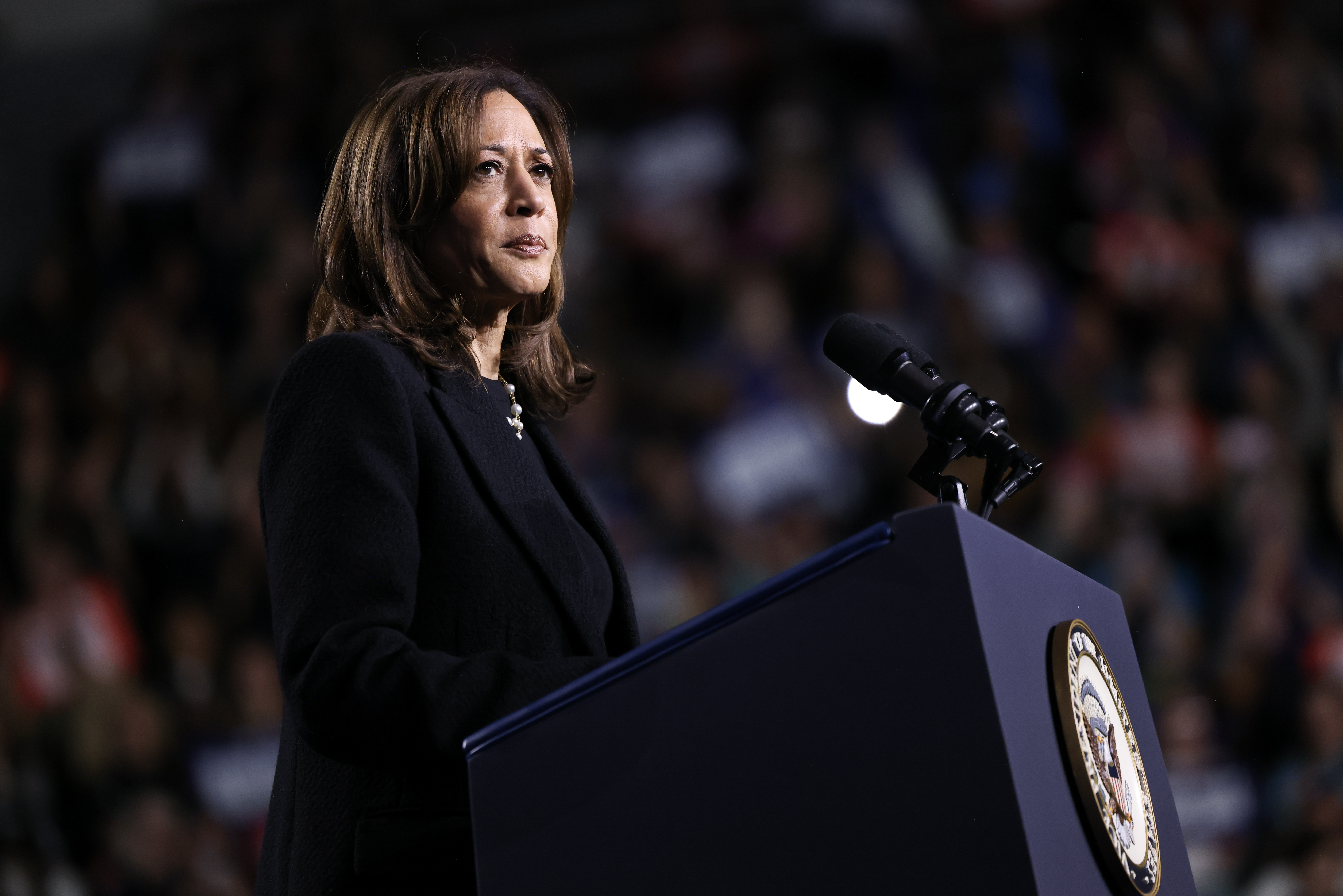
Rep. Jared Moskowitz, representing a swing district: ‘The idea that the vice president lost every swing state because she wasn’t more extreme on this issue is laughable’
"They want to make a deal, but we haven't heard those secret words, ‘We will never have a nuclear weapon,’” Trump said about Iran
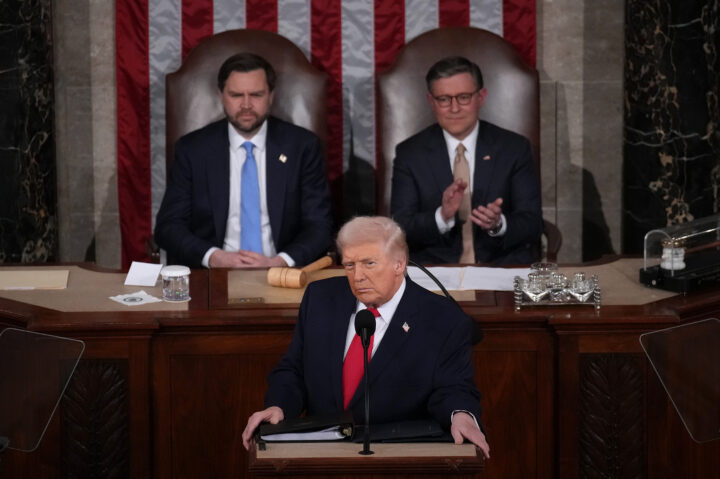
Andrew Harnik/Getty Images
U.S. President Donald Trump, with Vice President JD Vance and Speaker of the House Mike Johnson (R-LA) looking on, delivers his State of the Union address during a Joint Session of Congress at the U.S. Capitol on February 24, 2026, in Washington, DC.
In his State of the Union address Tuesday night, President Donald Trump maintained his tough talk against Iran, reiterating that he will use force to prevent Iran from getting a nuclear weapon, even though he’s willing to explore diplomatic options to resolve the standoff.
Trump did not — as some online had predicted — make a grand televised announcement of United States strikes on Iran during the speech. Nor did he elaborate further on his plans for the growing U.S. military might in the region, or what specifically would trigger the U.S. to utilize that military power.
”They want to make a deal, but we haven’t heard those secret words, ‘We will never have a nuclear weapon,’” Trump said about Iran. “My preference is to solve this problem through diplomacy. But one thing is certain, I will never allow the world’s No. 1 sponsor of terror — which they are by far — to have a nuclear weapon. Can’t let that happen.”
A number of moderate House Democrats — around a third of the Democrats in the chamber — as well as the majority of Republicans stood to applaud those comments from the president. Democrats remained largely passive through much of the rest of Trump’s speech.
Negotiations are set to resume between the U.S. and Iran in Geneva later this week.
Trump also insisted again that the U.S. had “obliterated” Iran’s nuclear program in its strikes last June, and had warned the regime in Tehran not to attempt to rebuild its weapons programs, including its nuclear program, but it has continued those efforts anyway.
“As president, I will make peace wherever I can, but I will never hesitate to confront threats to America wherever we must,” Trump said. “And no nation should ever doubt America’s resolve. We have the most powerful military on earth. … It’s really called ‘peace through strength’ and it’s been very, very effective.”
In addition to Iran’s nuclear ambitions, Trump highlighted the Islamic Republic’s manufacture of ballistic missiles, threatening U.S. allies, troops and potentially the U.S. homeland, and its sponsorship of terrorism.
“Since they seized control of that proud nation 47 years ago, the regime and its murderous proxies have spread nothing but terrorism and death and hate,” Trump said. “They’ve killed and maimed thousands of American service members and hundreds of thousands and even millions of people.”
And he again said the regime had killed 32,000 protesters during a recent wave of demonstrations, though he asserted that the U.S. had prevented the regime, through threats of retaliation, from executing “a lot of” dissidents.
Trump boasted of having ended the war between Iran and Israel last year, as well as the war in Gaza, which he said “is proceeding at a very low level — it’s just about there.” Trump offered praise to White House Special Envoy Steve Witkoff and Jared Kushner for their involvement in those negotiations, as well as Secretary of State Marco Rubio.
Rep. Rashida Tlaib (D-MI), who wore a scarf in the pattern of a keffiyeh with a Palestinian flag at its ends, shouted, “It’s a genocide” during those remarks.
Trump also highlighted the successful return of the Israeli hostages: “Believe it or not, Hamas worked along with Israel and they dug and they dug and they dug. It’s tough — it’s a tough thing to do, going through bodies all over, passing up 100 bodies sometimes for each one they found,” the president said.
Trump added that “nobody thought that was possible” to find the remains of the final hostage, Ran Gvili, but Witkoff and Kushner were able to accomplish it.
“I remember the family of the 28th [hostage of the final group that had remained in Gaza]. They were so — grieved, but they were so happy, as happy as it’s possible to be. They had their boy back,” Trump said. He emphasized that the hostage families all wanted to see the remains of deceased hostages come home “as much as though [they] were living.”
Earlier in the day, top congressional leaders received a classified briefing from the administration on Iran, and Democrats emerged urging the administration to explain its position and plans to the American people.
“It’s very serious and the president has an obligation to make his goals public,” Schumer told Jewish Insider after the briefing.
Plus, Trump says Iran won't rule out nuclear weapons
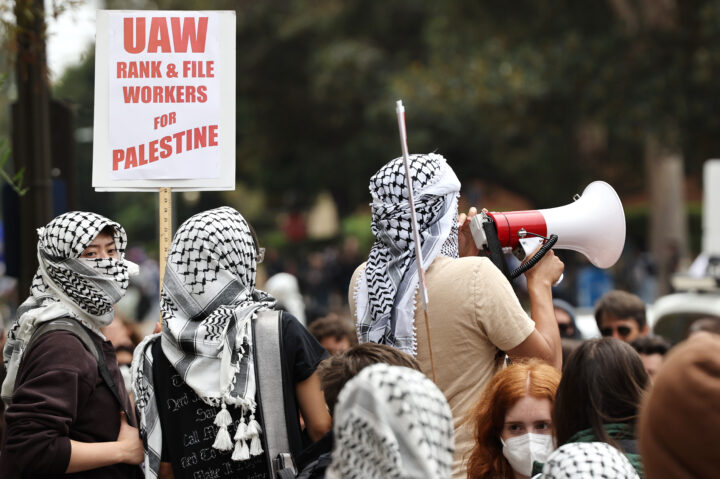
Mario Tama/Getty Images
Protestors gather after police cleared a new encampment on the UCLA campus on May 23, 2024 in Los Angeles, California.
Good Tuesday afternoon!
This P.M. edition is reserved for our premium subscribers — offering a forward-focused read on what we’re tracking now and what’s coming next.
It’s me again — Danielle Cohen-Kanik, U.S. editor at Jewish Insider and curator, along with assists from my colleagues, of the Daily Overtime. Please don’t hesitate to share your thoughts and feedback by replying to this email.
📡On Our Radar
Notable developments and interesting tidbits we’re tracking
Previewing his State of the Union address tonight, where it remains to be seen if he will make any announcements on Iran, President Donald Trump told reporters, “Iran wants to make a deal more than I do, but they just won’t say the sacred phrase: ‘We won’t build nuclear weapons,’” signaling that the two sides are still at an impasse ahead of the third round of negotiations scheduled for Thursday…
Secretary of State Marco Rubio briefed the congressional Gang of Eight, the bipartisan set of leaders advised on classified matters by the executive branch, this afternoon to provide an update on Iran, with CIA Director John Ratcliffe reportedly joining the discussion. The White House did not brief the group before striking Iran last June, drawing ire from Democrats…
Ahead of the meeting, Senate Minority Leader Chuck Schumer (D-NY) told C-SPAN about potential Iran strikes, “Closed-door briefings are fine, but the administration has to make its case to the American people on something as important as this”…
Around a dozen U.S. F-22 stealth fighter jets departed from the U.K. today to be deployed at an Israeli Air Force base in the south of the country, as over 150 aircraft are being moved to the region. Military experts told The Washington Post that the “assets being assembled are indicative of a multiday campaign without a ground invasion”…
The Coast Guard is investigating a swastika drawn at its primary recruit training center in New Jersey, where Coast Guard commandant Adm. Kevin Lunday quickly flew to address recruits and staff about the incident. Lunday recently came under fire from Congress, and had his confirmation delayed, over a change in Coast Guard policy that downgraded the swastika from a prohibited hate symbol to “potentially divisive,” which was eventually walked back.
Regarding the recent incident, Lunday said in a statement to The Washington Post, “Anyone who adheres to or advances hate or extremist ideology — get out. Leave. You don’t belong in the United States Coast Guard and we reject you”…
Rep. Brad Sherman (D-CA) is pushing for legislation to require an affirmative congressional vote prior to the U.S. reaching any nuclear deal with Saudi Arabia, Jewish Insider’s Marc Rod reports, following a notification from the administration to Congress indicating that it is moving toward a deal that could allow Riyadh to enrich uranium for civilian purposes.
The notification procedures, which do not include specific terms of a potential deal, suggest that Saudi Arabia will not be required to agree to more intrusive International Atomic Energy Agency inspections or “gold standard” safeguards — which would require Saudi Arabia to agree not to enrich or reprocess nuclear material — used for the U.S. nuclear cooperation agreement with the United Arab Emirates…
The Justice Department sued the University of California today under Title VII of the Civil Rights Act, which prohibits employment discrimination, alleging that the UCLA campus created a “hostile work environment against Jewish and Israeli faculty and staff.”
During campus anti-Israel protests in 2024, the DOJ said, “the University allowed antisemitic harassment to continue unabated for days” and “has ignored, and continues to ignore, gross and repeated violations” of time, place and manner restrictions on student protest. The department further claimed Jewish and Israeli faculty at the school have been physically threatened, ostracized, harassed, forced to take leave and assaulted…
The New York Times details efforts by New York’s business community and Democratic establishment to organize and promote the moderate wing of the party in response to New York City Mayor Zohran Mamdani’s rise to power. Some of the individuals involved, including former Gov. Andrew Cuomo allies Phil Singer and Steven Cohen, are considering forming PACs, watchdog groups, lobbying campaigns and more…
New York’s Working Families Party endorsed Brooklyn Borough President Antonio Reynoso to replace retiring Rep. Nydia Velázquez (D-NY) yesterday over Mamdani’s objections. The mayor has been backing Assemblymember Claire Valdez, who, like Mamdani, is a member of the Democratic Socialists of America and a vocal critic of Israel, and he had lobbied the WFP to endorse her or to stay out of the race. WFP’s director, Jasmine Gripper, told the Times, “At the end of the day, Zohran is an individual who gets to weigh in as an individual”…
A new poll from the University of New Hampshire found oyster farmer Graham Platner with a commanding lead among likely Senate Democratic primary voters, outdistancing Gov. Janet Mills by 34 points, with the primary less than four months away. In a general election matchup with incumbent Sen. Susan Collins (R-ME), Platner leads Collins by 11 points, while Mills and Collins are neck-and-neck…
Khalid Turaani, executive director of the Ohio branch of the Council on American-Islamic Relations (CAIR), testified at the Ohio Senate Judiciary Committee last week against a bill to codify the International Holocaust Remembrance Alliance’s working definition of antisemitism, where he claimed that Israel operates the world’s largest human skin bank and harvests the skin from deceased Palestinians. “And if I call them Nazis,” Turaani continued, “your law is going to punish me.”
The Anti-Defamation League’s Ohio River Valley office condemned Turaani’s speech, saying that the “antisemitic organ harvesting myth plays on the blood libel trope, which has spurred the torture, murder, and expulsion of Jews for centuries”…
The U.S. Embassy in Israel announced that, as part of the government’s “efforts to reach all Americans,” the embassy will be providing consular services for one day only at several locations across Israel and the West Bank, including Ramallah and the Jewish settlement of Efrat…
⏩ Tomorrow’s Agenda, Today
An early look at tomorrow’s storylines and schedule to keep you a step ahead
Keep an eye out in Jewish Insider for the highlights from President Donald Trump’s State of the Union address, taking place at 9 p.m. ET tonight, as all eyes are on possible U.S. military action against Iran.
Indian Prime Minister Narendra Modi arrives in Israel tomorrow, where he will be greeted by Prime Minister Benjamin Netanyahu before addressing the Knesset. In the evening, the two leaders will have dinner at Jerusalem’s King David Hotel. Read JI’s interview on Modi’s visit with Israeli Ambassador to India Reuven Azar.
The New York City Council will hold its first hearing on Council Speaker Julie Menin’s bill aiming to create “buffer zones” around houses of worship to protect from disruptive protests. The bill’s language was updated last night to remove the original 100-foot figure, which had reportedly emerged as a point of concern for the NYPD.
Congressional candidates from Illinois’ 9th District, where pro-Israel spending is boosting state Sen. Laura Fine and attacking Evanston Mayor Daniel Biss, will hold a debate on local news.
Stories You May Have Missed
SHIFTING STANCE
Sue Altman pivoting on Israel as she runs in safely Democratic N.J. district

The progressive activist ran as a pro-Israel candidate in a neighboring swing district, but is now walking back her support as she runs to succeed Rep. Bonnie Watson Coleman
Plus, major Dem donor calls out 'Jew hate' in party
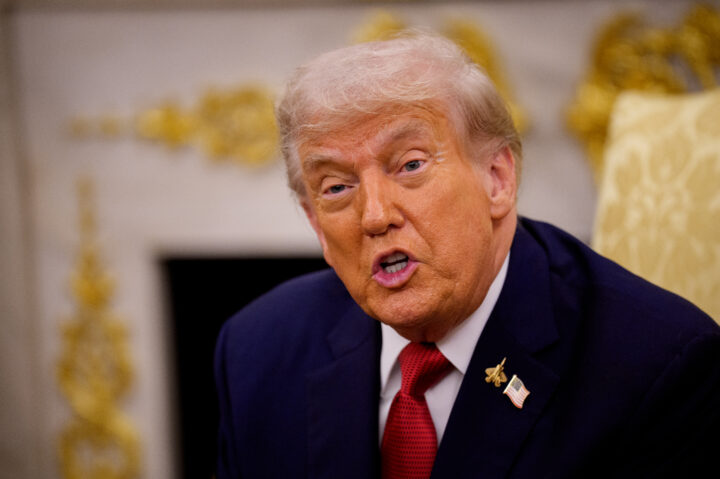
Andrew Harnik/Getty Images
President Donald Trump in the Oval Office at the White House on September 25, 2025 in Washington, DC.
Good Monday afternoon!
This P.M. edition is reserved for our premium subscribers — offering a forward-focused read on what we’re tracking now and what’s coming next.
It’s me again — Danielle Cohen-Kanik, U.S. editor at Jewish Insider and curator, along with assists from my colleagues, of the Daily Overtime. Please don’t hesitate to share your thoughts and feedback by replying to this email.
📡On Our Radar
Notable developments and interesting tidbits we’re tracking
As rumors abound about the possibility and timing of U.S. strikes on Iran, the State Department ordered the evacuation of non-essential personnel and their families from the U.S. Embassy in Beirut. “Based on our latest review, we determined it prudent to reduce our footprint,” a State official told Fox News…
Nearby, amid the buildup of U.S. military assets in the region, American refueling and cargo planes were spotted at Ben Gurion Airport…
President Donald Trump denied reports that Pentagon officials, namely Joint Chiefs of Staff Chairman Gen. Dan Caine, are raising concerns about striking Iran, writing on Truth Social this afternoon, “General Caine, like all of us, would like not to see War but, if a decision is made on going against Iran at a Military level, it is his opinion that it will be something easily won.”
“He has not spoken of not doing Iran, or even the fake limited strikes that I have been reading about, he only knows one thing, how to WIN and, if he is told to do so, he will be leading the pack,” Trump said of Caine, while alluding to the potential breadth of military action against Iran…
Secretary of State Marco Rubio pushed back his visit to Israel, originally scheduled for this weekend, to March 2, The Jerusalem Post reports, days after the next round of U.S.-Iran negotiations in Geneva on Thursday…
Sen. Chris Coons (D-DE), a leader on foreign policy among Democrats in Congress, told Jewish Insider’s Emily Jacobs that he heard “pretty stark early warning signs of some challenges where core allies do not share our priorities” on a potential Iran strike during his recent trip t0 Europe, which included stops at the Munich Security Conference, along with meetings in Ukraine and Moldova with top European diplomats.
Coons laid out what he hopes to see from the president: “A) Consult Congress. B) Make a case to the American people about why this is in our national security interest. C) Clarify what on earth he’s planning with this Board of Peace … And D) If he’s going to work with close allies to ramp up pressure to try and achieve something at the negotiating table, he should work with close allies”…
Anthony Driver Jr., a union organizer and candidate in Illinois’ 7th Congressional District, doubled down on his recent repudiation of AIPAC, despite previously having little public record on Israel policy issues. Following a press conference last week where Driver, who is running against AIPAC-backed Chicago Treasurer Melissa Conyears-Ervin, denounced the pro-Israel group, he returned donations from major Democratic Party donor Michael Sacks over the finance executive’s ties to AIPAC.
Sacks, who was a major backer of former President Barack Obama and former Chicago Mayor Rahm Emanuel, said in his reply, “It is truly sad there is so much anti Israel sentiment and outright Jew hate that Anthony found himself in this position. I can only hope that the electorate rejects hate in all forms”…
As more details emerge about Rep. Tony Gonzales’ (R-TX) alleged affair with a staffer who later committed suicide, a poll commissioned by the campaign of Brandon Herrera, Gonzales’ opponent, shows the congressman trailing Herrera by a whopping 24 points among likely GOP primary voters. The story, which entered the news cycle right as early voting kicked off, could catapult Herrera, a social media influencer with a history of antisemitism, to the Republican nomination and on to Congress…
Investigators at the cryptocurrency giant Binance found last year that about $1.7 billion had been sent from two accounts to Iranian entities with links to terror groups, The New York Times reports, even after Binance pleaded guilty to violating anti-money laundering laws in 2023 and vowed to prevent sanctioned actors from accessing its platform. Trump pardoned Binance founder Changpeng Zhao, who was jailed for his role in the saga, in October 2025…
The Atlanta Jewish Film Festival backtracked in its defense of a juror selected for a judging panel who had posted antisemitic and anti-Israel content online, whom it had stood behind even after the Israeli Consulate in Atlanta announced it was withdrawing its funding and support of the event over the pick.
The festival changed its tune yesterday, saying it is “first and foremost, a Jewish institution” and has “a responsibility, particularly at this fraught time, to stand firmly against antisemitism and to affirm the Jewish people’s right to self-determination.” It said it would review its “organizational processes and policies, including those related to antisemitism, BDS, and cultural boycotts”…
The French Foreign Ministry has moved to block U.S. Ambassador to France Charles Kushner’s access to government officials after he declined to appear for a summons by Foreign Minister Jean-Noël Barrot today, which was issued after the U.S. Embassy reposted comments by Trump about a far-right French activist who was killed in a clash with far-left protesters. It was Kushner’s second summons, after his first last year when he accused the French government of not adequately combating antisemitism…
⏩ Tomorrow’s Agenda, Today
An early look at tomorrow’s storylines and schedule to keep you a step ahead
Keep an eye out in Jewish Insider for a look at Sue Altman’s shifting views on Israel as the formerly pro-Israel congressional candidate is now running in New Jersey’s more heavily Democratic 12th Congressional District.
We’ll be watching for mention of President Donald Trump’s thinking on Iran as he delivers the annual State of the Union address tomorrow night. Virginia Gov. Abigail Spanberger will deliver the Democratic response.
The House Foreign Affairs Committee will hold a hearing on “advancing national security through commercial diplomacy” with Jacob Helberg, under secretary of state for economic affairs, who recently told JI that he hopes the Pax Silica initiative, which he leads, “will pave the way for peace and economic integration” in the Middle East.
Australia’s royal commission on antisemitism, formed after the Hanukkah terror attack at Sydney’s Bondi Beach, will hold its first public hearing, though no testimony or evidence will be heard.
Stories You May Have Missed
OVERTON WINDOW
Jewish Democrats alarmed about whether their party will remain welcoming
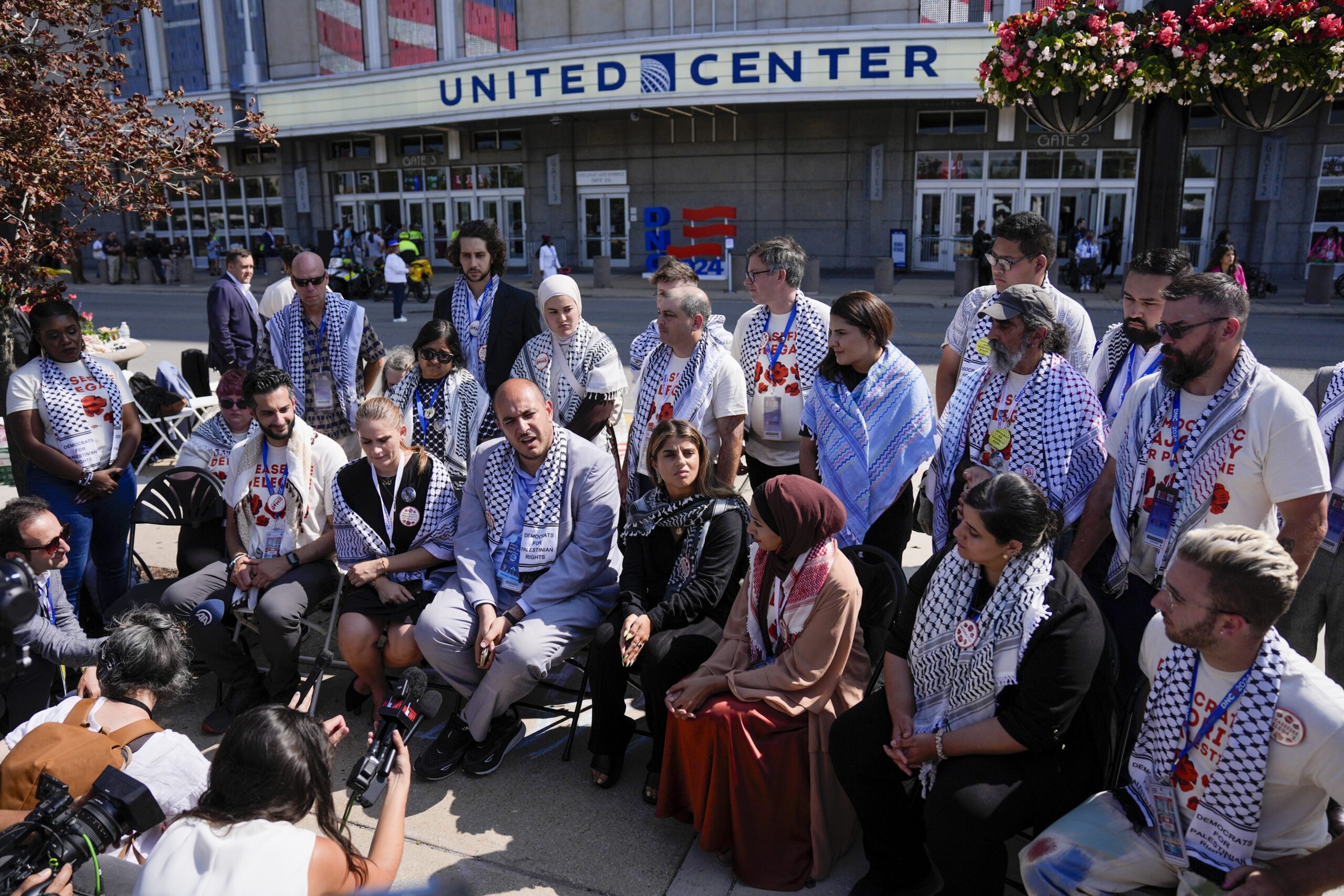
Former Democratic Rep. Kathy Manning: ‘There is no doubt that we are living through very difficult times for American Jews’
The Delaware senator holds a unique place in the Democratic Party, rising to leadership roles while continuing to champion Biden-era foreign policy
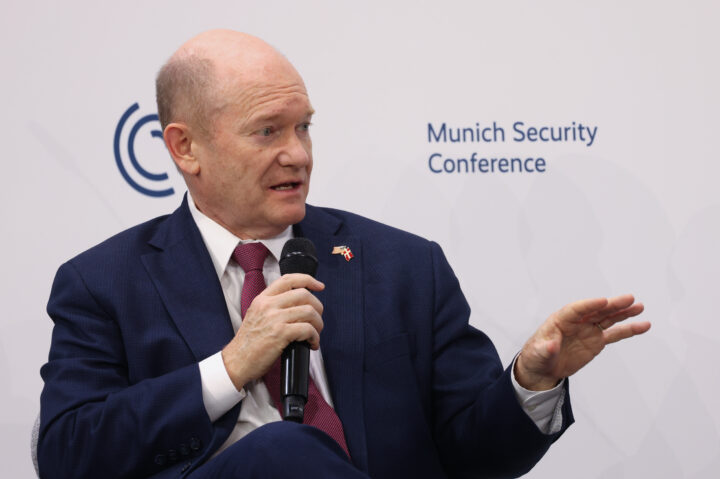
Alex Kraus/Bloomberg via Getty Images
Senator Chris Coons, a Democrat from Delaware, at the Munich Security Conference in Munich, Germany, on Saturday, Feb. 14, 2026.
Sen. Chris Coons (D-DE), one of the leading foreign policy voices in the Democratic Party’s moderate wing, expressed concern over the weekend that any White House decision to move ahead with military action against Iran would deeply alienate leading European allies of the United States.
“There are pretty stark early warning signs of some challenges where core allies do not share our priorities,” Coons told Jewish Insider following a weeklong trip to Europe, which included stops at the Munich Security Conference, along with meetings in Ukraine and Moldova with top European diplomats.
“It leaves me genuinely concerned that if Trump goes ahead with a strike against Iran, it is not going to enjoy support from any of our core allies,” he continued. “That will make it harder, and it may deepen this growing challenge for us.”
Asked how he would like to see the Trump administration address the Iranian regime’s violent crackdown on protesters and its nuclear program, Coons urged the president to work with close allies to “ramp up pressure” on Tehran and explain his approach to the public. The Delaware senator also encouraged Trump to include Congress in his deliberations.
“A) Consult Congress. B) Make a case to the American people about why this is in our national security interest,” Coons said. “C) Clarify what on earth he’s planning with this Board of Peace, which just launched with a massive pledge from the United States that none of us had heard of before he announced it,” he said, ostensibly referring to the $10 billion financial commitment Trump made to Gaza’s reconstruction. “And D) If he’s going to work with close allies to ramp up pressure to try and achieve something at the negotiating table, he should work with close allies.”
“He shouldn’t just fire off a bunch of missiles and assume that that’s going to be enough to achieve the result he wants,” he added.
Coons also highlighted growing transatlantic tensions over potential U.S. military action against Iran during discussions with European officials, who expressed worries about a brewing U.S.-U.K. dispute tied to the Chagos Islands.
The remote British Indian Ocean Territory is at the center of a 2025 agreement in which the U.K. agreed to transfer sovereignty of the island chain to Mauritius while securing a 99- or 100-year lease for the strategic Diego Garcia military base, a joint U.S.-U.K. facility long used by American forces.
The Trump administration initially signaled support for the deal, with the State Department affirming it last Tuesday. But one day later, President Donald Trump publicly urged Prime Minister Keir Starmer to scrap the arrangement and retain full control of the “strategically located” base, warning it could be needed if diplomacy with Iran fails.
The Times of London reported Thursday that the British government had informed Washington that week it would not permit U.S. strikes on Iran from Diego Garcia or the Royal Air Force’s Fairford station, which houses U.S. Air Force troops, in England.
Coons called the U.K.’s stance “striking.”
Coons plays a unique role in today’s Democratic Party. He sits in the Senate seat held by former President Joe Biden for 36 years, and the two Delaware Democrats have a relationship that dates back four decades.
In addition to being the ranking member on Defense Appropriations, the panel responsible for Pentagon funding, Coons is next in line to succeed retiring Sen. Jeanne Shaheen (D-NH) as the top Democrat on the Senate Foreign Relations Committee, a role Biden held in the early 2000s. The Delaware senator remains Biden’s most ardent defender in politics following his exit from public life, and continues to advocate in his role as a senior Democrat in Congress for the traditional foreign policy views the two men have long shared.
He does so against the backdrop of the ongoing debate among Democrats about the future direction of the party, on foreign policy and otherwise, in the post-Biden era.
Alongside Coons in Munich were a handful of prominent Democrats believed to be considering presidential runs in 2028, including Rep. Alexandria Ocasio-Cortez (D-NY), Sens. Chris Murphy (D-CT), Ruben Gallego (D-AZ), Mark Kelly (D-AZ) and Elissa Slotkin (D-MI). Govs. Gretchen Whitmer of Michigan and Gavin Newsom of California and former Commerce Secretary Gina Raimondo.
Among the possible presidential hopefuls, Ocasio-Cortez and Whitmer were criticized for being unprepared for the conference after struggling to answer questions on U.S. policy toward China and Ukraine. Meanwhile, Murphy and Ocasio-Cortez separately accused Israel of committing genocide in Gaza — appealing to a left-wing base that has made criticism of the Jewish state central to its foreign policy.
Ocasio-Cortez later griped to The New York Times that her gaffes and perceived presidential ambitions overshadowed the message she was attempting to deliver on a major foreign policy stage.
Asked about the large presence of potential Democratic presidential candidates in Munich, Coons joked that he was “announcing my 2028 candidacy” before crediting his fellow Democrats for engaging closely on foreign policy issues.
“The reality is that over the last several cycles, I’ve been very encouraged to see governors, senators, former cabinet officials who are likely future presidential candidates invest the time in coming to Munich, coming to Davos, going to Halifax, going to Australia, because the threat environment for all of our countries has become more serious and more real,” Coons said.
Coons also expressed concern about the hefty $850 billion budget for the Pentagon in the upcoming fiscal year, noting the significantly increased funding is “a breathtaking amount of money, and there is a lot of skepticism on the part of Americans that it’s being well spent.”
“The average American needs to see good jobs and innovation coming out of this massive defense investment. If we focus only on buying American and only on American jobs, we will lose tactically, we will lose strategically, we will lose politically. To the extent we align together, there is a strong future for all of our countries as democracies to meet this moment and to deliver the innovation that this threat environment absolutely demands,” Coons said.
Plus, Trump's kind words for Qatari PM
Alex Wong/Getty Images
A visitor holds an AIPAC folder in an elevator in Rayburn House Office Building on March 12, 2024 on Capitol Hill in Washington, DC.
Good Thursday afternoon!
This P.M. edition is reserved for our premium subscribers — offering a forward-focused read on what we’re tracking now and what’s coming next.
It’s me again — Danielle Cohen-Kanik, U.S. editor at Jewish Insider and curator, along with assists from my colleagues, of the Daily Overtime. Please don’t hesitate to share your thoughts and feedback by replying to this email.
📡On Our Radar
Notable developments and interesting tidbits we’re tracking
President Donald Trump used the occasion of the first meeting of the Board of Peace in Washington today to announce significant monetary and troop commitments from the U.S. and other countries to stabilize Gaza, as well as lay out a timeline for military action against Iran, Jewish Insider’s Matthew Shea reports.
The pledges included $10 billion from the U.S. and $7 billion from several Middle Eastern countries for Gaza’s reconstruction, as well as commitments to provide troops and police to the U.S.-led International Stabilization Force. (The Guardian reports the White House is currently exploring plans to build a 5,000-person military base to house the ISF in southern Gaza.)
On Iran negotiations, Trump said in his remarks, “Now we may have to take it a step further or we may not. Maybe we are going to make a deal [with Iran]. You are going to be finding out over the next probably 10 days.”
He later told reporters on Air Force One, “Ten, 15 days, pretty much maximum.” Remember: Last June, Trump said he would decide whether to take action against Iran within two weeks, and carried out strikes on Iranian nuclear facilities two days later…
U.K. Prime Minister Keir Starmer has reportedly not given approval to Washington to use the joint U.S.-U.K. base on Diego Garcia island for a strike on Iran, as Trump said yesterday he is considering. London is concerned that a U.S. strike from the shared base, which the U.K. must grant permission to use, could implicate it in violating international law…
Trump also offered praise for Qatar’s prime minister, Sheikh Mohammed bin Abdulrahman Al Thani, during his Board of Peace remarks, despite widespread criticism of Doha’s backing of Hamas and platforming of anti-Israel actors.
“His excellency, Prime Minister Al Thani of Qatar, just a great and highly respected man,” Trump said. “I always say he needs a public relations agency because you do so much good, and they have you down as evil, and you’re not evil. You help us so much and you’re such a good ally”…
Meanwhile, Hamas is entrenching itself further in Gaza, repositioning its loyalists in government and paying salaries across the enclave, according to Reuters. Hamas has said it is willing to hand power over to the Palestinian technocratic committee established by the U.S. and led by former Palestinian Authority official Ali Shaath, but as one Palestinian source told the outlet, “Shaath may have the key to the car, and he may even be allowed to drive, but it is a Hamas car”…
Former Rep. Tom Malinowski (D-NJ), who recently lost the Democratic primary for New Jersey’s 11th Congressional District, called AIPAC’s attacks against him in the race “bizarre in several ways,” writing in an op-ed today that he has “no problem identifying as a Zionist” and calling on Democratic leaders to collectively “refuse [AIPAC’s] support, instead of letting it pick off candidates one by one”…
Rep. Jan Schakowsky (D-IL) withdrew her endorsement of Cook County Commissioner Donna Miller, the front-runner in Illinois’ 2nd District Democratic primary, over Miller’s backing by groups that are reported to be affiliated with AIPAC, though the pro-Israel group hasn’t endorsed her and neither AIPAC nor its super PAC are publicly spending any money in the district.
“Illinois deserves leaders who put voters first, not AIPAC or out-of-state Trump donors,” Schakowsky told the Chicago Sun-Times. “I cannot support any candidate running for Congress who is funded by these outside interests”…
Ahead of a hearing next week on New York City Council Speaker Julie Menin’s proposed 100-foot ban on protests around houses of worship, Mayor Zohran Mamdani said today that he had the NYPD review the legality of the measure, “and I can tell you, my police commissioner has expressed concerns about that proposal”…
Three officials appointed by Mamdani to administration posts are co-founders of a group that blamed Israel for the Oct. 7 Hamas attacks two days after they took place, the Washington Free Beacon reports.
The group, the Muslim Democratic Club of New York (MDCNY), was founded by Faiza Ali, now commissioner of the Mayor’s Office of Immigrant Affairs; Aliya Latif, now executive director of the mayor’s Office of Faith-Based Partnerships; Ali Najmi, tapped as chair of the mayor’s Advisory Committee on the Judiciary; and anti-Israel activist Linda Sarsour.
On Oct. 9, 2023, the MDCNY posted on X, “Many NYers are feeling pain, fear, and anger after the horrific events in the Holy Land this weekend. Especially as the Israeli apartheid regime have forced millions of Palestinians in Gaza to live under occupation for decades and an open air prison since 2007.” The group went on to condemn “elected officials offering support for Israeli occupation’s rampant violence as it openly declares & enacts its intent to engage in mass violence and genocide against Palestinians,” well before Israel’s ground invasion of Gaza had begun…
The Forward profiles Los Angeles City Councilmember Nithya Raman as she runs for mayor with a unique ideology: Raman is a member of the Democratic Socialists of America, but has also been vocally supportive of Israel. She called DSA’s statement blaming Israel for the Oct. 7 attacks “unacceptably devoid of sympathy” and rejects the BDS movement, but was also condemned by the local Jewish community for introducing a ceasefire resolution in June 2023…
⏩ Tomorrow’s Agenda, Today
An early look at tomorrow’s storylines and schedule to keep you a step ahead
Keep an eye out in Jewish Insider for a preview of the AIPAC Congressional Summit, which is kicking off Sunday amid the group’s increasing involvement in midterm election races.
President Donald Trump is expected to meet with governors at the White House tomorrow, though the meeting will no longer be held under the auspices of the National Governors Association, as is done annually, after the White House declined to invite Democratic Govs. Jared Polis of Colorado and Wes Moore of Maryland to a black-tie dinner on Saturday.
We’ll be back in your inbox with the Daily Overtime on Monday. Shabbat Shalom!
Stories You May Have Missed
FULOP’S FIGHT
Former Jersey City Mayor Steve Fulop brings the fight against antisemitism to NYC’s business community
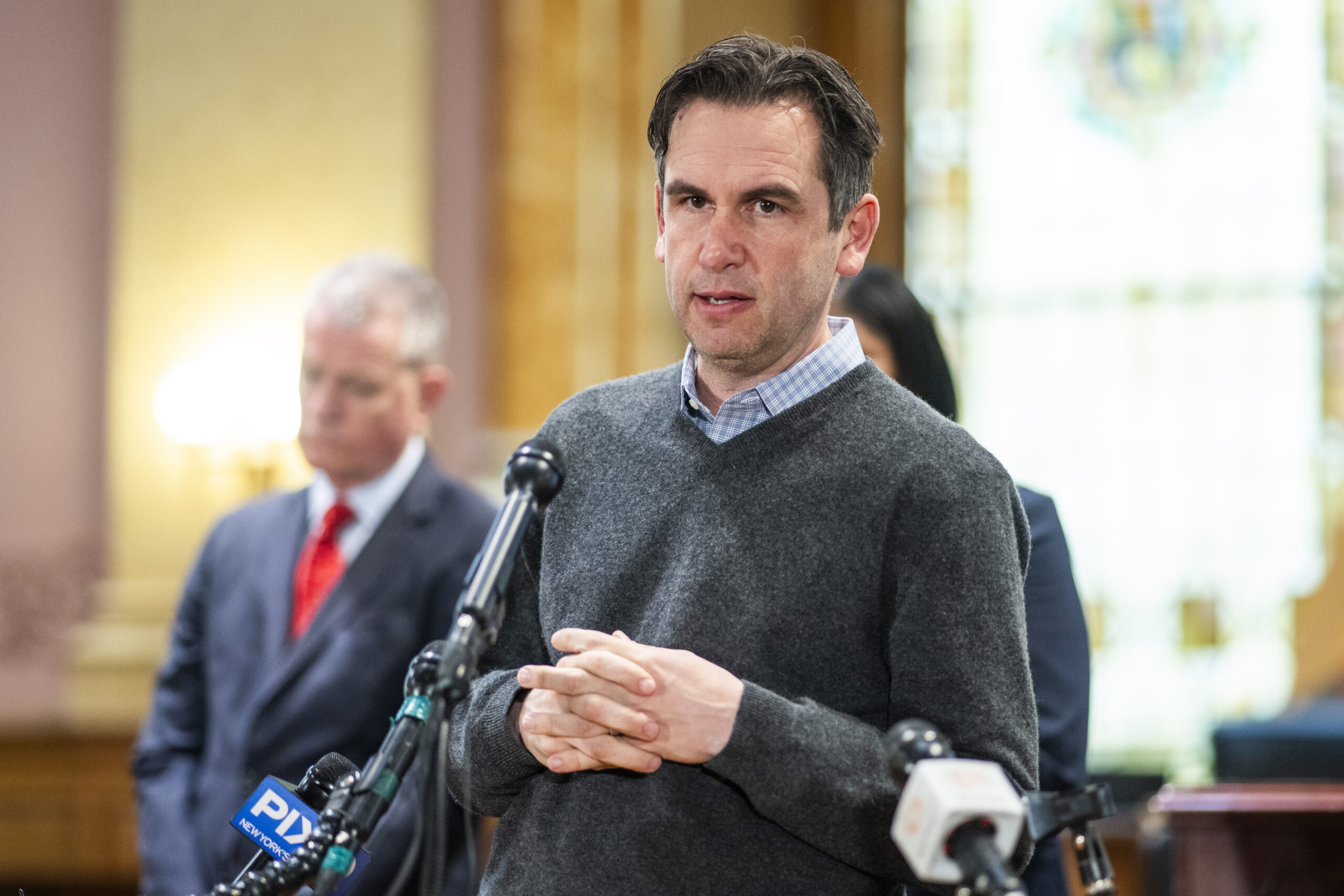
As the new head of NYC’s leading business advocacy group, Fulop said he’s preparing for ‘this experiment of what it means to be an executive in a DSA world’
Plus, Sen. Graham reports MBZ is alive and well

Mass Communication Specialist 3rd Class Amber Smalley/U.S. Navy via Getty Images
Flight deck of the Nimitz-class aircraft carrier USS Abraham Lincoln (CVN 72) May 10, 2019 in the Red Sea.
Good Wednesday afternoon!
This P.M. edition is reserved for our premium subscribers — offering a forward-focused read on what we’re tracking now and what’s coming next.
It’s me again — Danielle Cohen-Kanik, U.S. editor at Jewish Insider and curator, along with assists from my colleagues, of the Daily Overtime. Please don’t hesitate to share your thoughts and feedback by replying to this email.
📡On Our Radar
Notable developments and interesting tidbits we’re tracking
President Donald Trump warned U.K. Prime Minister Keir Starmer not to relinquish control over Diego Garcia — an island in the Indian Ocean that hosts a joint U.S.-U.K. base, as the U.K. plans to transfer sovereignty of the larger island chain to Mauritius, while maintaining a 99-year lease on the base — because it may act as the launching pad for a U.S. strike on Iran.
“Should Iran decide not to make a Deal, it may be necessary for the United States to use Diego Garcia, and the Airfield located in Fairford, in order to eradicate a potential attack by a highly unstable and dangerous Regime — An attack that would potentially be made on the United Kingdom, as well as other friendly countries,” Trump wrote on Truth Social…
Iran is also signaling its readiness for military conflict, The Wall Street Journal reports, including deploying Islamic Revolutionary Guard Corps naval units to the Strait of Hormuz, launching cruise missiles along the coast, conducting a military exercise with a Russian warship near the USS Abraham Lincoln, testing air defense systems, hardening nuclear sites and cracking down once more on dissidents…
Israel, meanwhile, is preparing for its civilian infrastructure to be “a central arena” in a potential U.S.-Iran conflict, Jewish Insider’s Lahav Harkov reports, as Home Front Command chief Maj.-Gen. Shay Klapper told the Knesset Foreign Affairs and Defense Committee today. Committee Chairman Boaz Bismuth said, “There is not one [Israeli] who doesn’t ask himself several times a day when there will be a campaign against Iran. The entire population and home front are preparing”…
Sen. Lindsey Graham (R-SC) dispelled rumors, seemingly spread by Saudi media, that UAE President Sheikh Mohamed bin Zayed was ill or even dying after meeting with him in Abu Dhabi today: “Not only is he alive, but he is also well and as sharp as I’ve ever seen him. To those powers that feel the need to attack MbZ and the UAE for doing the right thing — you do so at your own peril,” Graham said on X.
He also called MBZ’s decision to join the Abraham Accords and “to try to integrate the region with the whole world … one of the most consequential decisions any Middle Eastern leader has made.” Graham is now headed to Saudi Arabia where he will meet with Crown Prince Mohammed bin Salman, whom he recently told publicly to “knock it off” regarding the kingdom’s destabilizing activities in the region…
Democratic Texas state Rep. James Talarico raised $2.5 million in donations for his Senate campaign in the 24 hours after his interview on Stephen Colbert’s late-night show was reportedly quashed by CBS, Politico reports, as early voting in Texas kicked off yesterday ahead of the March 3 primary.
CBS denied it had banned the interview, saying Colbert’s show “was provided legal guidance that the broadcast could trigger the FCC equal-time rule for two other candidates, including Rep. Jasmine Crockett, and presented options for how the equal time for other candidates could be fulfilled,” which Colbert derided as a statement “written by — and I’m guessing for — lawyers”…
On the GOP side of the Texas Senate ballot, Attorney General Ken Paxton looks like the front-runner in his hotly contested primary against incumbent Sen. John Cornyn (R-TX) and Rep. Wesley Hunt (R-TX), despite the GOP establishment spending more than $60 million in attack ads against Paxton, Punchbowl News reports. (And the infighting goes further: Hunt said yesterday he filed criminal charges against a senior member of Cornyn’s campaign team for allegedly doxxing a member of his family.)
Trump told reporters last night that he still hadn’t decided which of the GOP candidates, if any, to endorse, saying, “I like all three of them actually. Those are the toughest races. They’ve all supported me. They’re all good. You’re supposed to pick one, so we’ll see what happens. But I support all three”…
Democratic Virginia state Del. Dan Helmer, a key architect of the state’s current redistricting effort, plans to enter the race for the 7th Congressional District that will be created if state voters approve a constitutional amendment to allow redistricting to proceed.
Helmer, who is Jewish and the son of an Israeli immigrant, ran for the state’s 10th District in 2024 on a staunchly pro-Israel platform, telling JI at the time that calls for conditions on U.S. aid to Israel are “incredibly frustrating.” He became the target of late-stage ad campaigns, which their backers insisted to JI were unrelated to his support for Israel, and ultimately came in second in the Democratic primary…
Humain, Saudi Arabia’s state-sponsored AI company, invested $3 billion in Elon Musk’s xAI, the company announced today. The investment came just before Musk combined xAI with his SpaceX aerospace company, giving the Saudi firm a significant stake in the major U.S. government contractor…
⏩ Tomorrow’s Agenda, Today
An early look at tomorrow’s storylines and schedule to keep you a step ahead
Keep an eye out in Jewish Insider for a look at how the emerging scandal involving Rep. Tony Gonzales (R-TX) — whom the San Antonio Express News confirmed yesterday was engaged in an extramarital affair with a staffer who committed suicide — could catapult an anti-Israel Republican, who has posted videos featuring Nazi imagery, to Congress.
Our focus tomorrow will be the first meeting of the Board of Peace, which will bring several heads of state and senior ministers, including Israeli Foreign Minister Gideon Sa’ar, to Washington. Read JI’s preview of the meeting.
Jewish Federations of North America CEO Eric Fingerhut will deliver what JFNA is calling the first “State of the Jewish Union Address,” ahead of the president’s State of the Union next week, from the organization’s Washington headquarters.
The U.S. Commission on Civil Rights will hold a daylong hearing on antisemitism on college campuses, featuring legal experts, former administration officials, students and Jewish communal leaders, which include Amy Spitalnick, CEO of the Jewish Council for Public Affairs; Kenneth Marcus, founder and CEO of the Louis D. Brandeis Center; Erin Beiner, J Street U director; and Kevin Rachlin, Washington director of The Nexus Project.
Stories You May Have Missed
MONIKER MEANING
Anger at ‘Epstein class’ bleeds into conspiratorial finger-pointing

Follow the language to its most extreme end, and what emerges is undiluted antisemitism
Plus, Belgium's mohel madness

Jim Watson - Pool/Getty Images
U.S. Vice President JD Vance gives remarks following a roundtable discussion with local leaders and community members amid a surge of federal immigration authorities in the area, at Royalston Square on January 22, 2026 in Minneapolis, Minnesota.
Good Tuesday afternoon!
This P.M. edition is reserved for our premium subscribers — offering a forward-focused read on what we’re tracking now and what’s coming next.
It’s me again — Danielle Cohen-Kanik, U.S. editor at Jewish Insider and curator, along with assists from my colleagues, of the Daily Overtime. Please don’t hesitate to share your thoughts and feedback by replying to this email.
📡On Our Radar
Notable developments and interesting tidbits we’re tracking
As the second round of U.S.-Iran negotiations wrapped up in Geneva this morning, Iranian Foreign Minister Abbas Araghchi told state media that the parties reached a “general understanding on a set of guiding principles” and will “begin working on the text of a potential agreement.”
A U.S. official sounded a more reserved note, telling Axios the talks “made progress” but “there are still a lot of details to discuss.” Iranian officials are expected to present proposals in the next two weeks “to address some of the open gaps in our positions,” the official said.
Vice President JD Vance said on Fox News this afternoon that “the United States has certain red lines. Our primary interest here is we don’t want Iran to get a nuclear weapon. We don’t want nuclear proliferation.”
On today’s negotiations, Vance explained, “in some ways it went well — they agreed to meet afterwards — but in some ways it was very clear that the president has set some red lines that the Iranians are not yet willing to actually acknowledge and work through.”
Ayatollah Ali Khamenei, Iran’s supreme leader, demonstrated that unwillingness, posting on X as talks were underway that if the U.S. insists on prohibiting Iran from enriching uranium “there is no room for negotiation.” As the U.S. sends more military assets to the region, he also threatened to “send that [U.S.] warship to the bottom of the sea”…
New York City Mayor Zohran Mamdani tapped Faiza Ali as commissioner of the Mayor’s Office of Immigrant Affairs today, elevating the longtime activist with ties to the Council on American-Islamic Relations and anti-Israel activist Linda Sarsour. Ali previously served as the community affairs director for CAIR’s New York chapter, and she and Sarsour have co-led Muslim advocacy efforts, including being arrested together in 2017…
Several Chicago-era endorsees of the Congressional Progressive Caucus PAC — Evanston Mayor Daniel Biss, union organizer Anthony Driver Jr., state Sen. Robert Peters and activist Junaid Ahmed — held a joint press conference today slamming AIPAC as a “pro-Trump, right-wing aligned organization” that “is rooted and based in lobbying for this right-wing Israeli government.”
Driver, a candidate in the 7th District who was just endorsed by the CPC PAC today and has not previously spoken at length about his position on Israel, said, “AIPAC is not your friend. … They are in the business of buying elections”…
U.S. Ambassador to Belgium Bill White was summoned to a meeting with Belgian Foreign Minister Maxime Prévot today after White accused the country in a series of heated social media posts of a “RIDICULOUS AND ANTI SEMITIC ‘PROSECUTION’” of three mohels who are being charged with practicing medicine without a license.
Prévot said White’s posts “and interference in judicial matters violate basic diplomatic norms” and denied accusations of antisemitism, while Ambassador Yehuda Kaploun, the State Department’s antisemitism envoy, concurred with White…
Sen. Mark Kelly (D-AZ) told BBC “Newsnight” yesterday that he will “seriously consider” a presidential run in 2028 “because we’re in some seriously challenging times.” The former astronaut, who has recently been the target of the White House’s ire over a video in which he and fellow veterans urged servicemembers to refuse illegal orders, touted his military experience and engineering certifications as part of his pitch…
Texas state Rep. James Talarico, running in a competitive primary for U.S. Senate against Rep. Jasmine Crockett (D-TX), shared an interview he conducted with late-night host Stephen Colbert that CBS declined to run.
Colbert said in his show’s opening remarks last night that the clip would not be broadcast because “we were told in no uncertain terms by our network’s lawyers, who called us directly, that we could not have [Talarico] on the broadcast,” claiming the network was threatened by the Federal Communications Commission…
Eric Trump has invested in Israeli drone maker Xtend as part of a $1.5 billion deal in which the company, which already has a multimillion-dollar contract with the Pentagon, is merging with a Florida construction firm. Xtend was also selected this month by the Department of Defense as one of 25 companies participating in its “Drone Dominance Program”…
Tricia McLaughlin, Homeland Security Secretary Kristi Noem’s spokesperson, is leaving her post next week, Politico reports, after becoming one of the most vocal defenders of the Trump administration’s deportation efforts…
Warner Bros. Discovery announced today it will restart talks with Paramount after initially rejecting the company’s hostile takeover bid in favor of its current agreement with Netflix. Paramount has since increased its nearly $78 billion all-cash offer, including paying the $2.8 billion termination fee Warner will owe Netflix if their deal falls through…
⏩ Tomorrow’s Agenda, Today
An early look at tomorrow’s storylines and schedule to keep you a step ahead
Keep an eye out in Jewish Insider for an interview with Steven Fulop, the former Jersey City mayor who is making a priority of countering antisemitism in his new role as the head of New York City’s business advocacy group.
The International Federation of Social Workers will hold a vote on a contentious effort to expel the Israeli Union of Social Workers, after some European members complained that Israeli social workers had served in combat roles during Israel’s war against Hamas in Gaza — a move that the U.S.-based National Association of Social Workers unexpectedly said today it resoundingly opposes.
U.S. Ambassador to Israel Mike Huckabee will sit down with Tucker Carlson in Jerusalem for an episode of the commentator’s podcast, as the two have been at loggerheads over Carlson’s repeated criticisms of Israel.
The Kigali Forum, a conference bringing together policy leaders and think tanks from the United States, Africa and Israel to discuss “the new Middle East,” will take place in Kigali, Rwanda.
The trial of the man accused of killing Paul Kessler, a Jewish man who was beaten and died during rival pro- and anti-Israel protests in the Los Angeles area in November 2023, is set to begin in Ventura County Superior Court.
Stories You May Have Missed
ENVOY ISSUES
Lawmakers alarmed by Barrack’s Turkey tilt in his Middle East diplomacy
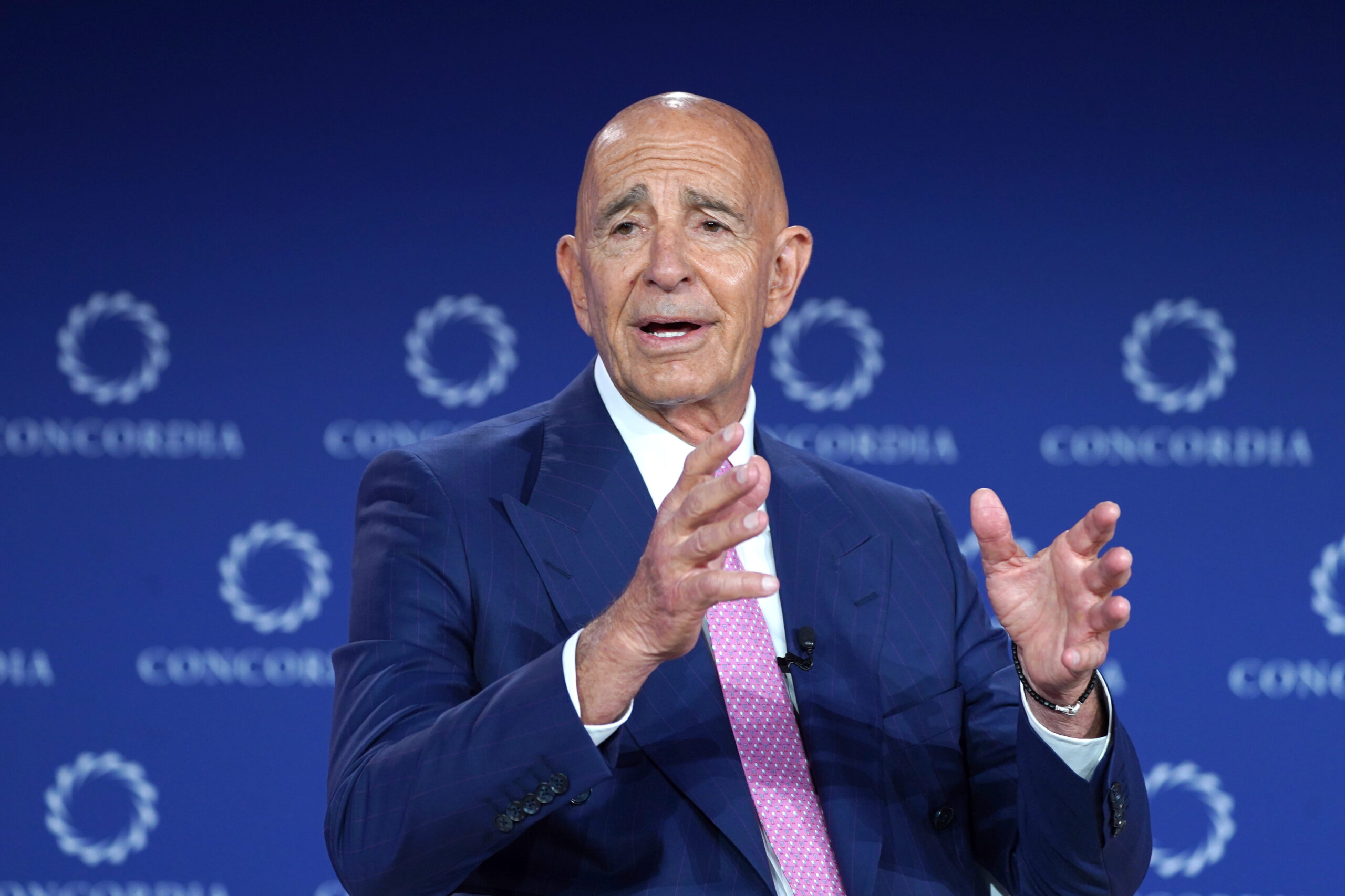
Barrack, the U.S. ambassador to Turkey, plays an outsized role in setting foreign policy in the region, lawmakers and experts say
Graham said Trump told him there’s ‘no light’ between Trump and Netanyahu
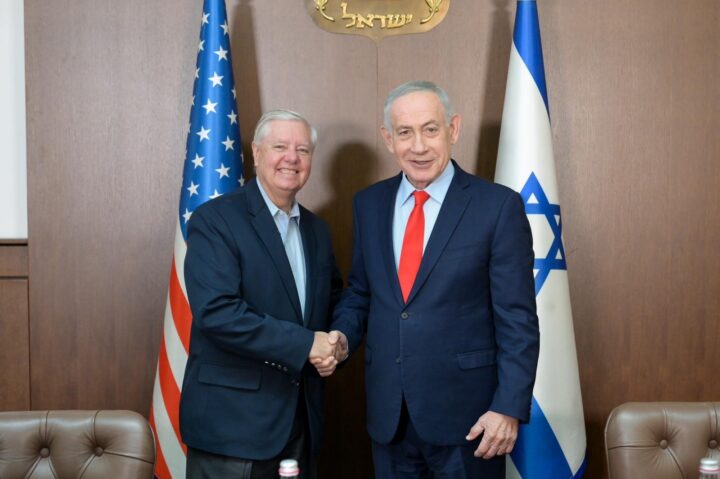
Maayan Toaff/GPO
Sen. Lindsey Graham (R-SC) meets Israeli Prime Minister Benjamin Netanyahu in Jerusalem.
The Iranian regime may fall within weeks, Sen. Lindsey Graham (R-SC) said during a press conference in Tel Aviv on Monday.
“We’re on the verge of eliminating the greatest state sponsor of terrorism in the region,” Graham said. “We’re in for weeks, not months.”
“President Trump is very good at making sure people don’t play him by giving them deadlines. I think you may see that now with Iran,” he added.
Graham said that President Donald Trump is pursuing diplomacy “to find a way to end this regime diplomatically that will advance our national security interests,” while leaving the military option open.
“I think President Trump is looking to see which line will catch the biggest fish,” he added.
Trump and Israeli Prime Minister Benjamin Netanyahu are in total agreement about how to proceed to weaken the Iranian regime, Graham said.
“There is no light between President Trump and Bibi about what to do and how to do it,” Graham said, later adding: “That’s what the president told me.”
After their meeting at the White House last week, Netanyahu characterized Trump’s assessment of Iran negotiations as overly optimistic of the regime’s intentions, saying, “The president thinks the Iranians understand who they’re dealing with. He thinks the conditions he is setting, combined with their understanding that they made a mistake last time not reaching a deal, could bring them to agree to conditions that will allow a good deal to be reached.”
But Netanyahu’s own view was more reserved: “I do not hide my general skepticism about the possibility of any deal with Iran.”
Graham called on the U.S. to “meet the moment” to topple the regime in Tehran.
The senator said both that he is “hopeful that diplomacy may prevail yet,” but when asked if he thinks a diplomatic solution is possible, he noted that Iran is “prone to cheat,” and that “based on the past, no,” but he is willing to give it a chance.
He pointed out that the military option is still on the table and that “the [USS] Gerald Ford [aircraft carrier] is steaming this way. I don’t think they’re just going for better weather.”
“In the coming weeks, if we can’t find a diplomatic solution, we will engage in the great endeavor of supporting the Iranian people, demanding their freedom and the end of their oppression,” he stated.
To reach that goal, Graham said, “we have military capability second to none. There’s no more clever nation than Israel and no more powerful nation than the United States.”
Asked if he thinks a military solution could actually bring about the end of the regime, Graham said that the Iranian regime is “weak” and “will collapse with sustained pressure,” and noted that their Air Force flies planes “from the 80s.”
“To anybody who believes the ayatollah can withstand all of this — you’re wrong,” he said.
Graham said the way to topple the regime militarily is to “kill the people who do the killing and see if the next guy wants to volunteer. … To those who want to appease: It never works. How many times could we have stopped Hitler? A bunch … The ayatollah represents evil incarnate to me.”
Graham acknowledged that military action in Iran could endanger American troops and result in the regime shooting ballistic missiles at Israel, but said “the risk associated with that is far less than the risk associated with blinking and pulling the plug and not helping the [Iranian] people as we promised. … We have to be good to our word.”
Should the mullahs’ regime fall, Graham said, it will be the result of Israel’s “determination to … go on the offensive” in response to the Oct. 7, 2023 attacks by Hamas, sponsored in part by Iran, and the “bravery of the people of Iran, who said ‘we’ve had it; we want change.’”
“I look forward to the day that Israel no longer has to fear a nuclear weapon developed by the Iranian regime,” he said.
Graham also recalled attending a demonstration against the Iranian regime in Munich over the weekend, and displayed a “Make Iran Great Again” hat, the idea for which, he said, came from diplomat Morgan Ortagus.
“The best way to make Iran great again is through the people, not the ayatollah,” Graham said.
In Gaza, Graham said that Hamas is “playing a game,” and Trump should set a time limit for disarmament.
“I think it’s either going to take pressure from the region to get a monster to disarm, or Israel is going to have to go back in and wipe them out. The sooner we get an answer to those questions the better,” he said.
Graham also expressed doubts that Gaza can be rebuilt “if right down the road there’s a neighborhood controlled by Hamas.”
Graham’s remarks came following meetings with Netanyahu, Israeli Defense Minister Israel Katz, Foreign Minister Gideon Sa’ar and former Prime Minister Naftali Bennett, and he plans to visit the United Arab Emirates and Saudi Arabia in the coming weeks.
The senator said one recurring theme in his meetings in Israel was expressions of appreciation for UAE leadership, specifically President Mohammed bin Zayed, as “a stalwart, reliable partner under difficult circumstances.”
As for concerns about antisemitic and anti-Israel messages coming out of Saudi Arabia, Graham said that he knows Saudi Crown Prince Mohammed bin Salman well, and that he “believe[s] he still has the same vision for the region as he did before Oct. 7, but Oct. 7 took its toll.”
Graham expressed support for Netanyahu’s plan to taper off U.S. military aid over the next decade, saying that “rather than writing a check, he wants to create a partnership. … I like that idea. The wars of the future are being planned here in Israel, because if you’re not one step ahead of the enemy, you suffer. … We’re looking at Israel advancing down the road of new weaponry far beyond us. It would be nice to be part of that process.”
As to Trump calling Israeli President Isaac Herzog a “disgrace” for not yet deciding whether to pardon Netanyahu of his various corruption charges, Graham said: “I’ll leave that to President Herzog.”
Plus, Trump sets monthlong timeline for Iran deal
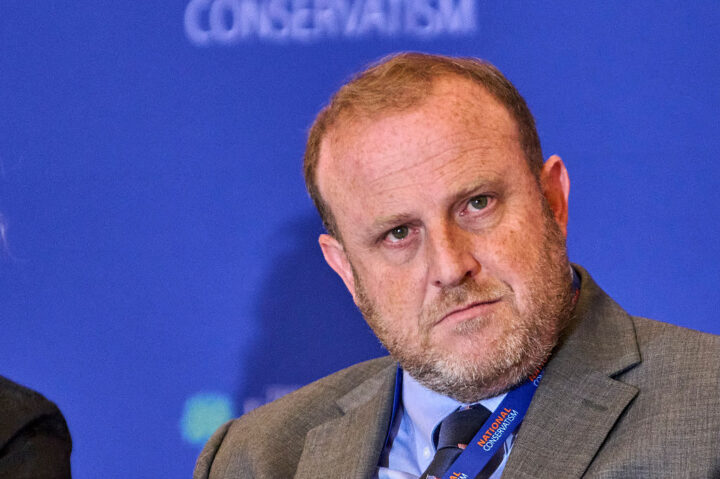
DOMINIC GWINN/Middle East Images/AFP via Getty Images
Jeremy Carl speaks at the National Conservatism Conference in Washington D.C., Sept. 3, 2025.
Good Thursday afternoon!
This P.M. edition is reserved for our premium subscribers — offering a forward-focused read on what we’re tracking now and what’s coming next.
It’s me again — Danielle Cohen-Kanik, U.S. editor at Jewish Insider and curator, along with assists from my colleagues, of the Daily Overtime. Please don’t hesitate to share your thoughts and feedback by replying to this email.
📡On Our Radar
Notable developments and interesting tidbits we’re tracking
Israeli Prime Minister Benjamin Netanyahu again voiced skepticism about the U.S.’ ability to reach an agreement with Iran as he departed Joint Base Andrews today, reports Jewish Insider’s Lahav Harkov, who is traveling with the prime minister’s delegation.
A day after his White House meeting with President Donald Trump, Netanyahu told reporters, “The president thinks the Iranians understand who they’re dealing with. He thinks the conditions he is setting, combined with their understanding that they made a mistake last time not reaching a deal, could bring them to agree to conditions that will allow a good deal to be reached.”
The prime minister’s view was more reserved: “I do not hide my general skepticism about the possibility of any deal with Iran.” Netanyahu said he told Trump that if a deal is indeed reached, “it must include the components that are important to us, the State of Israel, and, I think, the entire international community: not just the nuclear matter, but also ballistic missiles and Iranian proxies in the region.”
The Prime Minister’s Office also said Netanyahu will not be returning to Washington next week as scheduled, in order to speak at an AIPAC conference, and will instead appear virtually…
At a press conference this afternoon, Trump said the timeline for a potential deal with Iran is “over the next month … should happen quickly.” Asked why Netanyahu wants him to stop negotiating, Trump said, “He didn’t say that, we didn’t discuss that. I’ll talk to [Iran] as long as I like.” Trump additionally said Israeli President Isaac Herzog “should be ashamed of himself” and called him “disgraceful” for not issuing a pardon to Netanyahu…
The Trump administration smuggled around 6,000 Starlink terminals, used to establish internet connection, to activists in Iran during the regime’s violent suppression of nationwide protests, which included internet blackouts, U.S. officials told The Wall Street Journal…
New York City Mayor Zohran Mamdani and his team refused to condemn antisemitic and pro-Hamas social media posts from the co-founder of the group ‘Hot Girls for Zohran’ when pressed by JI’s Will Bredderman and other reporters today.
Speaking from City Hall, Mamdani would only stress that Gilani’s organization operated independently of his official election effort: “This was an individual leading an outside group and was never paid for by our campaign,” said Mamdani. “If New Yorkers want to know my views then they can hear it directly from me.
But when JI pressed the mayor directly whether he condemned the content of Gilani’s posts, he refused to respond and left the room, similar to how he fled questions on the matter from Politico on Wednesday…
Rep. Elise Stefanik (R-NY) urged the Trump administration today to investigate reports that a clique of radical staffers at the New York City Department of Health and Mental Hygiene had launched an anti-Israel “working group” inside the agency, JI’s Will Bredderman reports.
In a letter addressed to Health and Human Services Secretary Robert F. Kennedy Jr., Stefanik decried reports that employees had met during work hours at the city bureaucracy’s Queens headquarters. She raised the possibility that the department’s federal funding might have gone toward a prohibited political purpose — or that the gathering may have violated civil rights protections by creating a discriminatory environment for Jewish New Yorkers…
The nomination of Jeremy Carl, tapped to be the assistant secretary of state for international organizations, appears bound to fail after Sen. John Curtis (R-UT) announced his opposition to Carl’s confirmation following his contentious hearing in the Senate Foreign Relations Committee this morning, JI’s Marc Rod reports.
Curtis and a series of Democrats questioned Carl over past antisemitic, anti-Israel and otherwise inflammatory comments that the nominee had made online and in a series of podcast appearances, including his assertion that the U.S. spends too much time and energy on Israel “often to the detriment of our own national interest” and that “the Jews love to see themselves as oppressed”…
CENTCOM announced today it had completed a “deliberate and conditions-based” withdrawal of U.S. forces from al-Tanf Garrison in Syria, handing control of the site on the country’s border with Iraq and Jordan to forces aligned with the Syrian government. The U.S. has had a presence at the base since 2016 as part of its fight against ISIS; over 7,000 ISIS detainees are also being transitioned out of Syria into Iraq, while the U.S. troops were relocated to Jordan…
Germany joined the growing calls today for U.N. Special Rapporteur Francesca Albanese to resign, after France did the same yesterday, over her recent speech at the Al Jazeera Forum where she called Israel humanity’s “common enemy.” German Foreign Minister Johann Wadephul wrote on X, “I respect the system of independent rapporteurs of the UN. However, Ms. Albanese has already repeatedly failed in the past. I condemn her recent statements about Israel. She is untenable in her position”…
Israeli authorities arrested several people, and indicted one army reservist and one civilian, for allegedly using classified information to place bets on the popular prediction market Polymarket around the timing of Israel’s war with Iran last June, the Shin Bet announced today. The bets all correctly predicted the timeline of the strikes, raking in more than $150,000, Israeli media reported…
⏩ Tomorrow’s Agenda, Today
An early look at tomorrow’s storylines and schedule to keep you a step ahead
Keep an eye out in Jewish Insider for reporting on the race to succeed Rep. Bonnie Watson Coleman (D-NJ) in New Jersey’s 12th Congressional District, where the congresswoman is coming out forcefully against the lone Jewish candidate in the race — for being too supportive of Netanyahu.
The Munich Security Conference kicks off tomorrow, with Secretary of State Marco Rubio leading the U.S. delegation and speaking from the main stage on Saturday. Dozens of members of Congress were also expected to attend — official travel was canceled due to the impending shutdown of the Department of Homeland Security tomorrow, but members still may attend on their own. One member making a foray into foreign policy is Rep. Alexandria Ocasio-Cortez (D-NY), who will be speaking on two panels at the high-level summit. Other Democrats in attendance will be California Gov. Gavin Newsom, Michigan Gov. Gretchen Whitmer and Boston Mayor Michelle Wu.
In observance of President’s Day, we’ll be back in your inbox with the Daily Overtime on Tuesday. Shabbat Shalom!
Stories You May Have Missed
DOUBLING DOWN
Two Trump religious liberty appointees joined forces in anti-Israel push for antisemitism hearing
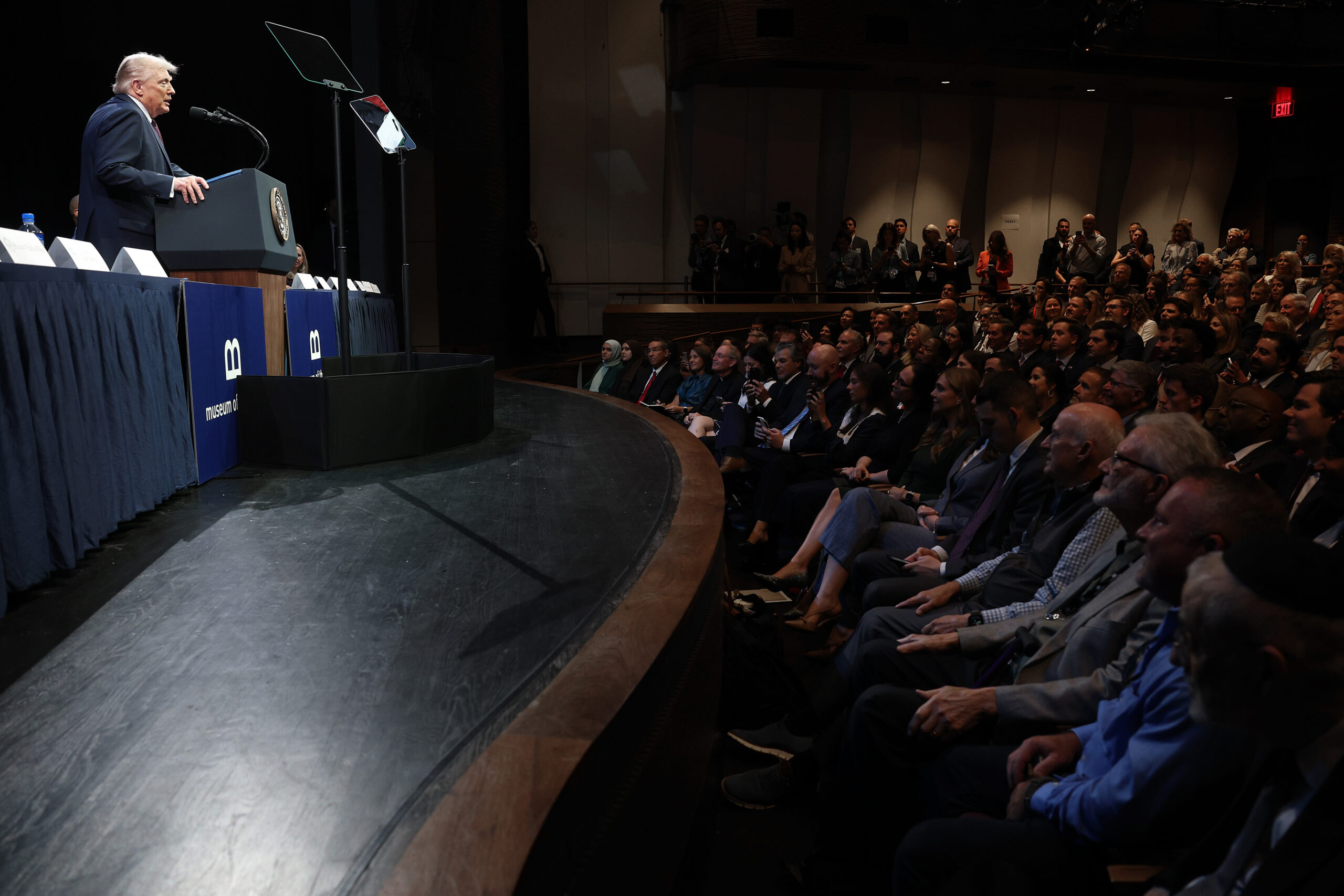
Activist Sameerah Munshi was appointed by the White House to the commission’s advisory board; the two women have jointly posted antisemitic content online
Behind the scenes, the main topic of conversation between the two leaders yesterday appeared to focus on options for action if Iran does not agree to a deal
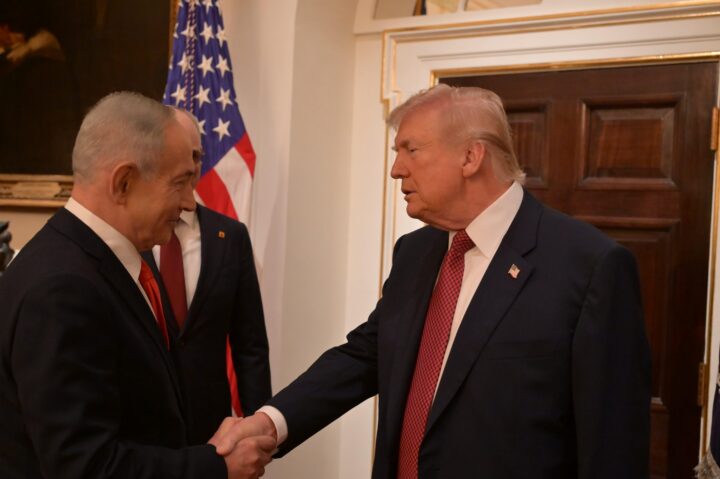
GPO
President Donald Trump greets Israeli Prime Minister Benjamin Netanyahu at the White House on Feb. 11, 2026.
At first glance, President Donald Trump and Israeli Prime Minister Benjamin Netanyahu’s nearly three-hour meeting at the White House on Wednesday appeared to end without any clear accomplishments.
Instead of the freewheeling question-and-answer sessions with media in the Oval Office and formal press conferences that followed most of Trump and Netanyahu’s previous six meetings since Trump returned to the White House, came a laconic statement from Netanyahu’s office about Israel’s security needs and a Truth Social post from Trump that was staid by the president’s standards.
Trump wrote that he “insisted that negotiations with Iran continue to see whether or not a deal can be consummated. If I can, I let the Prime Minister know that will be a preference.” However, the president warned that last time Iran decided against making a deal, “that did not work out well for them,” and the U.S. struck the country’s nuclear sites.
However, Trump and Netanyahu were similarly silent about their meeting in April 2025 — their last in-person meeting before the joint strike in Iran two months later.
Behind the scenes, the main topic of conversation between the two leaders yesterday appeared to focus on options for action if Iran does not agree to a deal.
The lack of press around the meeting was because Netanyahu wanted to keep a relatively low profile and show deference to Trump, since a strike on Iran — should one occur — would be led by the U.S., an Israeli source said.
The Israeli side is very skeptical that any deal can be reached between the U.S. and Iran, with Trump saying publicly that a good deal would mean “no nuclear weapons, no ballistic missiles,” and Iranian Foreign Minister Abbas Araghchi saying the ballistic missile issue is a nonstarter for Tehran.
According to a report by Barak Ravid for Israel’s Channel 12, the Trump administration’s views are very close to those on Netanyahu’s team, with a senior American official also believing the Iranians are unlikely to compromise.
The meeting between the two leaders was “critical,” Ravid quoted the official as saying, because they “need to decide whether to conduct a joint strike if a deal is not reached.” Such a strike would be more likely to succeed if the militaries work together.
One indication of the Trump administration’s pessimism about the talks is the Pentagon’s order, as reported by The Wall Street Journal, for a second aircraft carrier strike group to deploy to the Middle East if negotiations fail, which came after Trump teased the idea earlier this week.
A source in Netanyahu’s delegation said that the prime minister also arrived in Washington with evidence, which he presented to Special Envoy Steve Witkoff and Jared Kushner on Tuesday and Trump on Wednesday, that the Iranians lied to the Americans about their intentions in the talks, which they never planned to include ballistic missiles, as well as about stopping the slaughter of anti-regime protesters.
Meanwhile, the U.S. and Iran have yet to set a date for a second round of talks, and the first was under 90 minutes long — with some of that time dedicated to their Omani hosts passing messages back and forth in the indirect talks.
Activist Sameerah Munshi was appointed by the White House to the commission’s advisory board; the two women have jointly posted antisemitic content online
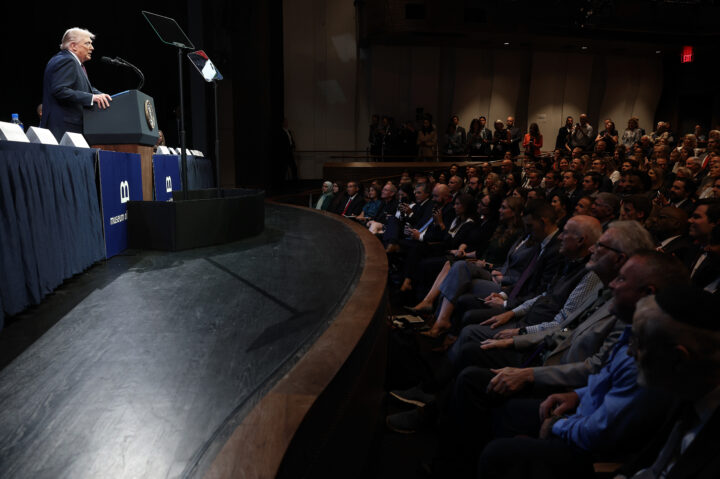
Win McNamee/Getty Images
President Donald Trump speaks to the White House Religious Liberty Commission at the Museum of the Bible September 8, 2025 in Washington, DC.
For the first hour and a half of the White House Religious Liberty Commission’s Monday hearing on antisemitism, the Jewish witnesses testifying about their experiences of antisemitism seemed to be in alignment with the commission’s members — all generally conservative and eager to see antisemitism stamped out.
Then Commissioner Carrie Prejean Boller began questioning the witnesses with a sharply anti-Israel bent, in an adversarial tone. Following public backlash, she was removed from the commission two days later by the commission’s chair, Texas Lt. Gov. Dan Patrick. (Prejean Boller insists Patrick does not have the authority to remove her.)
Prejean Boller, who wore a Palestinian flag pin at the hearing, has used the criticism to deepen her line of attack against so-called “Zionist supremacy in America,” doubling down on her opposition to Israel. “I am a free American. Not a slave to a foreign nation,” she wrote on X on Tuesday.
While Prejean Boller may have been removed from the body, she found an ally who has stood by her this week and who remains on the commission’s advisory board: Sameerah Munshi, a Muslim activist who first gained a public profile in the summer of 2023, when she testified at a Montgomery County, Md., school board hearing against the inclusion of LGBTQ-related material in elementary school classes.
That moment thrust Munshi briefly into the national spotlight, where she worked alongside conservative Christians who also opposed the liberal Maryland county’s approach to educating about LGBTQ issues. Prejean Boller, too, first gained national attention for her opposition to gay marriage at a beauty pageant in 2009.
The two women — both of whom were appointed by President Donald Trump — have now joined together as the anti-Israel wing of the commission. Both of them have publicly defended antisemitic commentator Candace Owens, who uses conspiracy-laden language to discuss Jews and Israel. In a shared Instagram post last week, Prejean Boller and Munshi pointed fingers at a shadowy cabal that they blame for both the humanitarian crisis in Gaza and the alleged crimes of Jeffrey Epstein.
“The politicians who refuse to condemn the Israeli government’s starvation and genocide on the Palestinians are the same ones unmoved by the Epstein crime files,” Prejean Boller and Munshi wrote. “Gaza was a precursor to the release of the Epstein files. Their goal: normalize and justify the torture and killing of innocent children … Arrest these monsters. Drain the evil swamp. End Palestinian genocide. Defund Israel.”
Prejean Boller and Munshi said in another post that they had submitted an alternative list of “fair witnesses” to the commission whom they hoped would present at the antisemitism hearing. The list included Norman Finkelstein, a discredited Holocaust scholar who has publicly defended the Oct. 7, 2023, Hamas attacks, as well as Miko Peled and Yaakov Shapiro, two anti-Zionist Jewish activists.
“Antisemitism should never be conflated with anti-Zionism or pro-Palestinian advocacy,” the two women wrote.
When former UCLA law student Yitzy Frankel spoke at the hearing about his experience of antisemitism on campus after Oct. 7, and described a statement he wrote condemning Hamas’ “rape, beheading of children and taking of hostages,” Munshi muttered under her breath that Hamas had not beheaded anyone, a member of the audience who was seated near her told Jewish Insider.
What remains unclear is who at the White House appointed Prejean Boller and Munshi to their roles on the commission and its advisory board, of which Munshi serves as a lay leader. Several members of the advisory board who spoke to JI said they did not know how they had been selected. A White House spokesperson declined to comment. Munshi did not respond to a request for comment.
Neither Munshi nor Prejean Boller had a history of posting anti-Israel content online prior to late last year.
Prejean Boller’s X account was used only infrequently, mostly to share content about Trump, illegal immigration, Christianity and gender issues. In early 2024, Prejean Boller began to come to Owens’ defense when Owens left The Daily Wire amid concerns about her antisemitic views. Munshi was also an infrequent user of X, and very occasionally posted pro-Palestinian messages over the last two years. Following Monday’s hearing, both women have taken to posting often and highlighting their opposition to Zionism.
“We condemn Zionist supremacy and the demanding we deny our individual faith for the fear of being called an antisemite. Religious freedom lives on,” Prejean Boller posted on Tuesday alongside a photo of the two women.
Plus, France calls for resignation of U.N.'s Albanese

GPO
President Donald Trump greets Israeli Prime Minister Benjamin Netanyahu at the White House on Feb. 11, 2026.
Good Wednesday afternoon!
This P.M. edition is reserved for our premium subscribers — offering a forward-focused read on what we’re tracking now and what’s coming next.
It’s me again — Danielle Cohen-Kanik, U.S. editor at Jewish Insider and curator, along with assists from my colleagues, of the Daily Overtime. Please don’t hesitate to share your thoughts and feedback by replying to this email.
📡On Our Radar
Notable developments and interesting tidbits we’re tracking
The U.S. will continue pursuing diplomacy with Iran, President Donald Trump said following his White House meeting with Israeli Prime Minister Benjamin Netanyahu earlier today, Jewish Insider’s Lahav Harkov reports.
“There was nothing definitive reached” in the meeting “other than I insisted that negotiations with Iran continue, to see whether or not a deal can be consummated,” Trump wrote on Truth Social. “If it can, I let the Prime Minister know that will be a preference.”
If negotiations do not lead to a deal, the president added, “we will just have to see what the outcome will be. Last time, Iran decided they were better off not making a deal, and they were hit with [Operation] Midnight Hammer. That did not work out well for them. Hopefully, this time, they will be more reasonable and responsible.”
Netanyahu’s office said about the meeting, “The prime minister stood up for the State of Israel’s security needs in the context of the negotiations, and the two agreed to continue to coordinate closely”…
Even as Trump insists diplomacy will continue, the Pentagon has told a second aircraft carrier strike group to prepare for deployment to the Middle East, The Wall Street Journal reports, to join the USS Abraham Lincoln along with dozens of U.S. aircraft and other warships…
Meanwhile, a bipartisan group of 23 senators, spanning the political and ideological spectrums, introduced a resolution today condemning the Iranian government for its crackdown on protesters and attempts to cut off internet access across the country, JI’s Marc Rod reports.
“Iranian civilians’ unprecedented nationwide protests and bravery, confronted with the regime’s unprecedented widespread extrajudicial killing of thousands and disruption of all electronic communication, have profoundly destabilized the country and constitute changed conditions in Iran,” the resolution reads, highlighting that the regime’s suppression and killing of protesters continues…
The Trump administration expects to be able to announce several billion dollars in donations for Gaza reconstruction at the Board of Peace’s inaugural meeting in Washington next week, The Times of Israel reports, even as it is still working on a proposal to disarm Hamas. That plan so far reportedly envisions Hamas relinquishing its heavy weapons and destroying manufacturing sites, without fully addressing lighter arms…
Conservative activist Carrie Prejean Boller was removed from the White House’s Religious Liberty Commission today, JI’s Gabby Deutch reports, two days after the commission held its first public hearing on antisemitism, which turned contentious when Prejean Boller pressed Jewish witnesses about whether they would consider her antisemitic for not being a Zionist and for believing Jews killed Jesus.
“No member of the Commission has the right to hijack a hearing for their own personal and political agenda on any issue,” Texas Lt. Gov. Dan Patrick, who chairs the commission, wrote in a post on X. “This is clearly, without question, what happened Monday in our hearing on antisemitism in America. This was my decision”…
France is calling for the resignation of U.N. Special Rapporteur Francesca Albanese, French Foreign Minister Jean-Noël Barrot announced today, after Albanese called Israel humanity’s “common enemy” in a speech at the Al Jazeera Forum in Qatar over the weekend.
“France unreservedly condemns the outrageous and reprehensible remarks made by Francesca Albanese, which are directed not at the Israeli government, whose policies may be criticized, but at Israel as a people and as a nation, which is absolutely unacceptable,” Barrot said in remarks to lawmakers. Her latest comments add “to a long list of scandalous positions,” including “justifying” the Oct. 7 attacks and “comparing Israel to the Third Reich,” he said…
Senate Minority Leader Chuck Schumer (D-NY) and Sen. Adam Schiff (D-CA) introduced legislation seeking oversight into the hundreds of millions of dollars in Venezuelan oil proceeds that the U.S. has acquired, some of which officials have said is being held in an account in Qatar…
New York City’s only Ethiopian-Israeli restaurant is closing its doors to diners, Jewish Telegraphic Agency reports, and turning only to private events over rising anti-Israel harassment, which the owner, Beejhy Barhany, said escalated after the restaurant became kosher in February 2024…
The Department of Homeland Security hired a social media manager who had raised red flags at his previous position at the Department of Labor posting messaging that echoed white nationalist sentiments on official social media accounts, The New York Times reports.
Those posts “used evocative imagery, some reminiscent of the 1920s and 1930s, with phrases like ‘Restore American Greatness’ and ‘the globalist status quo is OVER.’ … Colleagues warned superiors that the department’s accounts could be seen as promoting white-supremacist rhetoric, Nazi imagery and QAnon conspiracy theories”…
⏩ Tomorrow’s Agenda, Today
An early look at tomorrow’s storylines and schedule to keep you a step ahead
Keep an eye out in Jewish Insider for an interview with Jason Friedman, a longtime Chicago Jewish federation leader making a bid for Illinois’ open 7th Congressional District.
The Senate Foreign Relations Committee will hold a nomination hearing for conservative commentator Jeremy Carl to serve as assistant secretary of state for international organizations. Schumer denounced Carl and his nomination on the Senate floor this week, “citing Carl’s long history of racist, white supremacist, and antisemitic views.”
Sinai Temple in Los Angeles will host a summit tomorrow on faith and sports, ahead of NBA All-Star weekend taking place in the city. The convening will feature several NBA athletes, coaches and faith and civic leaders.
Stories You May Have Missed
BASEBALL DIARIES
Team Israel’s World Baseball Classic team unveils its 2026 roster

The team is anchored by its pitching ace Dean Kremer of the Orioles, while Harrison Bader and Spencer Horwitz are among its best known hitters
Plus, N.C. Dems condemn antisemitism from Muslim caucus chair
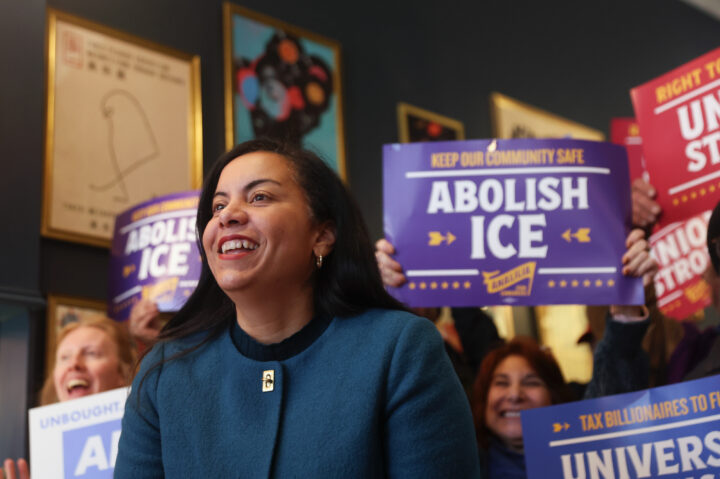
Heather Khalifa/Bloomberg via Getty Images
Analilia Mejia, US Democratic House candidate for New Jersey, speaks to supporters and members of the media at Paper Plane Coffee Co. in Montclair, New Jersey, US, on Thursday, Jan. 29, 2026.
Good Tuesday afternoon!
This P.M. edition is reserved for our premium subscribers — offering a forward-focused read on what we’re tracking now and what’s coming next.
It’s me again — Danielle Cohen-Kanik, U.S. editor at Jewish Insider and curator, along with assists from my colleagues, of the Daily Overtime. Please don’t hesitate to share your thoughts and feedback by replying to this email.
📡On Our Radar
Notable developments and interesting tidbits we’re tracking
President Donald Trump is considering sending a second aircraft carrier group to the Middle East as a contingency if negotiations with Iran fail, he told Axios today. “Either we will make a deal or we will have to do something very tough like last time,” the president said, adding, “We have an armada that is heading there and another one might be going.”
Still, Trump expressed optimism that Tehran “wants to make a deal very badly” and said the negotiations are “very different” since he authorized strikes last June on Iran’s nuclear facilities. He also said he doesn’t think Israeli Prime Minister Benjamin Netanyahu, who is en route to Washington for his Wednesday meeting with Trump, is nervous about the negotiations, stating Netanyahu “also wants a deal. He wants a good deal”…
Trump also reiterated his opposition to West Bank annexation, days after Israel’s Security Cabinet voted to expand Israeli authorities in the area. “I am against annexation. We have enough things to think about now. We don’t need to be dealing with the West Bank,” he told Axios. While Trump’s meeting with Netanyahu tomorrow will ostensibly focus on Iran, the latest Israeli moves could drive a wedge between the two leaders…
On the campaign trail, former Rep. Tom Malinowski (D-NJ) conceded the race for New Jersey’s 11th Congressional District to far-left activist Analilia Mejia today, after outstanding ballots broke decisively in her favor over the weekend.
In his statement, Malinowski, the presumed favorite who was the target of over $2 million of ads by the AIPAC-linked United Democracy Project super PAC, claimed that “the outcome of this race cannot be understood without also taking into account the massive flood of dark money that AIPAC spent on dishonest ads” attacking him. He warned, “If AIPAC backs a candidate — openly or surreptitiously — in the June NJ-11 Congressional primary, I will oppose that candidate and urge my supporters to do so as well.”
Mejia was congratulated by New Jersey Democratic leaders including Sens. Andy Kim and Cory Booker and Gov. Mikie Sherrill, though it remains to be seen if she will retain their support in the June primary when she must run for the Democratic nomination again if she hopes to retain the office for a full term…
Sen. Susan Collins (R-ME) officially launched her reelection campaign today for her seat which Democrats likely need to flip if they hope to take back the chamber. Collins, who has been targeted by Trump due to her occasional votes across the aisle, will likely face either Maine Gov. Janet Mills or oyster farmer Graham Platner in the general, after they battle it out in a hotly contested primary…
New York Lt. Gov. Antonio Delgado dropped his primary challenge to Gov. Kathy Hochul today, whom he had hoped to beat out in her reelection race from the left. The move comes after several progressive leaders, including New York City Mayor Zohran Mamdani, endorsed Hochul, which Delgado alluded to in his statement: “After much consideration, I’ve concluded that there simply is no viable path forward. And though my campaign has come to an end, I fully intend to do all I can in our effort to build a more humane, affordable, and equitable state that serves all New Yorkers”…
The Washington Free Beacon details several Mamdani administration staffers with a history of comments defaming Israel, including one who called Israel a “modern-day Nazi Germany” and one who called people ripping down posters of Israeli hostages “heroes”…
North Carolina Gov. Josh Stein, a Democrat, condemned rhetoric from the leader of the state Democratic Party’s Muslim Caucus, Elyas Mohammed, in a statement shared exclusively with JI’s Matthew Kassel. Mohammed recently described Zionists as “modern day Nazis” and as a “threat to humanity,” among other incendiary social media posts.
“Antisemitic comments and conspiracy theories have no place anywhere, including in the North Carolina Democratic Party,” the governor said, after the leaders of several prominent Jewish groups in the state sent a joint letter urging Democratic officials and lawmakers to publicly denounce Mohammed’s statements…
Columbia University is considering expanding and refocusing how its Middle Eastern studies department teaches about Israel, JI’s Haley Cohen reports. The provost’s regional review committee announced a set of recommendations this week for the department, including a stronger partnership with the school’s Institute for Israel and Jewish Studies, marking a pivot in a field and at a school that have come under immense scrutiny from the federal government and Jewish leaders following the Oct. 7, 2023, Hamas attacks…
Shaare Tefila, a Conservative congregation in Olney, Md., in the Washington suburbs, was defaced with antisemitic graffiti today, JI’s Haley Cohen reports. A swastika, the word “genocide” and the phrase “AZAB,” an acronym standing for “All Zionists Are Bastards,” were spray-painted on street signs and banners outside the synagogue.
Ron Halber, CEO of the Jewish Community Relations Council of Greater Washington, called the act “outrageous. While it is fortunate that no one was physically hurt, it is yet another sad reminder that antisemitic incidents have become common occurrences throughout our region,” he said…
Harmeet Dhillon, the assistant attorney general for civil rights, said the Justice Department intends to pursue and ultimately shut down groups that have engaged in disruptive protests at synagogues and other antisemitic activities, as well as those supporting those groups, JI’s Marc Rod reports.
Speaking today at a conference on antisemitism organized by The George Washington University Program on Extremism, Dhillon said her division’s work includes pursuing those funding, training and supporting groups such as American Muslims for Palestine and the Party for Socialism and Liberation, which she said are engaging in “acts of domestic terrorism”…
⏩ Tomorrow’s Agenda, Today
An early look at tomorrow’s storylines and schedule to keep you a step ahead
Keep an eye out in Jewish Insider for a preview of Israeli Prime Minister Benjamin Netanyahu’s bilateral meeting with President Donald Trump tomorrow at the White House, as the Israeli PM seeks to provide input on U.S. negotiations with Iran.
The House Appropriations Committee will hold a hearing on the potential impacts of a Department of Homeland Security shutdown, which looks likely as lawmakers struggle to reach a deal before its funding runs out on Friday.
The House Judiciary Committee will hold a hearing on oversight of the Department of Justice with Attorney General Pam Bondi.
American Jewish Committee CEO Ted Deutch will speak at New York City’s Temple Emanu-El on the organization’s annual State of Antisemitism in America survey, released today.
Stories You May Have Missed
POSTWAR PROBLEMS
White House needs to confront limits of Hamas disarmament, experts say
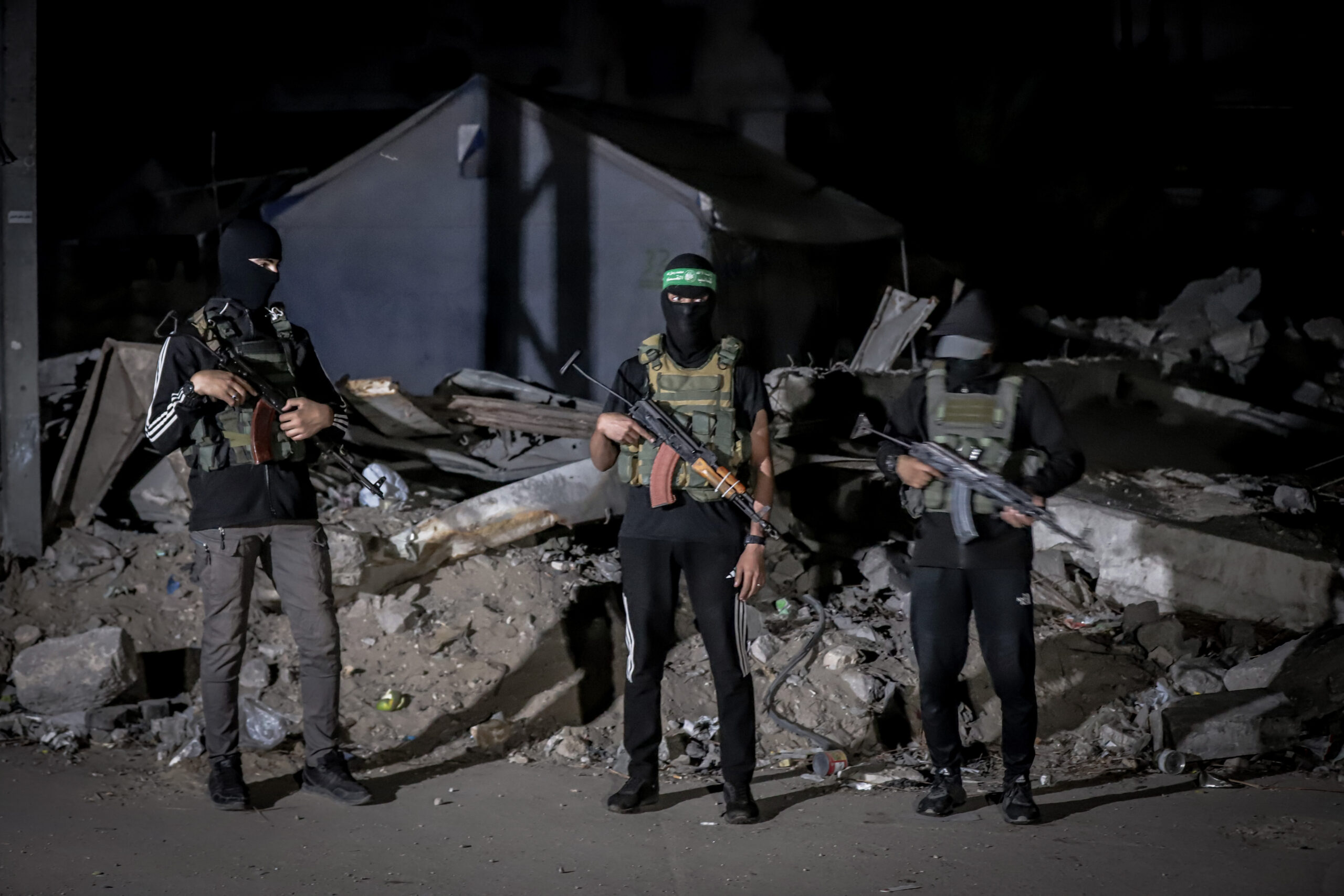
The options for demilitarization ‘strike me as not feasible from a military point of view and certainly not practical from a political point of view,’ says the Carnegie Endowment’s Aaron David Miller
Plus, report finds DSA may be acting as unregistered foreign agent
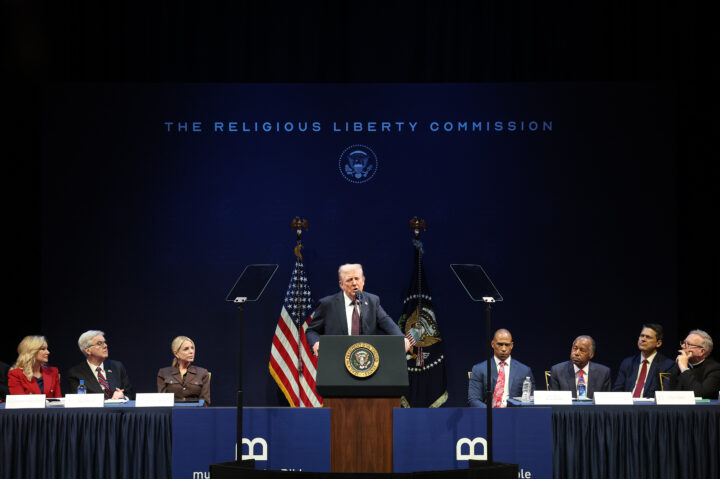
Win McNamee/Getty Images
President Donald Trump speaks at the Museum of the Bible September 8, 2025 in Washington, DC.
Good Monday afternoon!
This P.M. edition is reserved for our premium subscribers — offering a forward-focused read on what we’re tracking now and what’s coming next.
It’s me again — Danielle Cohen-Kanik, U.S. editor at Jewish Insider and curator, along with assists from my colleagues, of the Daily Overtime. Please don’t hesitate to share your thoughts and feedback by replying to this email.
📡On Our Radar
Notable developments and interesting tidbits we’re tracking
The Trump administration’s Religious Liberty Commission’s first hearing on antisemitism, which took place in Washington this morning, turned contentious as one commissioner declared herself an anti-Zionist and defended Candace Owens, Jewish Insider’s Gabby Deutch reports.
Amid testimony from Jewish witnesses about their experiences with antisemitism, Carrie Prejean Boller, a Catholic conservative activist and former Miss California, said about Owens, “I listen to her daily. I haven’t heard one thing out of her mouth that I would say is antisemitic.”
“Catholics do not embrace Zionism, just so you know. So are all Catholics antisemites?” Prejean Boller later asked the panel, earning some boos from the audience, a mix of Jewish professionals, Christian activists and members of the Washington Jewish community. “I want to be clear on what the definition of antisemitism is. If I don’t support the political State of Israel, am I an antisemite, yes or no?”…
The Network Contagion Research Institute accused the Democratic Socialists of America, in a report released in late January, of activities that may run afoul of the Foreign Agents Registration Act — alleging that the far-left group may be acting as an unregistered agent of various U.S. adversaries, JI’s Marc Rod reports.
The report points to foreign trips by DSA members to Venezuela, Cuba and China which have included access to top-level officials and, the report alleges, lodging, transportation and other services provided by the host governments “that may constitute in-kind benefits from foreign government-linked entities” and “participation in quasi-official functions.”
The report claims that the DSA’s foreign engagements are followed by brief upticks in the group’s promotion of U.S. adversaries’ priority issues, such as removing sanctions on Cuba and Venezuela, “consistent with campaign-style political activity rather than incidental commentary”…
Anti-Defamation League CEO Jonathan Greenblatt defended his organization’s approach to combating antisemitism in eJewishPhilanthropy today, after New York Times columnist Bret Stephens called for the ADL to be dismantled and for the organized Jewish community to reallocate its resources to focus on building Jewish identity rather than combating antisemitism.
“Stephens’ framing risks replacing one error with another,” Greenblatt wrote. “The choice is not ‘fight antisemitism’ or ‘build Jewish life.’ Security and identity aren’t competing priorities; they’re inseparable preconditions for Jewish flourishing in an open society. Shutting down the Anti-Defamation League or other Jewish organizations is not some magic formula that promises self-reliance; it’s a disastrous prescription for unilateral disarmament”…
Guy Christensen, an anti-Israel influencer who defended the Capital Jewish Museum shooting in which two Israeli Embassy employees were killed, spoke at the Al Jazeera Forum wrapping up in Doha, Qatar, today. As a last-minute addition to the event, which has already seen Hamas leader Khaled Mashaal defend the Oct. 7 attacks, Christensen spoke on a panel about content creation and influence.
The forum’s website touts Christensen, who was expelled from The Ohio State University over his defense of the alleged Capital Jewish Museum shooter, as “a political activist, commentator, and content creator who dedicates his efforts to advancing social justice and educating the masses. Over the past two years, he has proven himself to be one of the most prominent Gen Z voices supporting Palestinian liberation”…
Rep. Jerry Nadler (D-NY) endorsed state Assemblyman Micah Lasher today as his successor in New York’s 12th Congressional District, an expected move to boost his protege for the hotly contested seat. The endorsement comes shortly after reports emerged that one of Lasher’s opponents, Kennedy scion Jack Schlossberg, is set to receive his own prized endorsement from Rep. Nancy Pelosi (D-CA), who is also retiring after this term.
About Schlossberg, Nadler told The New York Times, “He’s a nice guy, and he comes from a nice family, but what’s his experience for this job? No, I don’t think people ought to support him. I don’t think they will support him”…
Adm. Brad Cooper, commander of CENTCOM, congratulated the Lebanese Armed Forces today for “recently finding a massive underground Hizbollah tunnel for the second time in the past two months.” He commended a “job well done by the LAF and U.S.-led Mechanism team that is helping enforce commitments made by Israel and Lebanon.”
The appreciative comments come as experts, lawmakers and Israeli officials have cast doubt on efforts by the Lebanese government to disarm Hezbollah, as required in the Israel-Lebanon November 2024 ceasefire agreement.
At the same time, Lebanese Prime Minister Nawaf Salam visited southern Lebanon today for the first time since the LAF said it had disarmed Hezbollah south of the Litani River, where he claimed that continuous Israeli “attacks” — strikes which Israel says it is carrying out due to Hezbollah’s rearmament and continued terror efforts in the area — are a “blow to our dignity”…
Indonesia is preparing to send a delegation of several thousand troops into Gaza, Israeli media reports. The timing, size and mandate of the deployment remains unknown, though the Indonesian defense minister said in November that the country had trained 20,000 troops to conduct health and construction-related efforts for the U.S.-led International Stabilization Force. The troops are expected to be stationed between the cities of Rafah and Khan Yunis in the southern Gaza Strip…
Arab states and the EU condemned the Israeli Security Cabinet’s approval of a series of measures that will allow Israeli authorities to exert more control in the West Bank, with the foreign ministers of Jordan, the UAE, Pakistan, Turkey, Saudi Arabia, Qatar and Egypt rejecting the “expansionist Israeli policies and illegal measures” in a joint statement.
EU spokesperson Anouar El Anouni called it “another step in the wrong direction, while the whole international community is making an effort to implement Phase 2 of the comprehensive plan for Gaza.” President Donald Trump, whom Israeli Prime Minister Benjamin Netanyahu is meeting with this week, has also voiced his opposition to annexation efforts, saying in October that “Israel would lose all of its support from the United States if that happened”…
⏩ Tomorrow’s Agenda, Today
An early look at tomorrow’s storylines and schedule to keep you a step ahead
Keep an eye out in Jewish Insider for an interview with former hostages Keith and Aviva Siegel, as they pivot from hostage advocacy efforts to engaging in humanitarian work abroad.
On the Hill, the House Ways and Means Committee will hold a hearing on foreign influence in American nonprofits, including testimony from Adam Sohn, the co-founder of the Network Contagion Research Institute, which authored the recent study on the Democratic Socialists of America.
The House Foreign Affairs Committee will hold a hearing on Syria and U.S. policy challenges in a post-Assad world. Witnesses will include James Jeffrey and Andrew Tabler of the Washington Institute for Near East Policy and Nadine Maenza, the former chair of the U.S. Commission on International Religious Freedom.
The Jewish Community Relations Council of Greater Washington will host its Virginia Jewish Advocacy Day, featuring remarks from newly sworn in Gov. Abigail Spanberger.
Stories You May Have Missed
MEJIA’S MOMENTUM
Will Democrats rally behind progressive socialist Mejia as she vies to represent wealthy N.J. district?
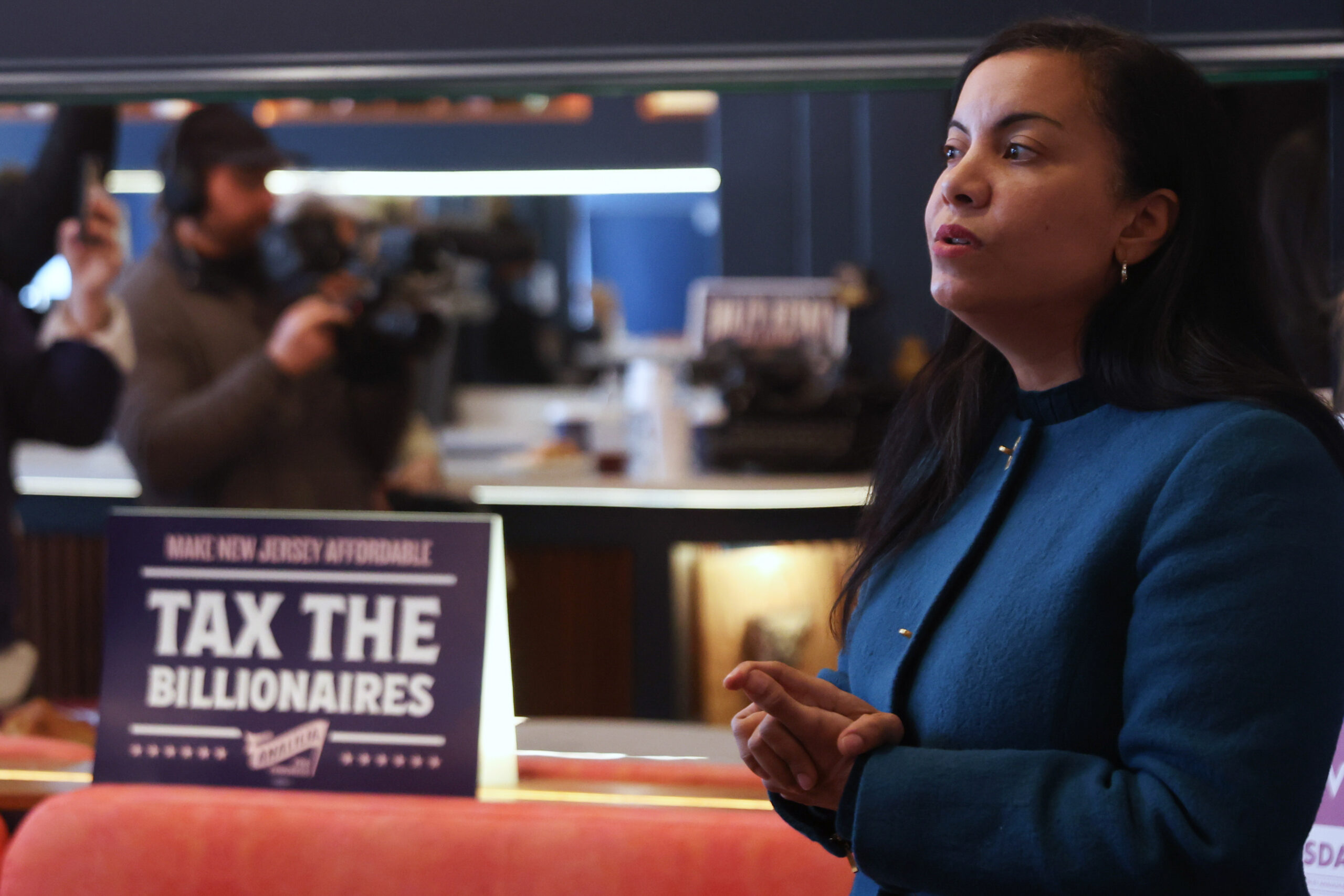
Already several members of the state’s congressional delegation have begun to coalesce around Mejia’s campaign
Plus, Massie challenger gets strong GOP backing
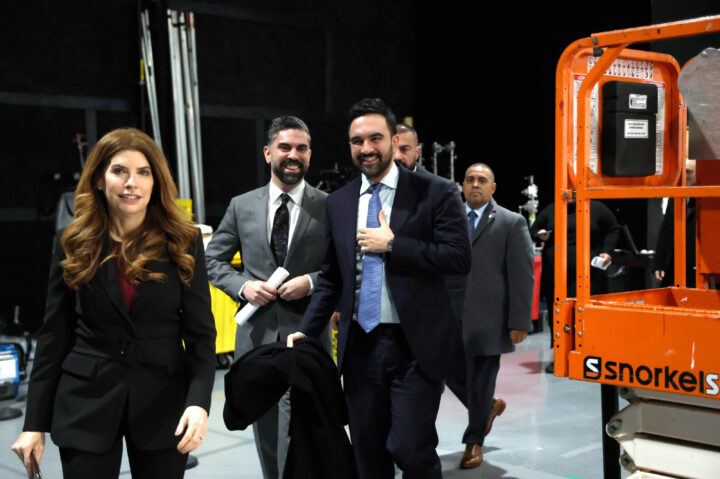
Julie Menin, speaker of the New York City Council and Zohran Mamdani, mayor of New York, arrive for an announcement in the Brooklyn borough of New York, US, on Monday, Jan. 12, 2026 (Photographer: John Lamparski/Bloomberg via Getty Images)
Good Thursday afternoon!
This P.M. edition is reserved for our premium subscribers — offering a forward-focused read on what we’re tracking now and what’s coming next.
It’s me again — Danielle Cohen-Kanik, U.S. editor at Jewish Insider and curator, along with assists from my colleagues, of the Daily Overtime. Please don’t hesitate to share your thoughts and feedback by replying to this email.
📡On Our Radar
Notable developments and interesting tidbits we’re tracking
Sen. Bill Cassidy (R-LA), the chairman of the Senate Health, Education, Labor and Pensions Committee, wrote to New York Mayor Zohran Mamdani today voicing “serious concerns” about Mamdani’s “rescission of executive orders related to antisemitism and boycotts of Israel.”
Cassidy said the New York City Department of Education’s $2.2 billion in federal funding could be rescinded “contingent on compliance with federal civil rights laws and applicable executive orders designed to protect students”…
New York City councilmembers on both sides of the aisle denounced a new working group established by employees of the city’s Department of Health on “global oppression,” Jewish Insider’s Will Bredderman reports, which a presenter at its first meeting on Tuesday acknowledged was “really developed in response to the ongoing genocide in Palestine.”
City Council Speaker Julie Menin called for a probe into the working group at DOH, which operates under Mamdani’s administration, telling the New York Post, “Our health care officials should be fighting infectious diseases and addressing skyrocketing health care costs instead of spending public time debating geopolitics”…
Moshe Davis, the former executive director of the Mayor’s Office to Combat Antisemitism in New York City, told The Free Press upon being ousted from the role by Mamdani, “I don’t think the priority of the administration has been to combat antisemitism.”
Davis, who was a political appointee of former Mayor Eric Adams, said a Mamdani staffer told him they were “looking to go in a different direction” in replacing him with Phylisa Wisdom, a progressive Jewish activist. “Look, I’m a loud, proud Jewish person with a kippah on my head, a proud Zionist. This administration maybe felt that was too much for them,” Davis said. He noted that his requests to meet with the mayor and the memos he produced on rising antisemitism in the city had gone ignored…
Mamdani officially endorsed New York Gov. Kathy Hochul in an anticipated move, boosting her reelection prospects while also dealing a blow to her lieutenant governor, Antonio Delgado, who is running to oust Hochul from her left…
Rep. Andy Barr (R-KY) and businessman Nate Morris, two of the leading Republican candidates for Kentucky’s Senate seat, today endorsed Ed Gallrein, the GOP challenger to Rep. Thomas Massie (R-KY), one of the leading Republican critics of Israel in Congress, JI’s Marc Rod reports.
“Ed will never side with AOC or the radical-left against President Trump. He is exactly the kind of conservative warrior we need in Congress, and I’m proud to endorse him,” Barr said in a statement, referencing Massie’s pattern of breaking with various elements of Trump’s agenda, which has included voting against support for Israel.
The endorsements came amid an ongoing series of attacks by Trump on Massie, which included calling Massie a “moron” in remarks at the National Prayer Breakfast this morning, as well as attacks on Truth Social this week targeting Massie’s wife…
Daniel Flesch, a senior policy analyst at the Heritage Foundation who led the drafting of the organization’s Project Esther report on combating left-wing antisemitism, has parted ways with the conservative think tank, according to Heritage’s website.
Flesch had raised the alarm on right-wing antisemitism after Heritage President Kevin Roberts released a video defending Tucker Carlson for hosting neo-Nazi Nick Fuentes on his podcast, telling the Young Jewish Conservatives in December that, “Now, in some ways, the call is coming from inside the house.” Flesch had also been Heritage’s point person for the National Task Force to Combat Antisemitism, a coalition of conservative groups that disaffiliated from the think tank after the incident…
White House Press Secretary Karoline Leavitt confirmed today that Special Envoy Steve Witkoff and Jared Kushner will be traveling to Oman for negotiations with Iran tomorrow, saying at a press conference this afternoon that the president is “standing by for an update from them.”
“The president has obviously been quite clear in his demands of the Iranian regime — zero nuclear capability is something he’s been very explicit about and he wants to see if a deal can be struck. And while these negotiations are taking place, I would remind the Iranian regime that the president has many options at his disposal aside from diplomacy as the commander-in-chief of the most powerful military in the history of the world,” Leavitt added…
Israeli Prime Minister Benjamin Netanyahu told lawmakers at a closed-door meeting of the Knesset Foreign Affairs and Defense Committee that U.S.-Israel coordination is “as high and as close as possible” ahead of the nuclear talks tomorrow, Israeli media reports, but that he still doesn’t know if President Donald Trump will choose to take military action…
Middle East countries that were originally meant to participate in the talks, including Saudi Arabia, Qatar, Egypt, Oman, the UAE and Pakistan, drafted a potential agreement for the U.S. and Iran, including a nonaggression pact, diplomats told The Times of Israel…
Iran’s Islamic Revolutionary Guard Corps seized two foreign oil tankers in the Persian Gulf today, Iranian state media reported, days after attempting to stop and board a U.S.-flagged oil tanker. Reports did not provide the country of origin of the tankers seized today…
Sen. Lindsey Graham (R-SC) expressed frustration with the Lebanese government’s stance toward Hezbollah amid struggling disarmament efforts, describing on X a meeting he’d had with Gen. Rodolphe Haykal, the commander of the Lebanese Armed Forces. “I asked him point blank if he believes Hezbollah is a terrorist organization. He said, ‘No, not in the context of Lebanon.’ With that, I ended the meeting.”
“They have been designated as a foreign terrorist organization by both Republican and Democrat administrations since 1997 — for good reason. As long as this attitude exists from the Lebanese Armed Forces, I don’t think we have a reliable partner in them,” Graham continued. The U.S. has provided over $3 billion to shore up the LAF in the last 20 years, including $230 million approved by the Trump administration as recently as October…
⏩ Tomorrow’s Agenda, Today
An early look at tomorrow’s storylines and schedule to keep you a step ahead
Keep an eye out in Jewish Insider for whether AIPAC’s active role in the New Jersey 11th Congressional District Democratic primary — opposing former Rep. Tom Malinowski (D-NJ) — paid off. Polls in the district close at 8 p.m.
We’ll be watching for readouts from the meeting between White House Special Envoy Steve Witkoff, advisor Jared Kushner and Iranian Foreign Minister Abbas Araghchi in Oman at 10 a.m. local time tomorrow, including whether issues beyond Tehran’s nuclear program are discussed.
We’ll be back in your inbox with the Daily Overtime on Monday. Shabbat Shalom!
Stories You May Have Missed
AI AMBITION
Alphabet’s AI bet shows early returns under Israeli-American CFO Anat Ashkenazi
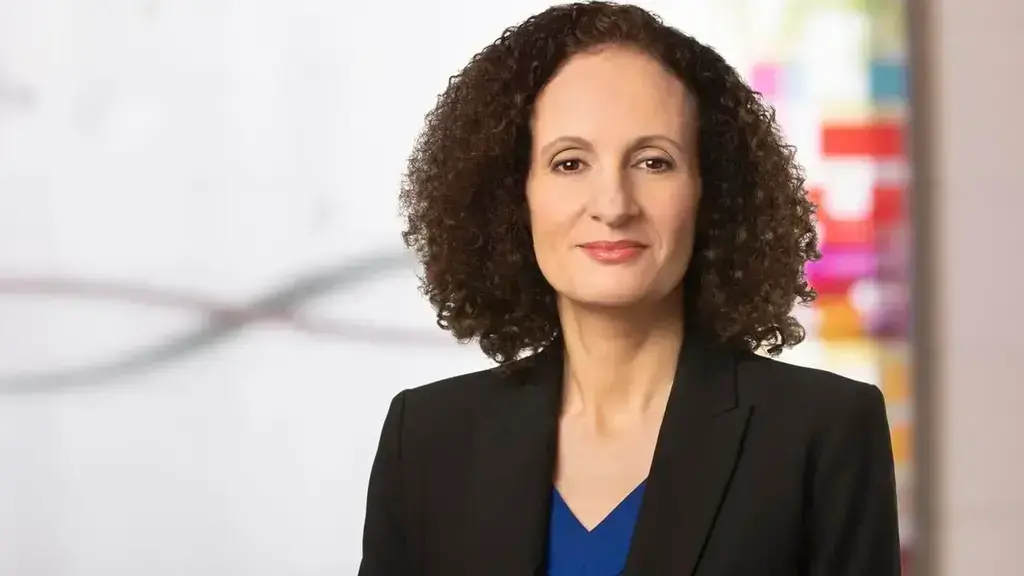
The Israeli-American CFO first fueled Eli Lilly’s success, and is now turning her attention to the tech sector
Plus, Israel continues to cast doubt over Iran talks
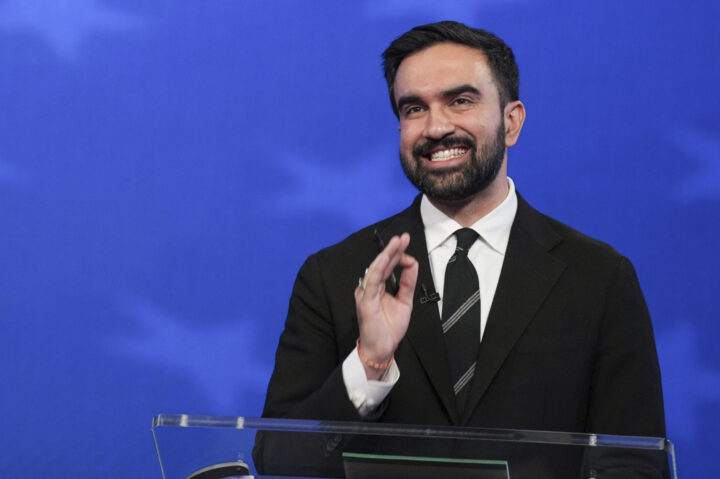
Angelina Katsanis-Pool/Getty Images
Democratic mayoral nominee Zohran Mamdani speaks during a mayoral debate at Rockefeller Center on October 16, 2025 in New York City.
Good Wednesday afternoon!
This P.M. edition is reserved for our premium subscribers — offering a forward-focused read on what we’re tracking now and what’s coming next.
It’s me again — Danielle Cohen-Kanik, U.S. editor at Jewish Insider and curator, along with assists from my colleagues, of the Daily Overtime. Please don’t hesitate to share your thoughts and feedback by replying to this email.
📡On Our Radar
Notable developments and interesting tidbits we’re tracking
U.S. officials reportedly backtracked on their rejection of Iranian demands to change the format and venue of nuclear negotiations, set for Friday, after several Middle East leaders intervened to keep the U.S. from walking away, according to Axios. “They asked us to keep the meeting and listen to what the Iranians have to say. We have told the Arabs that we will do the meeting if they insist. But we are very skeptical,” one U.S. official told the outlet.
Iranian Foreign Minister Abbas Araghchi confirmed on X that “nuclear talks … are scheduled to be held in Muscat” at 10 a.m. on Friday, indicating the U.S. agreed to move the venue from Turkey to Oman…
But Secretary of State Marco Rubio reiterated today that the Trump administration is seeking a comprehensive deal with Iran to address more than just its pursuit of nuclear weapons — including its ballistic missiles program, support for terror proxies and internal repression as well. Iran has traditionally been resistant to discussing anything beyond its nuclear program.
Asked if Iranian Supreme Leader Ayatollah Ali Khamenei should be worried right now, President Donald Trump told NBC News today, “I would say he should be very worried, yeah, he should be.” Trump said he was interested in negotiations again as he understood Iranian officials were considering restarting their nuclear program, “and if they do, we’re going to send” B-2 bombers “right back to do their job again,” referencing the U.S.’ June strikes…
Israeli officials have voiced skepticism over the prudence of negotiating with Iran at all, Jewish Insider’s Lahav Harkov reports. After Israeli Prime Minister Benjamin Netanyahu told White House Special Envoy Steve Witkoff yesterday that Iran’s “promises cannot be trusted,” Energy Minister Eli Cohen told Israeli radio, “Our message to the U.S. is that negotiations with Iran are a waste of time”…
Sam Brownback, the former U.S. ambassador at large for international religious freedom and a former GOP senator from Kansas, warned at a House Foreign Affairs Committee hearing today that, unless Syrian minority groups are allowed to maintain their own security forces, they face a likely genocide by government-aligned forces, JI’s Marc Rod reports.
“The new administration in Syria is purging religious minorities, threatening and killing them,” Brownback said. “These groups must be allowed to maintain their own security forces, or I guarantee you today, a genocide will happen in Syria like happened in Iraq to the Yazidis and Christians.”
The Trump administration has remained largely supportive of the al-Sharaa government, and critics have accused the White House of essentially abandoning the U.S.’ longtime Kurdish allies to the Syrian government onslaught…
First Lady Melania Trump welcomed freed Israeli hostages Aviva and Keith Siegel to the White House today, JI’s Gabby Deutch reports, one year after Aviva met the first lady for the first time and pleaded for help in securing her husband’s release.
“Aviva is a warrior. She’s a warrior. She was fighting very hard for Keith, and I know he suffered a lot,” Trump said at the meeting. “I’m happy to see you healthy at home with your children, with your grandchildren, with your family, and I know you’re giving back your time, your energy, to other people”…
New York City Mayor Zohran Mamdani tapped Phylisa Wisdom, the executive director of the progressive group New York Jewish Agenda, to lead the Mayor’s Office to Combat Antisemitism, the Forward reports.
Wisdom told JI last month that tackling the “scourge of antisemitism” in the city will require a comprehensive strategy,” noting that the office she will now lead “can play a key role, coordinating between long-standing offices and agencies tasked with combating hate, and input from the diversity of New York’s Jewish community.”
The appointment of the left-wing activist indicates Mamdani’s administration isn’t looking to placate the mainstream Jewish community. Wisdom, while well-known in the New York Jewish community, has traditionally opposed the International Holocaust Remembrance Alliance’s working definition of antisemitism and at times vocally opposed Israel’s war in Gaza after the Oct. 7 attacks…
Meanwhile, New York Gov. Kathy Hochul selected former New York City Council Speaker Adrienne Adams as her running mate in her reelection race this year — a pick that provoked both applause and consternation among leaders of the state’s Jewish community, JI’s Will Bredderman reports.
Adams was the first council speaker not to lead a delegation to Israel — although she denied that she was boycotting the country, she raised concerns in 2024 when her office drafted an ultimately abandoned resolution urging a ceasefire between Israel and Hamas that one Jewish community leader described to JI as “one-sided” and “inflammatory”…
A pair of well-financed groups, whose origin is currently unknown, is set to begin running ads boosting moderate pro-Israel candidates in a series of open House seats in Chicago, each of whom is facing off against vocal anti-Israel opponents, JI’s Marc Rod reports.
The ads — being run by newly formed super PACs Elect Chicago Women and Affordable Chicago Now — boost state Sen. Laura Fine, running in the 9th Congressional District, former Rep. Melissa Bean (D-IL), running in the 8th District and Cook County Commissioner Donna Miller, running in the 2nd District.
The ad buys for the two groups add up to millions of dollars across the three races. Given that the groups were just launched, FEC filing policies will not require them to disclose their donors until close to Election Day. But the ads, which do not focus on Israel policy, are widely rumored to be connected to United Democracy Project, the AIPAC-affiliated super PAC…
PEN America, an organization promoting free expression for artists and journalists, said today it would retract its Jan. 29 statement expressing concern about the abrupt cancellation of Israeli comedian Guy Hochman’s shows in New York and Los Angeles. The organization, which alleged Hochman “has been accused by advocacy organizations of incitement to genocide in Gaza,” said it would “remain committed to open and respectful dialogue about the divisions that arise in the course of defending free expression”…
The Washington Post announced mass layoffs of one-third of its staff today, including closing its sports section, reducing its local coverage and letting go all of its Middle East correspondents. The outlet has faced repeated criticism for major factual errors and alleged institutional and reporter bias related to its coverage of Israel and the war in Gaza…
⏩ Tomorrow’s Agenda, Today
An early look at tomorrow’s storylines and schedule to keep you a step ahead
Keep an eye out in Jewish Insider for a profile of Alphabet’s Israeli-American chief financial officer, Anat Ashkenazi, who got her start at Israel’s Bank Hapoalim more than two decades ago.
It’s primary day in New Jersey’s 11th Congressional District, as candidates vie for the Democratic nomination to fill Gov. Mikie Sherrill’s House seat. The race has attracted attention for the more than $2 million the AIPAC-linked super PAC United Democracy Project has spent targeting former Rep. Tom Malinowski (D-NJ), who is attempting to beat out others including Lt. Gov. Tahesha Way, far-left activist Analilia Mejia and Essex County Commissioner Brendan Gill.
The Hudson Institute will host Rabbi Yehuda Kaploun, the special envoy to monitor and combat antisemitism, for a conversation on the Trump administration’s strategy in confronting the rise of antisemitism.
Stories You May Have Missed
UNDER SCRUTINY
Jewish leaders raise alarm over Fairfax County GOP chair candidate’s antisemitism

‘Just because someone is a hateful antisemitic looney-tune doesn’t mean they can’t win office,’ one Jewish community activist said of Shelly Arnoldi
Plus, Fine lands key endorsement, polling bump in key IL-9 primary

Tajh Payne/US Navy via Getty Images
U.S. Navy's Gerald R. Ford Carrier Strike Group on Nov. 13, 2025.
Good Tuesday afternoon!
This P.M. edition is reserved for our premium subscribers — offering a forward-focused read on what we’re tracking now and what’s coming next.
It’s me again — Danielle Cohen-Kanik, U.S. editor at Jewish Insider and curator, along with assists from my colleagues, of the Daily Overtime. Please don’t hesitate to share your thoughts and feedback by replying to this email.
📡On Our Radar
Notable developments and interesting tidbits we’re tracking
Despite negotiations between the U.S. and Iran set for Friday, Tehran is still behaving belligerently — the U.S. military shot down an Iranian drone today as it was flying toward the USS Abraham Lincoln aircraft carrier in the Arabian Sea, and Iranian gunboats attempted to stop and board a U.S. oil tanker in the Strait of Hormuz.
Iranian officials are also pushing to alter the talks dramatically, including changing the venue from Turkey to Oman, disinviting the foreign ministers of several Middle Eastern countries who were set to participate and limiting discussions only to the nuclear issue and not Tehran’s other malign activities, Axios reports.
Amid these developments, White House Press Secretary Karoline Leavitt said the talks “are still scheduled as of right now, but of course the president has always a range of options on the table and that includes the use of military force. The Iranians know that better than anyone”…
President Donald Trump does have plenty of firepower at his disposal should talks with Iran not pan out — The Washington Post lays out which military assets are in the region, as the U.S. recently deployed “dozens of aircraft to bases operating near Iran and assembled about 12 warships in or near the Middle East”…
White House Special Envoy Steve Witkoff, before heading to the talks, wherever they may be held, met with Israeli Prime Minister Benjamin Netanyahu in Jerusalem today. The prime minister “clarified his position that Iran has proven time and again that its promises cannot be relied upon,” according to a readout, signaling lingering skepticism in Israel that the U.S. will extract any meaningful concessions from Tehran…
Netanyahu also made clear Israel’s expectations for postwar Gaza as the U.S. presses ahead with Phase 2 of the ceasefire deal: that Hamas disarm and the enclave be demilitarized, that Israel be allowed to fulfill its “war objectives prior to the reconstruction of the Strip” and that the Palestinian Authority “not be part of the administration of the Gaza Strip in any way.” The latter demand comes after the technocratic committee set up by the U.S. to oversee reconstruction changed its logo to replicate a PA symbol…
The House of Representatives passed a spending bill to end the partial government shutdown, which Trump signed this afternoon. While the package includes several provisions providing funding to Israel and for joint U.S.-Israel cooperative programs, it only funds the Department of Homeland Security through next week, setting up another battle as the parties spar over funding for Immigration and Customs Enforcement…
State Sen. Laura Fine secured the endorsement of the Chicago Tribune editorial board in the competitive race for Illinois’ 9th Congressional District, over her competitors Daniel Biss, the mayor of Evanston, and social media influencer Kat Abughazaleh.
While Fine’s opponents have been outspoken about their criticisms of Israel on the campaign trail, the editorial board noted Fine said she “had left the progressive caucus in Springfield after she was made to feel uncomfortable for her belief in Israel’s right to defend itself or even to exist,” which it called a “principled position for a principled Democrat.”
Fine’s fundraising figures for the final quarter of 2025 showed she pulled in a whopping $1.2 million, and a new internal poll for Fine’s campaign shows her tied with Biss in first place, holding the momentum in the crowded primary…
New Jersey’s 7th Congressional District’s Democratic primary gained another prominent candidate today: Sue Altman, the state director for Sen. Andy Kim (D-NJ) and the 2024 Democratic nominee for the neighboring 12th District, jumped into the race to succeed retiring Rep. Bonnie Watson Coleman (D-NJ).
Altman has been a member of the progressive left as the former state director for the New Jersey Working Families Party, but took pro-Israel stances during her prior congressional run. Attempting to gain traction in the 7th, though, where the progressive Watson Coleman has said her endorsement will hinge on a candidate’s stance on Israel, Altman said she is now “reevaluating” her position…
Michael Blake, the former New York state assemblyman now mounting a primary challenge to Rep. Ritchie Torres (D-NY), was endorsed today by the longtime mayor of Newark, N.J., Ras Baraka, further solidifying Blake’s departure from his pro-Israel past.
Baraka’s support for violent rhetoric by the controversial Nation of Islam leader Louis Farrakhan and his condemnation of Israel’s war in Gaza are among several positions that have alarmed Jewish leaders in the state; Baraka’s support boosts Blake as he attempts to establish himself as the candidate hostile to Israel in his race, even as he once engaged extensively with AIPAC…
The two Human Rights Watch employees who comprised the organization’s “Israel and Palestine” team both resigned after HRW leadership postponed the publication of their report calling Israel’s refusal to recognize Palestinians’ “right of return” a “crime against humanity,” Jewish Currents reports.
Among other concerns, the organization’s chief advocacy officer had voiced hesitation that the findings were overbroad and “will be misread by many, our detractors first and foremost, as a call to demographically extinguish the Jewishness of the Israeli state”…
⏩ Tomorrow’s Agenda, Today
An early look at tomorrow’s storylines and schedule to keep you a step ahead
Keep an eye out in Jewish Insider for a profile of Seattle Public Schools’ new Jewish superintendent, as the district grapples with rising antisemitism in the aftermath of the Oct. 7 attacks.
First Lady Melania Trump will host former hostages Keith and Aviva Siegel for a private discussion at the White House.
Israeli Foreign Minister Gideon Sa’ar is also in Washington today and tomorrow to attend Secretary of State Marco Rubio’s inaugural Critical Minerals Ministerial, with over 50 countries participating to “strengthen and diversify critical minerals supply chains.”
The House Foreign Affairs Committee will hold a hearing on “defending religious freedom around the world.” Among those testifying is Sam Brownback, the former ambassador-at-large for international religious freedom; the ambassador role is currently empty after former Rep. Mark Walker (R-NC), who was tapped by Trump last April for the position, failed to be confirmed (he now holds a similar advisory role at the State Department, which did not require Senate confirmation).
Also taking place on the Hill, the Muslim World League will host a gathering highlighting “faith, leadership, and global coexistence.” Among those speaking are Ambassador Yehuda Kaploun, the special envoy to monitor and combat antisemitism; Sheikh Mohammed Al-Issa, a prominent Saudi scholar and former justice minister; Imam Talib Shareef, the president of The Nation’s Mosque; and members of Congress.
In the evening, the University of Nebraska–Lincoln’s student government will vote on a Boycott, Divestment and Sanctions resolution.
Stories You May Have Missed
TEHRAN TALK
Will he or won’t he? Analysts don’t rule out Iran strike despite diplomatic flurry
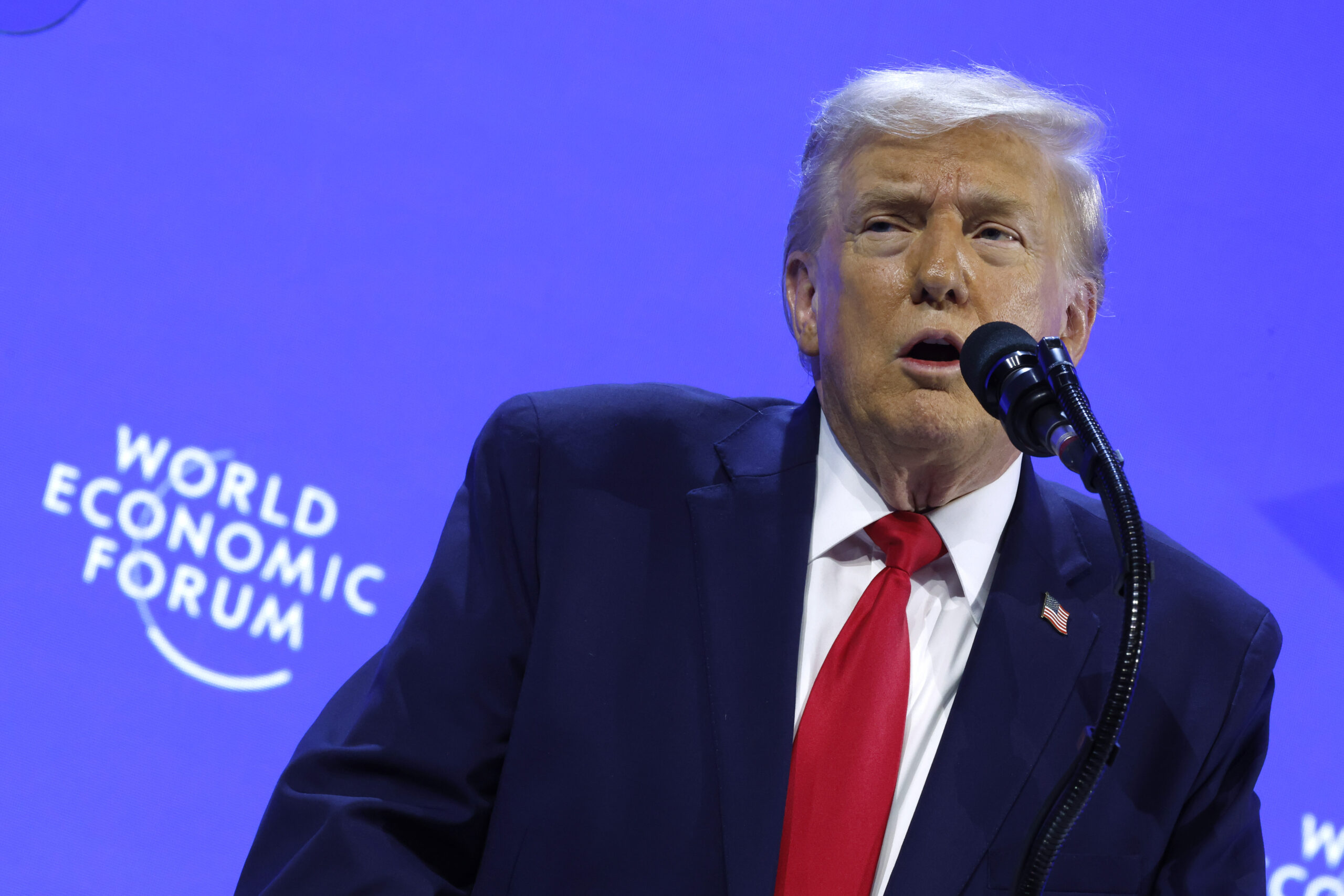
U.S.-Iran negotiations scheduled are ‘likely a diplomatic box-checking exercise and smokescreen,’ FDD’s Andrea Stricker said, while JINSA’s Jonathan Ruhe said U.S. military action is ‘unlikely for the moment’
Plus, White House press corps welcomes Hamas-friendly outlet
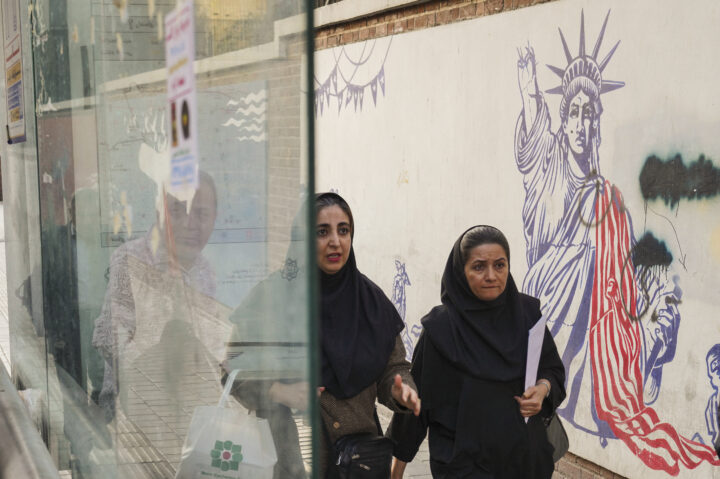
YAR/Middle East Images/AFP via Getty Images
Pedestrians walk past a mural bearing anti-American symbols on the outer wall of the former U.S. Embassy, now called the "U.S. Den of Espionage Museum," in Tehran, Iran, on October 26, 2025.
Good Monday afternoon!
This P.M. edition is reserved for our premium subscribers — offering a forward-focused read on what we’re tracking now and what’s coming next.
It’s me again — Danielle Cohen-Kanik, U.S. editor at Jewish Insider and curator, along with assists from my colleagues, of the Daily Overtime. Please don’t hesitate to share your thoughts and feedback by replying to this email.
📡On Our Radar
Notable developments and interesting tidbits we’re tracking
After weeks of rising tensions, the U.S. and Iran are back on the diplomatic track: White House Special Envoy Steve Witkoff is expected to meet with Iranian Foreign Minister Abbas Araghchi in Istanbul, Turkey, on Friday, Axios reports, possibly alongside Jared Kushner and the foreign ministers of several countries including Turkey, Qatar, Egypt, Oman, the UAE, Saudi Arabia and Pakistan.
What exactly will be up for discussion in the first meeting between the U.S. and Iran since the 12-day war last June is unclear — Iranian officials have said only nuclear activity is on the table, while the U.S. has traditionally maintained support for a comprehensive deal covering nuclear, missile and terror activity…
Before the dialogue in Turkey, Witkoff is slated to stop in Israel tomorrow to consult with Prime Minister Benjamin Netanyahu and Lt. Gen. Eyal Zamir, the IDF chief of staff, and hold meetings in the UAE and Qatar…
The parties are still covering all their bases: The U.S. and Israeli navies conducted a joint “routine maritime exercise” in the Red Sea today, after CENTCOM warned Iran’s Islamic Revolutionary Guard Corps on Friday to “avoid escalatory behavior at sea”…
Back in Washington, the White House tapped Drop Site News, a publication founded in 2024 to offer reporting explicitly hostile to Israel over the war in Gaza and the U.S. response to it, for the press corps’ new media seat on Sunday, Jewish Insider’s Gabby Deutch reports.
Drop Site has credulously interviewed several Hamas leaders, vigorously denied claims that Hamas terrorists raped anyone during the Oct. 7 attacks in Israel and supported the Iranian regime during the anti-government protests last month. Its inclusion among the outlets in Sunday’s press rotation (when no press briefing was held, so its reporter did not get the opportunity to ask a question) was a marked contrast to the mostly right-wing outlets that are usually selected…
And on the campaign trail, Sen. Tina Smith (D-MN) came out today in support of Minnesota Lt. Gov. Peggy Flanagan in the closely fought Democratic primary to replace her, joining fellow progressives Sens. Bernie Sanders (I-VT) and Elizabeth Warren (D-MA) in supporting Flanagan over the more moderate Rep. Angie Craig (D-MN). The endorsement comes days after fundraising reports for the final quarter of 2025 showed Craig raised double what Flanagan brought in ($2 million and $1 million, respectively)…
In New York City, Comptroller Mark Levine endorsed Rep. Dan Goldman (D-NY) in his primary against former Comptroller Brad Lander. Lander, challenging Goldman from the left on issues including his support for Israel, is endorsed by Mayor Zohran Mamdani, further highlighting divisions between Levine and the mayor as the two have sparred over issues including city investment in Israel bonds…
Jacobin profiles Diana Moreno, the democratic socialist running to fill Mamdani’s Queens seat in the state Assembly on a platform highlighting her progressive credentials as an organizer and immigrant.
“Moreno, wearing a keffiyeh, is featured in Mamdani’s launch video, pushing a stroller carrying her newborn son, saying ‘I want to raise my kid in New York.’ ‘I got pregnant one month after the genocide in Gaza started. My relationship to motherhood cannot be divorced from witnessing the world dehumanize children in Palestine,’” she said…
In New York’s 7th Congressional District, Councilmember Julie Won filed paperwork today to join the competitive race to replace retiring Rep. Nydia Velázquez (D-NY). All three candidates for the highly progressive district — which include Assemblymember Claire Valdez, who has the backing of Mamdani and the DSA, and Brooklyn Borough President Antonio Reynoso, who has been endorsed by Velázquez — have made comments critical of Israel.
On the one-year anniversary of the Oct. 7 attacks, Won expressed hope for a ceasefire and return of the hostages, mourning the 1,200 people “brutally killed” by Hamas in Israel and the “over 40,000 brutally killed in Palestine,” a figure Israel disputed at the time.
When a campaign last summer opposing a neighborhood development plan in her district invoked antisemitic rhetoric, Won denounced the move while maintaining her support for the “free Palestine” movement, saying in a statement, “It’s extremely alarming to me that someone would go so low to co-opt a movement of free Palestine for their own purpose — to incite anger and potentially violence … It’s shameful to compare Long Island City to Gaza — where people are literally losing their lives, land and starving to death — to this rezoning and blaming it on a local Jewish landlord who isn’t even part of the rezoning”…
Former Rep. Colin Allred (D-TX), who switched his candidacy from running for the open Texas Senate seat to its 33rd Congressional District, endorsed Rep. Jasmine Crockett (D-TX) for the Senate over his former primary rival, state Sen. James Talarico. Allred alleged that Talarico had called him a “mediocre Black man” and took aim at Talarico’s platform as a devout Christian: “You are not saving religion for the Democratic Party or the left,” Allred said…
⏩ Tomorrow’s Agenda, Today
An early look at tomorrow’s storylines and schedule to keep you a step ahead
Keep an eye out in Jewish Insider for the view from Washington on the continued possibility of U.S. strikes on Iran, even as diplomatic efforts unfold.
We’ll be watching for indications out of White House Special Envoy Steve Witkoff’s meetings in Israel on where the parties stand on engaging with Tehran.
It will be a busy day on the Hill, amid ongoing efforts to end the partial government shutdown: The House Foreign Affairs Committee will hold a hearing on U.S. policy towards Lebanon and “obstacles to dismantling Hezbollah’s grip on power” with testimony from several Washington Institute experts; the Senate Judiciary Committee will hold a hearing on the Nazis’ use of Swiss banks; the Helsinki Commission will hold a hearing on Russia’s influence in post-Assad Syria; and the Senate Foreign Relations Committee will hold a hearing on terrorism in North Africa.
The Jewish Community Relations Council of Greater Washington will host its Maryland advocacy day with Gov. Wes Moore as keynote speaker.
The World Governments Summit will kick off in Dubai, United Arab Emirates, with speakers including former Secretary of State Mike Pompeo, Lebanese Prime Minister Nawaf Salam, Spanish President Pedro Sánchez, Israeli philanthropist and Mobileye CEO Amnon Shashua and several other world leaders.
Stories You May Have Missed
DIPLOMATIC SPAT
South Africa banishes Israeli diplomat days before vote in Congress on trade benefits
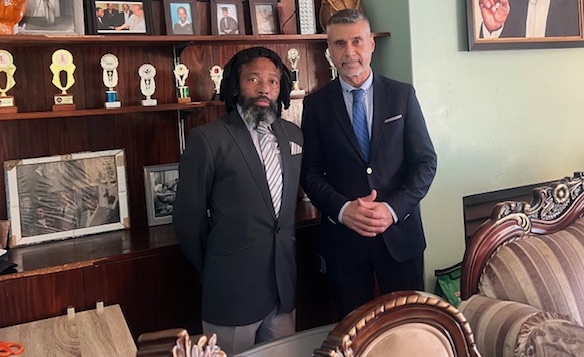
Pretoria angered after Israel offers parched region water management aid; Jerusalem declares South African diplomat serving Palestinians persona non grata
Plus, car ramming suspect charged with multiple hate crimes
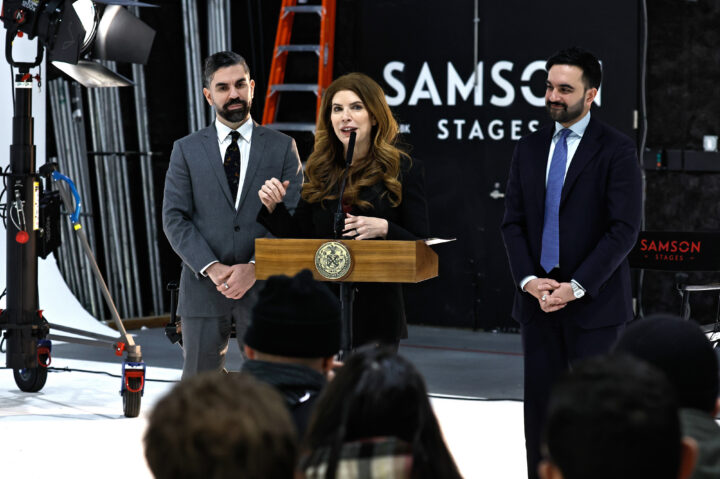
John Lamparski/Bloomberg via Getty Images
Julie Menin, speaker of the New York City Council, and Mayor Zohran Mamdani on Jan. 12, 2026.
Good Thursday afternoon!
This P.M. edition is reserved for our premium subscribers — offering a forward-focused read on what we’re tracking now and what’s coming next.
It’s me again — Danielle Cohen-Kanik, U.S. editor at Jewish Insider and curator, along with assists from my colleagues, of the Daily Overtime. Please don’t hesitate to share your thoughts and feedback by replying to this email.
📡On Our Radar
Notable developments and interesting tidbits we’re tracking
After a car repeatedly drove into Chabad Lubavitch world headquarters in Brooklyn last night, New York City Council Speaker Julie Menin announced today she is creating a council task force to combat antisemitism, even as Mayor Zohran Mamdani has said he plans to retain the mayor’s Office to Combat Antisemitism (and told local news today he’s “in the final stages” of hiring someone to lead it). The council task force’s co-chair is Councilwoman Inna Vernikov, an outspoken critic of Mamdani…
The suspect arrested in the car ramming has been charged with attempted assault, reckless endangerment, criminal mischief and aggravated harassment, all enhanced as hate crimes, the NYPD announced this afternoon…
And in the wake of several protests that have disrupted New York Jewish communities in recent months, Menin also introduced a bill that would ban protests within 100 feet of a house of worship — more stringent than Gov. Kathy Hochul’s proposal of a 25-foot ban.
“The First Amendment right to peacefully protest is sacrosanct. What’s not sacrosanct is inciting violence, intimidation and harassment,” Menin told The New York Times, though some experts cast doubt on the constitutionality of the measure…
Rep. Tim Walberg (R-MI), the chair of the House Committee on Education & Workforce, sent a letter to Evanston, Ill., Mayor Daniel Biss — who is running for Congress to replace retiring Rep. Jan Schakowsky (D-IL) — requesting a briefing on Biss’ role in the 2024 anti-Israel encampment at Northwestern University.
Walberg alleged that Biss had failed “to protect Jewish students” at Northwestern “by refusing to give the university the police support it desperately needed to clear its violent and antisemitic encampment,” which resulted in a failure to arrest protesters who had harassed Jewish students. Biss has also drawn condemnation for allegedly walking back his pro-Israel positions once he was denied the support of AIPAC in his congressional campaign…
Rep. Haley Stevens (D-MI) raised $2.1 million for her Senate campaign in the final quarter of 2025, she announced today, bringing her total raised to $6.8 million. But a new Emerson College poll of the race to replace Sen. Gary Peters (D-MI) shows that haul may not be making an impact among primary voters just yet — Stevens polled at 17% to state Sen. Mallory McMorrow’s 22%, with 38% still undecided.
In a general election matchup against presumptive GOP nominee former Rep. Mike Rogers (R-MI), both McMorrow and Stevens poll ahead of Rogers, 46-43% and 47-42% respectively, with 15% undecided. In all cases, physician Abdul El-Sayed, a progressive Democrat who has made his hostility to Israel a central component of his campaign, polls behind his opponents…
The Democratic primary in New York’s 17th Congressional District got a little less crowded today: Former FBI agent John Sullivan, who served as the top bureau intelligence official in Israel from 2017-2020, dropped out of the race to challenge Rep. Mike Lawler (R-NY).
“While my congressional campaign is coming to an end, my dedication to our community is not,” Sullivan wrote, telling supporters to “stay tuned.” He did not endorse any of the remaining Democratic candidates, which include front-runner Beth Davidson, a Rockland County legislator, and national security veteran Cait Conley…
The U.S. Navy dispatched an additional warship, the USS Delbert D. Black, to the Middle East in the past two days amid heightened tensions with Iran, Reuters reports, bringing the total number of destroyers in the region to six, in addition to an aircraft carrier…
The European Union voted unanimously to designate Iran’s Islamic Revolutionary Guard Corps as a terrorist organization today, Jewish Insider’s Matthew Shea reports, in a move anticipated after several countries including Italy and France rescinded their long-held objections to the move.
“Repression cannot go unanswered,” Kaja Kallas, the EU’s high representative for foreign affairs and security policy, wrote on X following the decision. “Any regime that kills thousands of its own people is working toward its own demise”…
Sens. Lindsey Graham (R-SC) and Richard Blumenthal (D-CT) introduced the “Save the Kurds Act” in response to the Syrian government’s campaign against the Kurdish-led and U.S.-backed Syrian Democratic Forces. The legislation would impose sanctions on “Syrian government officials and financial institutions, and any foreign individual who engages in any transaction, including military or financial support, with the Syrian government,” according to a press release.
The bill would also redesignate as a terror organization Hayat Tahrir al-Sham (HTS), the al-Qaida offshoot that Syrian President Ahmad al-Sharaa led before ousting dictator Bashar al-Assad. The Trump administration removed HTS’ terror designation and U.S. sanctions on Syria after al-Sharaa assumed the presidency…
A draft resolution from the Board of Peace dictating the powers of the bodies overseeing postwar Gaza seems to relegate the Gaza Executive Board — whose inclusion of Turkey and Qatar had concerned Israel — to an advisory role for another committee largely made up of White House advisors, The Times of Israel reports. The resolution, which also increases the Trump administration’s role in managing that body, still must be signed by the president…
A man was tried in federal court today for attempting to assassinate former President Joe Biden over anti-Israel animus, traveling to Georgia with a firearm in June 2024 to sneak into a presidential debate hosted by CNN so he could reach Biden, according to the Justice Department.
The man’s manifesto was addressed to “all the Palestinian journalists … and in remembrance of the ones who lost their lives along the way” and said, “It’s time we overthrow these bastards and threaten to pull a f**king D-Day on Tel Aviv,” concluding with “Free Palestine”…
A bipartisan delegation of lawmakers organized by the AIPAC-affiliated American Israel Education Foundation met with Israeli Prime Minister Benjamin Netanyahu in Jerusalem today, including Reps. Ryan Zinke (R-MT), Jen Kiggans (R-VA), Jake Ellzey (R-TX), Mike Bost (R-IL) and Don Davis (D-NC)…
⏩ Tomorrow’s Agenda, Today
An early look at tomorrow’s storylines and schedule to keep you a step ahead
Keep an eye out in Jewish Insider for a look at the legacy of constitutional lawyer and Jewish activist Nat Lewin, who turns 90 this weekend.
Several Jewish and pro-Israel organizations were invited to a meeting with Saudi Defense Minister Khalid bin Salman, who is in Washington meeting with Trump administration officials, tomorrow afternoon, JI’s Danielle Cohen-Kanik has learned, amid a sharp rise in antisemitic and anti-Israel rhetoric from the kingdom. It’s not clear which organizations will be attending, though the Foundation for Defense of Democracies confirmed it will sit down with KBS separately in the morning.
We’ll be back in your inbox with the Daily Overtime on Monday. Shabbat Shalom!
Stories You May Have Missed
PASTOR’S POLEMIC
Contender to succeed Jasmine Crockett blasted Israeli ‘apartheid’ in sermon on Oct. 8
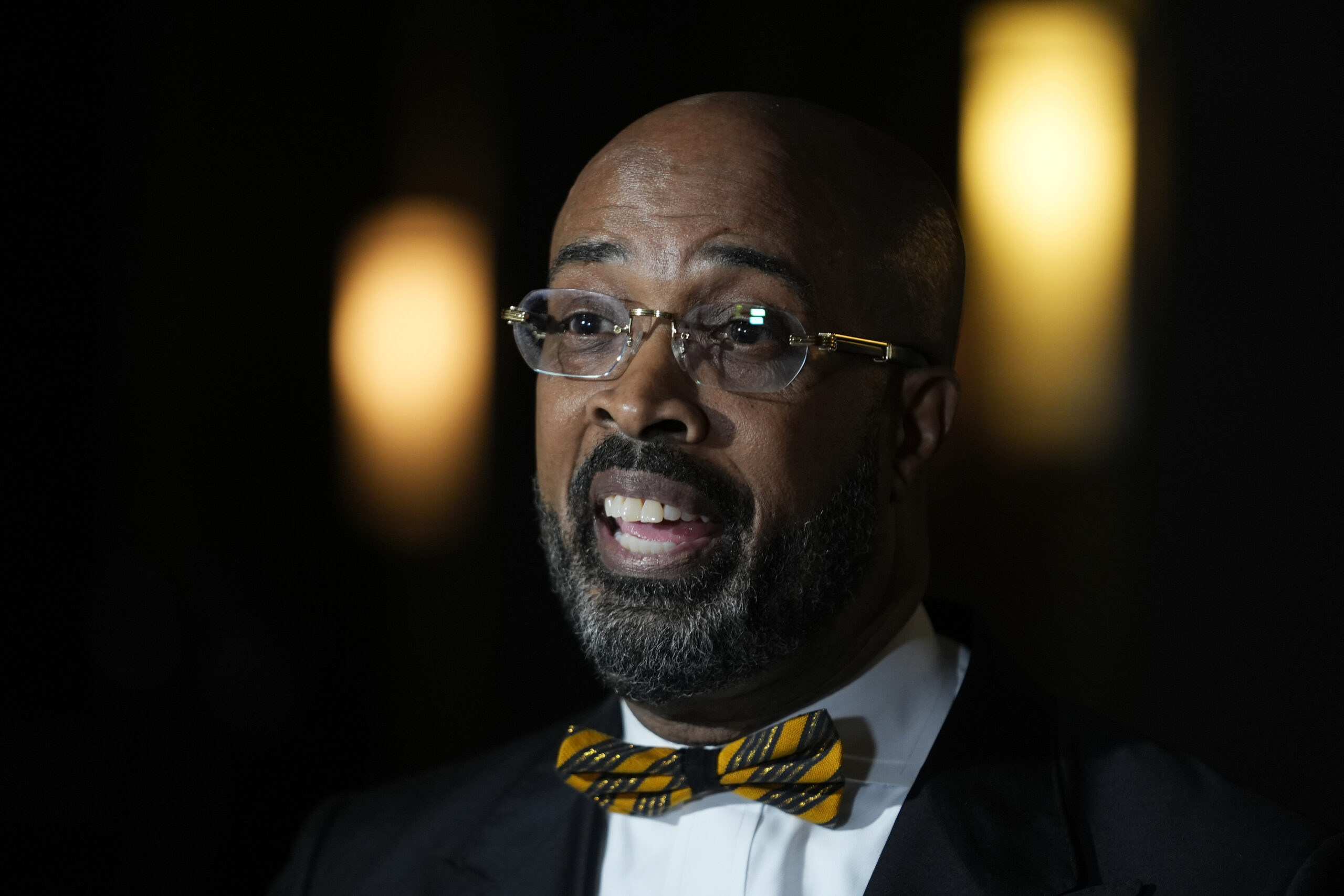
Singer told JI that his alignment with Rev. Frederick D. Haynes III delivered an anti-Israel polemic from the pulpit on Oct. 8, 2023, the day after Hamas’ attack on Israel
Plus, Biden officials don't hold back on criticism of Bibi

Mass Communication Specialist 3rd Class Amber Smalley/U.S. Navy via Getty Images
Flight deck of the Nimitz-class aircraft carrier USS Abraham Lincoln (CVN 72) May 10, 2019 in the Red Sea.
Good Wednesday afternoon!
This P.M. edition is reserved for our premium subscribers — offering a forward-focused read on what we’re tracking now and what’s coming next.
It’s me again — Danielle Cohen-Kanik, U.S. editor at Jewish Insider and curator, along with assists from my colleagues, of the Daily Overtime. Please don’t hesitate to share your thoughts and feedback by replying to this email.
📡On Our Radar
Notable developments and interesting tidbits we’re tracking
President Donald Trump indicated he’s losing patience with Iran: He posted a stark warning on Truth Social this morning that a “massive Armada is heading to Iran” and “it is ready, willing, and able to rapidly fulfill its mission, with speed and violence, if necessary.”
Trump encouraged Tehran to come back to the negotiating table where he demanded it have “no nuclear weapons” — a position that differs from Israel’s, which has said Iran must not be allowed to enrich uranium at all — but made no mention of the protesters Trump had pledged to protect…
Despite Trump’s threat, Secretary of State Marco Rubio told lawmakers at a Senate Foreign Relations Committee hearing today that the “armada” of military assets being moved to the Middle East is primarily defensive, Jewish Insider’s Marc Rod reports.
Rubio noted that 30,000-40,000 U.S. troops in the region are “within the reach of an array of thousands of Iranian” drones and missiles. “We have to have enough force and power in the region, just on a baseline, to defend against that possibility,” he explained.
In addition, “the president always reserves the preemptive defensive option — in essence, if we have indications that, in fact, they’re going to attack our troops in the region,” Rubio continued, as well as security agreements to defend allies such as Israel “that require us to have a force posture in the region.”
Rubio admitted the U.S. has little clarity on who would govern Iran if the regime collapses: “I don’t think anyone can give you a simple answer as to what happens next in Iran if the supreme leader and the regime were to fall, other than the hope that there would be some ability to have somebody within their systems you could work towards a similar transition” as the U.S. has supported in Venezuela…
Rubio was also questioned by senators about the Board of Peace: He clarified that “the primary and sole focus of that board right now is to administer Phase 2 and Phase 3 of the plan in Gaza,” despite broad language in the body’s charter, and acknowledged that some European allies have declined to join over their concern that the board is competing with the U.N. “This is not a replacement for the U.N. But the U.N. has served very little purpose in the case of Gaza,” Rubio said…
As their own response to Iran’s violent suppression of protests, several European countries changed their position to support the EU designating the Islamic Revolutionary Guard Corps as a terror organization, a move they have historically opposed over fears of irreparably severing ties with Tehran.
Ahead of a Thursday meeting of EU foreign ministers in Brussels — where the bloc was already expected to approve additional sanctions on Iran — Italy, Germany and earlier today France announced they would support the designation, teeing up its approval, which must be unanimous, at tomorrow’s meeting…
The State Department found that the Palestinian Authority paid more than $200 million to terrorists and their families in 2025, the Washington Free Beacon reports, despite the PA claiming it had ended its “pay-to-slay” program last February.
The PA merely “transferred responsibility” for the payments to a new body “under the guise of social welfare,” a report provided to Congress laid out, with evidence from post offices, social media and Telegram “indicating clearly that the compensation in support of terrorism has continued”…
Biden administration officials jumped to the defense of the former president’s Israel policy after Israeli Prime Minister Benjamin Netanyahu alleged in a press conference yesterday that some IDF soldiers had been killed in Gaza due to a U.S. arms embargo that caused Israel to run out of ammunition during the Biden presidency.
Brett McGurk, Biden’s senior Middle East advisor, told Axios that Netanyahu’s comments were “categorically false” and that Biden’s “commitment to Israel’s security to include U.S. military assistance was unwavering”; diplomat Amos Hochstein slammed Netanyahu as “ungrateful to a president that literally saved Israel at its most vulnerable moment”; and former State Department antisemitism envoy Deborah Lipstadt said that to ignore Biden’s support for Israel “is to ignore history”…
Syrian President Ahmad al-Sharaa visited Moscow today where he and Russian President Vladimir Putin discussed Russia’s continued military presence in the country, Syrian state media reported. Despite its historic backing of longtime Syrian leader Bashar al-Assad, Moscow did not oppose al-Sharaa’s ouster of the dictator, though Russia has sheltered Assad and his family since they fled Damascus.
Russia has begun pulling out from its position in northeast Syria in an area still controlled by the Kurdish-led Syrian Democratic Forces, as Damascus mounts a campaign to oust them, though Moscow reportedly hopes to keep its naval and air bases on the Syrian coast…
⏩ Tomorrow’s Agenda, Today
An early look at tomorrow’s storylines and schedule to keep you a step ahead
Keep an eye out in Jewish Insider for an interview with former Rep. Elaine Luria (D-VA), as she seeks to reclaim her former seat and shore up support for Israel among her Democratic colleagues.
Pennsylvania Gov. Josh Shapiro will speak at Washington’s Sixth & I synagogue in conversation with Sen. Raphael Warnock (D-GA) about the governor’s new memoir, Where We Keep the Light.
The Hudson Institute will host a conversation with Jacob Helberg, the under secretary of state for economic affairs, as he returns from a trip around the Middle East where he brought Qatar and the United Arab Emirates into the Pax Silica initiative and signed a joint AI strategic framework in Israel.
Stories You May Have Missed
FLORIDA FIGHT
Boca Raton Mayor Scott Singer, a Republican, hopes shift to right will push him to victory against Moskowitz
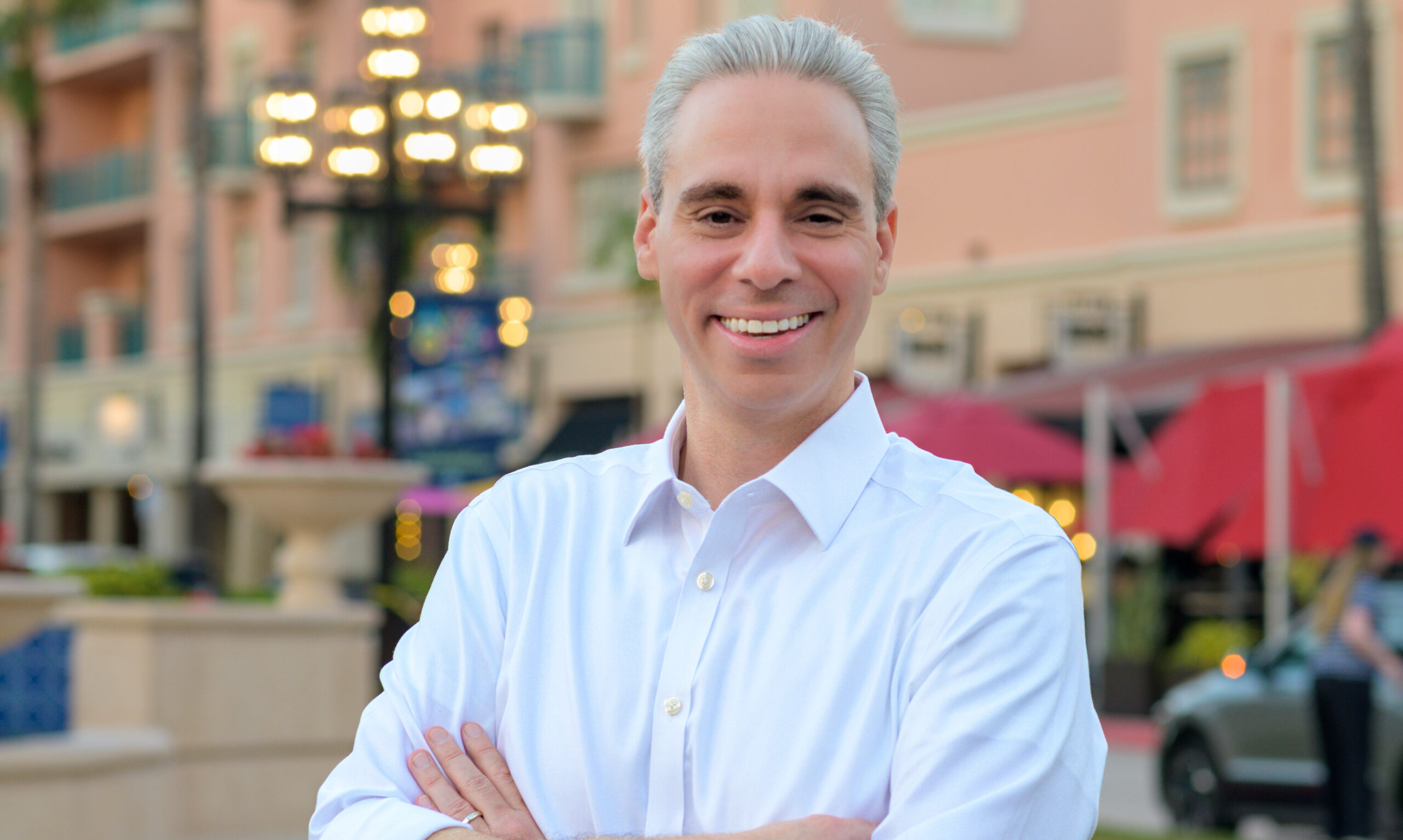
Singer told JI that his alignment with the GOP has been shaped by his Jewish faith
But, the president noted, the regime is ‘shooting people indiscriminately in the streets’
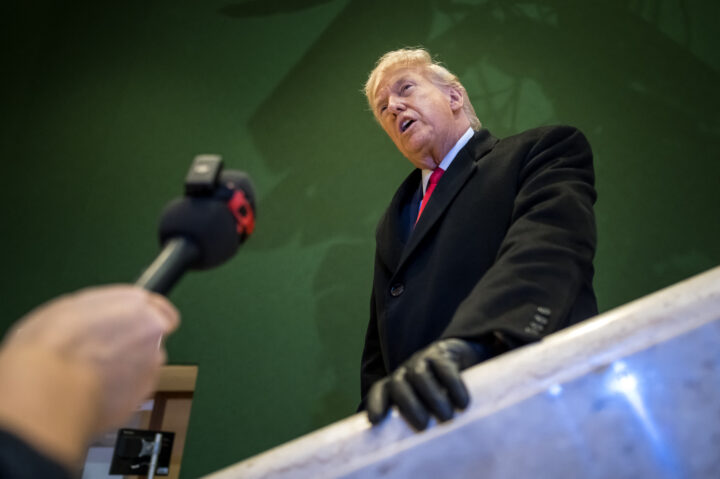
Fabrice COFFRINI / AFP via Getty Images
President Donald Trump as he leaves the World Economic Forum (WEF) annual meeting in Davos on January 21, 2026.
President Donald Trump said Wednesday that he hopes no military action will be needed in Iran, but stopped short of ruling it out as the U.S. continues to move military assets to the Middle East.
“We hope there’s not going to be further [military] action,” Trump said during an interview with CNBC on the sidelines of the World Economic Forum in Davos, Switzerland, while alluding to the fact that it still might be a possibility given Tehran’s conduct in suppressing nationwide demonstrations. “But you know, [the regime is] shooting people indiscriminately in the streets.”
The president has previously called the Iranian regime’s killing of protesters a “red line” and vowed to protesters that “help is on its way.” Trump repeated his claim on Wednesday that Iranian authorities had planned to hang 837 protesters last week, but “canceled it” after he warned them not to.
Trump has thus far refrained from authorizing military action against Iran — even as the U.S. has continued to move military assets to the Middle East in preparation for potential escalation, with reports indicating that the Pentagon has relocated more F-15 fighter jets to the region in recent days.
When asked by CNBC’s Joe Kernen whether people should “stay tuned” on Iran, Trump was noncommittal: “I guess — I mean, look, it’s a rough place,” he said.
White House Special Envoy Steve Witkoff, also at Davos, told Bloomberg News that diplomatic engagement remains possible if Tehran changes course.
“Iran needs to change its ways,” Witkoff said. “If they indicate that they’re willing to do that, I think we can diplomatically settle this.” But asked if he believes Iran wants to take the diplomatic path, Witkoff said, “We don’t have that sense yet.”
Still, the president noted that if Tehran were to continue pursuing nuclear capabilities, an attack similar to the U.S. strikes on Iranian nuclear sites last June is “going to happen again.”
“They keep experimenting with nuclear, and, you know, at some point they’re going to get the idea that they can’t do that,” he said.
As the demonstrations in Iran grew and the regime’s response grew more violent, international talk about Israeli airstrikes subsided to near-silence
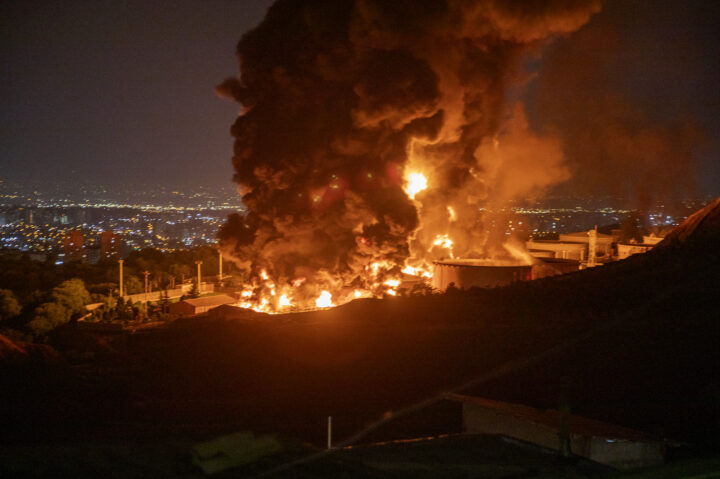
Stringer/Getty Images
Fire and smoke rise into the sky after an Israeli attack on the Shahran oil depot on June 15, 2025 in Tehran, Iran.
The mass protests across Iran erupted just over two weeks ago — the same day that Israeli Prime Minister Benjamin Netanyahu flew to Palm Beach, Fla., to meet with President Donald Trump.
The big question as Netanyahu and Trump met was whether the president would give Israel a green light to strike Iran as it reconstituted its ballistic missile program at a pace that raised major concerns in Jerusalem. Trump’s response was a resounding yes, adding that if Iran would start rebuilding its nuclear program, the answer would be yes and “fast.”
At the same time, Israeli defense figures and officials made it known through the media that Jerusalem’s more immediate worry was that Tehran would misinterpret events and strike Israel first. Netanyahu reportedly told Russian President Vladimir Putin that Israel is not interested in escalating, but Ayatollah Ali Khamenei, Iran’s supreme leader, appeared to reject the overture in a post on X, saying “the malicious enemy is a deceiving liar.”
But as the demonstrations in Iran grew and the regime’s response grew more and more violent – Iran International reported 12,000 protesters have been killed as of Tuesday morning, while an Iranian official put the death toll at 2,000 – international talk about Israeli airstrikes subsided to near-silence.
Asked how Israel’s calculation about striking Iranian missile or nuclear sites may have changed in the last two weeks, former Israeli Ambassador to the U.S. Michael Oren told Jewish Insider’s Lahav Harkov on the “Misgav Mideast Horizons Podcast”: “With the United States threatening to intervene, what would we have to gain from this? Other than providing a pretext for the Iranians to strike back at us. I think we’re operating responsibly, prudently.”
Still, Israelis remain jittery about a second round of war with Iran, to the extent that the IDF’s spokesperson, Brig.-Gen. Effie Defrin, released a statement on Monday evening warning that “in recent days, many rumors have circulated in light of the situation in Iran. …The IDF is prepared defensively and remains on alert for surprise scenarios if required. The protests in Iran are a domestic matter. …We will provide updates if there are any changes. I emphasize: Do not lend a hand to rumors.”
Hostile actors — like the Hamas-affiliated Palestine Chronicle – misrepresented the Israeli Health Ministry’s distribution on Monday of new emergency preparation instructions incorporating the lessons of June’s 12-day war, as though hospitals were imminently entering emergency mode — even though the ministry’s letter explicitly said there is no need to do so. Other false reports stated that local governments in Israel had opened bomb shelters, leading several municipalities to issue denials.
Netanyahu said in Sunday’s Cabinet meeting that Israel is “closely monitoring what is happening in Iran. The demonstrations for freedom spread throughout the country. The people of Israel, the whole world, are amazed by the great courage of the citizens of Iran. Israel supports their struggle for freedom and strongly condemns the massacres of innocent civilians. We all hope the Persian people will soon be freed from the yoke of tyranny, and when that day arrives, Israel and Iran will go back to being faithful partners in building a future of prosperity and peace for both nations.”
Yet, hours later, he ordered a media blackout on the topic, silencing Intelligence Minister Gila Gamliel and Diaspora Minister Amichai Chikli, who have signaled their support for Reza Pahlavi, son of the deposed Shah.
Oren said that “Israel has only to gain from” the protests.
As to accusations from the Iranian regime — as well as American extremist podcasters on the right and left — Oren said: “I think Israel, and I say this very guardedly, has the ability to assist the protesters with communications, with information. … Are we providing them with arms? No, Are we saying we’re going to intervene militarily to help bring down the regime? We’re not saying that, and I think that’s why it was prudent to put the kibosh on those ministers who are flexing their muscles publicly vis-a-vis Iran.”
Two sources told JI the president pushed back on Netanyahu’s claims about the prudence of Israel’s proposal to end U.S. military assistance over the next decade
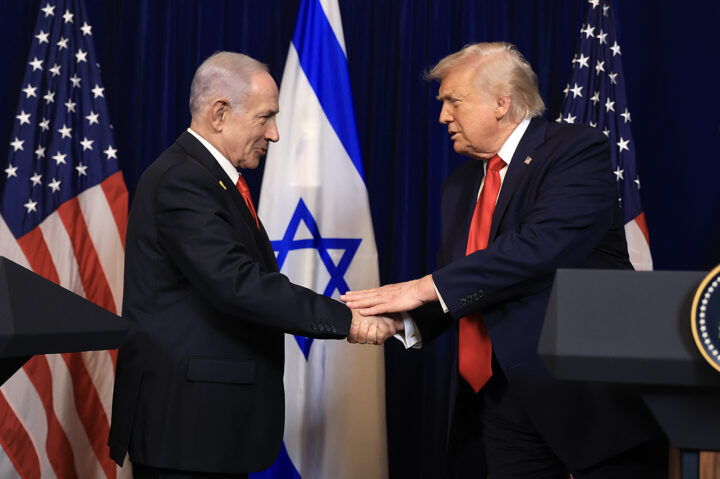
Joe Raedle/Getty Images
President Donald Trump shakes hands with Israeli Prime Minister Benjamin Netanyahu during a press conference at his Mar-a-Lago club on December 29, 2025 in Palm Beach, Florida.
When Israeli Prime Minister Benjamin Netanyahu proposed winding down U.S. military aid late last year, President Donald Trump was bewildered and did not immediately support the move, two sources familiar with the matter told Jewish Insider.
Since then, Netanyahu has announced his intentions to move ahead with the plan anyway.
Netanyahu pitched the president on his proposal while visiting Trump at his Mar-a-Lago estate in Palm Beach, Fla., in late December, the Israeli prime minister told The Economist in an interview released on Friday. The idea was spearheaded by Ron Dermer, Israel’s former minister of strategic affairs and a top Netanyahu advisor, according to two sources familiar with the matter.
Dermer has defended the idea to U.S. lawmakers and other officials, arguing that such a move would improve the Jewish state’s embattled reputation in the United States, a claim that Netanyahu repeated to Trump. Since Dermer left government late last year, Israeli Ambassador to the U.S. Yechiel Leiter has become the point person on the matter, a source close to the prime minister told JI.
Netanyahu even suggested that Israel may not take or could return some of the military aid it is set to receive from the U.S. in 2027 and 2028 under the terms of the current memorandum of understanding, one source said.
Trump could not understand why Netanyahu would propose ending American military aid to Israel and disagrees that the move would improve U.S. public opinion on the Jewish state, one source familiar with the president’s perspective told JI. He is skeptical that the plan would benefit either country, but is also not dismissing it out of hand, they said.
Netanyahu departed Trump’s Palm Beach resort on New Year’s Day without having committed to going through with or abandoning the plan. He continued engaging with U.S. lawmakers about the idea in the week and a half that followed, two congressional sources familiar with the matter said, with Netanyahu ultimately announcing last week that the plan was “in the works.”
“We’ve come of age and we’ve developed incredible capacity,” Netanyahu told The Economist. “And our economy, which will reach, certainly within a decade, will reach about a trillion dollars — it’s not a huge economy, but it’s not a small economy. So I want to taper off military aid within the next 10 years.”
“And that’s not saying that I don’t want to fight for the allegiance and support of the American people — I do, you would have to be crazy not to,” he continued.
White House Deputy Press Secretary Anna Kelly told JI in a statement regarding the meeting that “Israel has had no better friend in its history than President Trump. The administration continues to work closely with our ally Israel to successfully implement the President’s 20 Point Plan for Peace and strengthen regional security in the Middle East. We do not detail the President’s private conversations — any announcements would come from the administration directly.”
The apparent disconnect between the Israeli and U.S. positions on aid comes as the next MOU is being negotiated between the two countries, with the current 10-year agreement coming to an end in 2028.
One source said they understand Trump to be supportive of continued aid, something the Israelis have miscalculated, because “the president sees the aid relationship as a bridge to potentially restoring American manufacturing; essentially, giving Israel money to invest in the American industrial base.”
Israel receives $3.3 billion annually from the U.S. under the current MOU in foreign military financing, which usually must be used to purchase American defense products and services. Israel is unique in that it is allowed to use a portion of its FMF for domestic procurement, a benefit that is set to be phased out by the MOU’s end in 2028.
The other $500 million that Israel receives annually under the MOU is earmarked for joint missile-defense programs, such as Iron Dome, David’s Sling and the Arrow systems, which is appropriated directly to the Department of Defense, similarly to other U.S.-Israel cooperative programs including anti-tunneling and drone initiatives. This method of funding, appropriated to the U.S. government rather than directly to Israel, could be expanded to replace FMF if it is wound down.
Likud lawmaker Amit Halevi, who has been the primary engine within the party pushing to phase out U.S. military aid, told JI that the model Israel has been presenting to the Trump administration and on Capitol Hill is this one of “joint projects and investments.”
While Netanyahu has not detailed what he thinks phasing out U.S. aid would entail, Halevi’s proposal involves shifting to jointly funded research and development projects in defense, cybersecurity and intelligence.
Halevi said that Netanyahu “has a list of things he wants to get done before the next election,” which is officially set for late October but could take place sooner, and that an “MOU that he sees as an achievement” is likely on that list.
The Likud MK has led multiple Knesset subcommittee meetings on the matter, in which representatives from Dermer’s office said they were seriously discussing changing the military aid model.
Halevi argued that Netanyahu’s remarks in The Economist interview are unique in that it is the first time the prime minister is saying he wants Israel to eventually receive no aid at all.
Two of Netanyahu’s spokespeople, however, said that Netanyahu’s position is not new, citing his comments to conservative commentator Ben Shapiro in October and Australian journalist Erin Molan in November. In both interviews, Netanyahu recounted that he phased out American financial aid to Israel in his first term in office in 1996, and that he intends to do the same for military aid.
“I am committed to making Israel as fully self-sufficient as possible,” Netanyahu told Shapiro. “We can transform our military defense industry, make a quantum jump to be able to be self-sufficient and to share with America the extraordinary developments that we have.”
Netanyahu also said in a Cabinet meeting in May that “we receive close to $4 billion for arms. I think we will have to wean ourselves off of American security aid.”
His spokespeople had no further comment when asked if anything had changed in light of Netanyahu’s meeting with Trump in December.
Last March, Leiter canceled a meeting with Halevi over his advocacy on the Hill against continuing aid. Weeks earlier, Leiter pulled out of a Heritage Foundation event due to the publication of a paper that called for the gradual elimination of U.S. aid to Israel.
Yet, in September, reflecting the shift in Israel’s position, Leiter told JI that “the nature of any MOU or collaborative effort is going to change,” and it may consist of “greater [joint] research and development between our two countries, rather than relying on American weapons.”
One American source familiar with the negotiations said, “The Israelis just have to come in and ask for what they need and stop trying to figure out what the U.S. wants to hear.”
Meeting in Florida, Trump and Netanyahu projected unity but highlighted disagreements on Turkey, Syria and the West Bank

Joe Raedle/Getty Images
President Donald Trump shakes hands with Israeli Prime Minister Benjamin Netanyahu during a press conference at his Mar-a-Lago club on December 29, 2025 in Palm Beach, Florida.
President Donald Trump vowed on Monday that he would support the U.S. or Israel launching another round of strikes against Iran if Tehran is attempting to rebuild its ballistic missile program or nuclear facilities.
Trump made the comments while speaking to reporters from his Mar-a-Lago estate in Palm Beach, Fla., alongside Israeli Prime Minister Benjamin Netanyahu for the latter’s fifth visit to the United States this year.
Asked if he will support another Israeli attack on Iran if they continue their ballistic missile and nuclear programs, Trump said, “If they continue with the missiles? Yes. If the nuclear? Fast, okay? One will be yes, absolutely; the other was, we’ll do it immediately.”
He added later, “If they are [rearming], we’re going to have no choice but very quickly to eradicate that build up. … We don’t want to waste the fuel on a B-2 [bomber]. It’s a 37-hour trip, both ways, I don’t want to waste a lot of fuel,” suggesting the U.S. would again utilize its bomber jets that conducted the June strikes on Iran’s nuclear facilities.
The president repeatedly urged Tehran to return to the negotiating table with the U.S. while cautioning that the regime would face consequences for declining his offer to address the nuclear issue diplomatically. “They could have made a deal the last time before we went through the big attack on them, and they decided not to make the deal. They wish they made that deal. So I think, again, they should make a deal,” he said.
About reports that Iran is rearming, Trump said, “Iran may be behaving badly. It hasn’t been confirmed, but if it’s confirmed, look, they know the consequences.”
“This is just what we hear, but usually where there’s smoke, there’s fire,” he continued. “I’m hearing that their [efforts are] not nuclear yet, but maybe nuclear, too. The sites were obliterated, but they’re looking at other sites [than the ones the U.S. bombed in June]. That’s what I’ve heard. They’re looking. It’ll take a long time. They’re not going to go back to where they were, but they have other places they can go. And if they’re doing that, they’re making a big mistake.”
Trump repeatedly praised Turkish President Recep Tayyip Erdogan in his remarks with Netanyahu, pledging to thaw tensions between the Turkish and Israeli leaders and repeated that he was “very seriously” considering approving Turkey’s longstanding requests to purchase F-35 fighter jets from the United States. “We’re thinking about it very seriously,” Trump said about the move, which Israeli Ambassador to the U.S. Yechiel Leiter said last month that Israel opposes.
“I know President Erdogan very well, and as you all know, he’s a very good friend of mine … and I do respect him and Bibi respects him, and they’re not going to have a problem,” Trump said.
Speaking to reporters alongside Netanyahu ahead of their meeting, Trump also voiced his support for Turkey joining the proposed U.S.-led International Stabilization Force to be deployed in Gaza.
“I have a great relationship with President Erdogan, and we’ll be talking about it. And if it’s good, I think that’s good. And a lot will be having to do with Bibi, we’re going to be talking about that,” Trump said. “But Turkey has been great, and he [Erdogan] has been excellent, as far as I’m concerned. I don’t know about you [Netanyahu], but to me he’s been very good.”
Netanyahu did not comment on the suggestion at the time or during the press conference later on, though Israel, as well as several U.S. lawmakers, has said it opposes Ankara’s involvement in the proposed peacekeeping force due largely to Turkey’s ties to Hamas, despite the supportive posture from the Trump administration.
The president later used the topic of Syria to again praise Erdogan, arguing the Turkish leader deserved “a lot of credit” for ousting the Assad regime.
“Don’t forget, it was President Erdogan that helped very much get rid of a very bad ruler of Syria. That was President Erdogan, and he never wanted the credit for it, but he really gets a lot of credit. Bibi agrees with that. … I know it,” Trump told reporters.
The president went on to say that the U.S. and Israel “have an understanding regarding Syria” and that he was working to improve relations between the Jewish state and its neighbor, praising Syrian President Ahmad al-Sharaa along the way.
“We do have an understanding regarding Syria. Now with Syria, your new president. I respect him. He’s a very strong guy. That’s what you need in Syria. You can’t put a choir boy, you can’t put somebody that’s a perfect person — everything’s nice, no problems in life,” Trump said.
“I’m sure that Israel and him will get along,” he continued. “I will try and make it so that they do get along. I think they will.”
For its part, Israel has been wary of al-Sharaa and the new Syrian government, with the IDF maintaining control of the 155-square-mile buffer zone between the two countries since the fall of Syrian dictator Bashar Assad last year, against Damascus’ wishes. Israel and Syria have also continued to disagree on the contours of a potential security agreement, which the Trump administration has continuously sought, with Netanyahu maintaining that any agreement must require Syria to accept the demilitarization of territory stretching from southern Damascus to the Israeli border.
Trump was also asked about the Lebanese government’s failure thus far to disarm Hezbollah, amid reports that the terror group is rearming. The president demurred when pressed on his support of Israel striking Hezbollah targets in Lebanon again as a result, instead only acknowledging his disapproval with the terrorist organization.
“Well, we’re going to see about that. We’ll see about it,” Trump said. “The Lebanese government is at a little bit of a disadvantage, if you think of it, with Hezbollah, but Hezbollah has been behaving badly. So we’ll see what happens.”
Asked about attacks by Israeli settlers against Palestinians, Trump acknowledged that he and Netanyahu discussed the West Bank during the meeting and that they’re not in complete alignment on the issue. Still, Trump expressed confidence that all parties would reach “a conclusion” to prevent the matter from undermining the implementation of his broader peace plan, though he declined to offer specifics.
“Well, we have had a discussion, big discussion, for a long time on the West Bank. And I wouldn’t say we agree on the West Bank 100%, but we will come to a conclusion on the West Bank. … It’ll be announced at an appropriate time, but [Netanyahu] will do the right thing. I know that. I know him very well. He will do the right thing,” he said.
Trump also expressed gratitude during his remarks for being named the recipient of the Israel Prize, the Jewish state’s highest cultural honor awarded by the country’s education minister. Netanyahu said Trump will be the first non-Israeli to receive the award, which the president said “really is a great honor.”
Netanyahu invited Trump to visit Israel on Yom Ha’atzmaut, the Jewish state’s independence day, in April, which will be an election year, to receive the award in person.
Joined by Trump at his the meeting with Netanyahu were White House Chief of Staff Susie Wiles; Stephen Miller, deputy chief of staff for policy at the White House; Secretary of State Marco Rubio; Defense Secretary Pete Hegseth; Gen. Dan Caine, the chairman of the Joint Chiefs of Staff; Steve Witkoff, the White House’s Mideast envoy; and Jared Kushner, Trump’s advisor on Middle East efforts.
Netanyahu also met individually with Secretary of State Marco Rubio and Defense Secretary Pete Hegseth while at the president’s property.
The members say the Vermont senator hasn’t attended council meetings and that his rhetoric, accusing Israel of committing genocide, runs counter to the museum’s mission

Kevin Dietsch/Getty Images
Sen. Bernie Sanders (I-VT), joined by fellow senator Sen. Jeff Merkley (D-OR) (R), speaks at a news conference on restricting arms sales to Israel at the U.S. Capitol on November 19, 2024 in Washington, DC.
Several Trump appointees to the board of the United States Holocaust Memorial Museum are pushing for the ouster of Sen. Bernie Sanders (I-VT), alleging that he has rarely attended meetings and that his accusations of genocide against Israel run counter to the museum’s mission.
Sanders has served on the council for nearly two decades.
The board, formally known as the Holocaust Memorial Council, is mostly made up of presidential appointees who serve for five-year terms, joined by a handful of members from the House and Senate chosen by congressional leadership. Sanders was appointed in 2007. Lawmakers are technically subject to the same five-year term limits but in practice have often served until a successor is appointed or they leave office.
Jonathan Burkan, who was appointed to the council twice by President Donald Trump, said he’s never seen Sanders at any meetings of the council — which he said has not been the case for other lawmakers, both Democrats and Republicans.
“Everything that’s happened after Oct. 7, everything that has been going on with antisemitism, with the Holocaust — I do feel that if someone is a Jewish elected official, they should at least attend one meeting in over a 20-year period of time,” Burkan said. “They should find someone else besides Bernie just to be on the council.”
Each of the council members who spoke to Jewish Insider spoke in their personal capacities, not as representatives of the council as a whole.
Burkan added that “Bernie Sanders accusing Israel of genocide downplays the Holocaust, which actually hurts the museum which he serves.”
Stuart Eizenstat, the chair of the council, has pushed back on accusations of genocide against Israel and has argued that extreme anti-Israel rhetoric is fueling violent antisemitism. The museum’s director has also condemned comparisons between the war in Gaza and the Holocaust.
Daniel Huff, who was appointed to the board during Trump’s first administration, said that it’s “important that the museum be a bipartisan effort,” emphasizing that other Democratic lawmakers on the council have been frequent and active participants in its meetings.
“That’s the type of representation that we want,” Huff said. “My observation, simply, is that Sanders has not shown up to any meeting, as far as I can tell.”
“The problem is that he’s publicly out there advocating positions that are really at odds with some of the fundamental things that the museum does, and one of them is making sure that the word ‘genocide’ is carefully safeguarded, and deployed only when necessary, so as not to diminish the memory of those who died in the Holocaust,” Huff said.
Huff argued that, in a time of rising antisemitism, the Holocaust Museum has an important role to play, and it’s “important that everybody who’s in a leadership position there is focused on the importance of the moment, the urgency of the moment.”
“We’re living in a dangerous moment and everyone ought to be paying attention,” Huff said. “We need people who understand the fierce urgency of the moment we’re in, and the need to act wisely and decisively.”
He said that there are many Democrats who would be strong candidates and members of the board, but that Sanders does not fit that bill.
“It’s not a political statement … the ask is just, find someone who’s aligned and involved — that’s it, very simple,” Huff said.
Rob Garson, the president of the American Association of Jewish Lawyers and Jurists, who was recently appointed to the board for the first time, said that he was surprised to find out that Sanders was a member.
“It’s not as if they have that many [meetings] in any given year, and it’s not as if it’s in an inconvenient place for him to come to. He clearly just either doesn’t care or doesn’t want to care,” Garson said.
He added that Sanders’ public rhetoric is “diametrically opposed to the message of the Holocaust Memorial Council.”
“It should be people that actually are aligned with what the Holocaust Museum stands for, and Sanders just isn’t that,” Garson said.
Tila Falic, another recent Trump appointee, said that people selected for the board “represent Holocaust education, and it represents combating antisemitism for Jews and for non-Jews in the United States … people that are appointed should take their job seriously by, first of all, showing up.”
If Sanders is unable to attend or is not aligned with the Museum’s mission, “then he should be removed and give that seat to somebody who wants to take an active role and make a difference.”
Sanders did not respond to a request for comment. Nor did Eizenstat, the chair of the council. The museum also did not provide comment on the effort to remove Sanders or confirm how many meetings the senator has attended during his tenure.
Trump stirred controversy early this year when he removed a slew of Biden appointees from the board, replacing them with several of his own picks.
Please log in if you already have a subscription, or subscribe to access the latest updates.




